Story Explanation
- Books Name
- (English) Hornbill & Snapshot Class-11
- Publication
- PathSet Publications
- Course
- CBSE Class 11
- Subject
- English
The Summer of the Beautiful White Horse

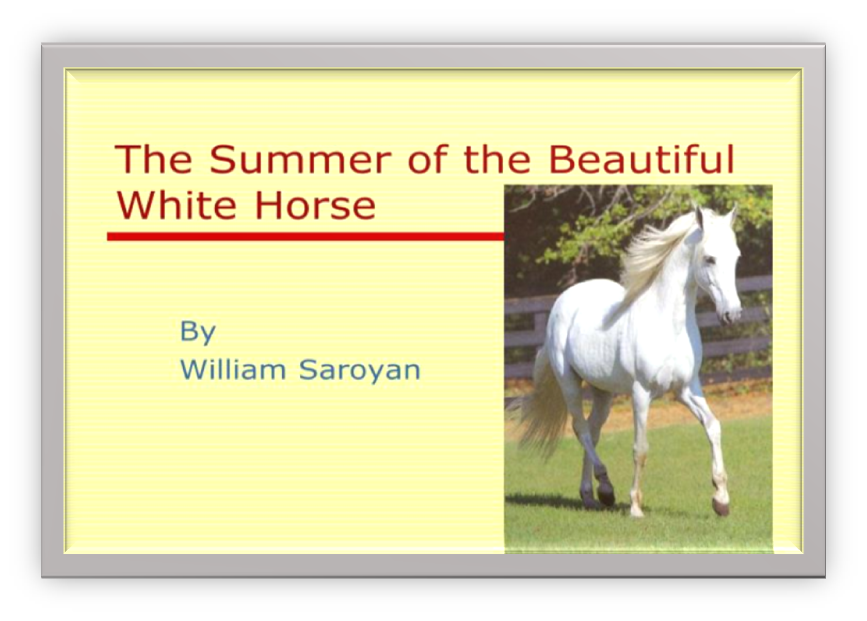
About the Lesson:
Many of William Saroyan’s stories are about his childhood experiences among the Armenian –American fruit growers and deal with their sense of being uprooted. The lesson deals with two Armenian boys who stray away from the values of trust and honesty for which their tribe is famous. The elder one, Mourad steals a horse with a view to enjoying horse riding and the younger ones, the narrator does not want the horse to be returned before he has learned to ride. However, when they are found red-handed by the owner of the horse, they decide to return it to him stealthily lest the fair name of their tribe is blemished. As long as the horse with Mourad, he took very good care of it.Thus the story deals with the theme of adventure and thrill of youth and strong tribe character.
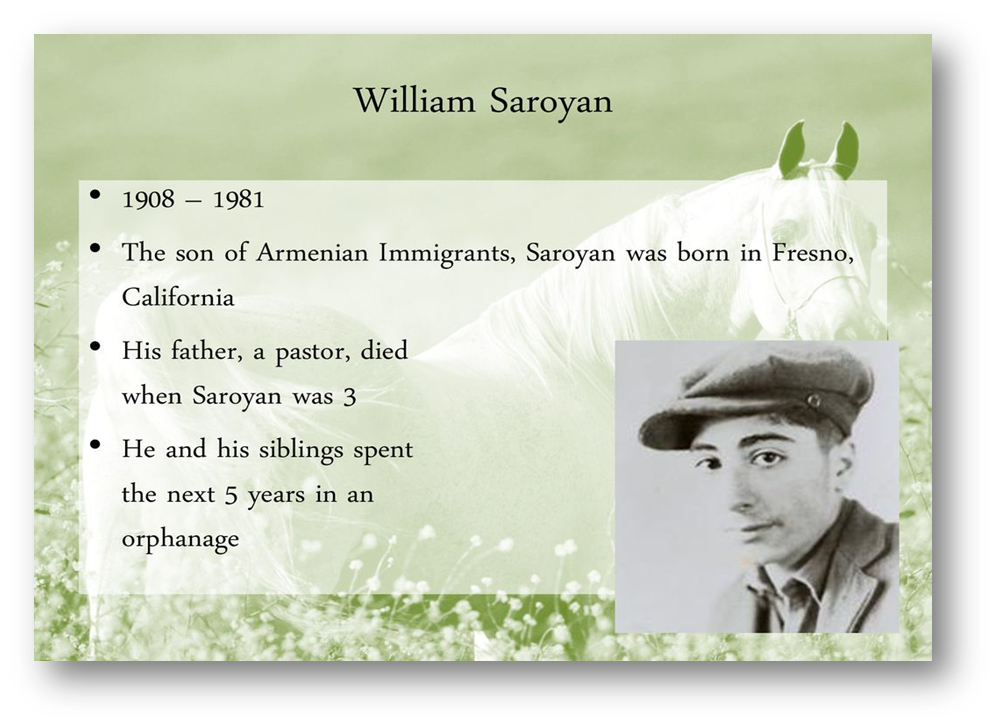
Summary
Aram and Mourad were two poor boys who belonged to the Armenian Garoghlanian family who was known for their honesty since the eleventh century. One early morning when Aram was asleep and was enjoying pleasant dreams, his cousin Mourad showed up to his window with a beautiful white horse. Aram could not believe it and was thinking it was a dream. But since there was a little light outside, he knew for sure that the horse was real. As they were poverty-stricken, he couldn’t believe that the horse was their own. He was trying to figure out if the horse had been stolen by his cousin. Mourad had come to invite him for a ride-along. He asked him to make it quick before everyone in the world woke up. Aram wore his clothes and jumped out of the window and sat behind Mourad on the horse.
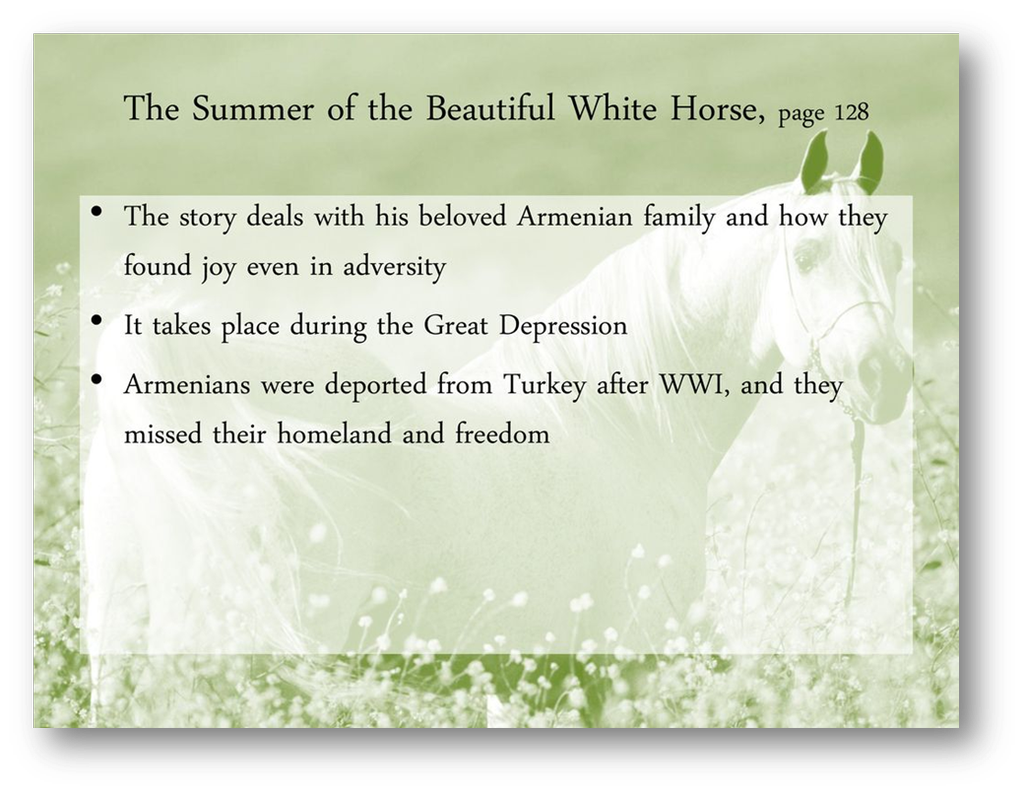
They rode on the old countryside of the area where they lived – Walnut Avenue. After some time, Mourad asked him to get off as he wanted to ride the horse alone. Aram asked him if he could also ride the horse alone just like him to which Mourad said they will see as it was for his own safety. He got to know that Mourad had stolen the horse a month ago and was riding it every morning.
When Aram got his chance of a ride, the horse took him to the vineyard and threw him off and ran away. After searching for thirty minutes, Mourad finally managed to find the horse and they hid him in a deserted vineyard that had some oats and alfalfa. Mourad had away with everything, especially horses. He knew how to handle every type of animal and also humans. Every morning for two weeks, they would take the horse for a ride and then hide it again.One day, John Byro came to Aram’s house to talk to his uncle Khosrove who was an irritated and loud man who shouted at almost everything. Byro told him about his missing horse whom he bought at sixty dollars. For one month, he couldn’t find it and he walked for 10 miles to come to their house. Khosrove roared at him and told him, ‘it’s no harm, pay no attention to it.’ Byro became irritated by his attitude and he went away.
Aram went to Mourad and told him about the missing horse of Byro and asked him not to return the horse until he learns to ride it. Mourad told him that it would take one year for him to learn to ride the horse. He further angrily added that they could not be thieves as their tribe is known for honesty and said that they would return the horse after six months.
One day on their way back to hide the horse to the hidden spot, they met John Byro who was going back to the town. He talked to them and carefully examined the horse. He admitted that the horse looked exactly like the one he had but since he knew his parents and the honesty of their family, he didn’t believe that they had his missing horse. He assumed it was a twin horse. Mourad managed to let Byro assume that it was not his horse so they went away. The next morning, both of them took the horse back to Byro’s vineyard and put it in the barn. The dogs followed them all along quietly and they left the place.The same afternoon, John Byro came back to his house to tell his mother about his horse who had come back. He was happy and was astonished to see the horse’s better temper and it was stronger than ever. Uncle Khosrove again roared, ‘Quiet, man, quiet. Your horse has been returned. Pay no attention to it.
The summer of the Beautiful White Horse- Lesson Explanation
ONE day back there in the good old days when I was nine and the world was full of every imaginable kind of magnificence, and life was still a delightful and mysterious dream, my cousin Mourad, who was considered crazy by everybody who knew him except me, came to my house at four in the morning and woke me up tapping on the window of my room.
Aram, he said. I jumped out of bed and looked out of the window. I couldn’t believe what I saw.
It wasn’t morning yet, but it was summer and with daybreak not many minutes around the corner of the world it was light enough for me to know I wasn’t dreaming.
Word meaning
Magnificence – extremely beautiful
Daybreak – dawn
One day nine-year-old Aram was asleep and was in a world of extremely beautiful imagination. His life was pleasant and kind of, in a mysterious dream. His cousin Mourad showed up on the window of his room at 4 in the morning. He called Aram, who jumped out of his bed and still couldn’t believe what he saw out of the window. It was dawn and there was light enough outside to make him see outside what made him believe he wasn’t dreaming.
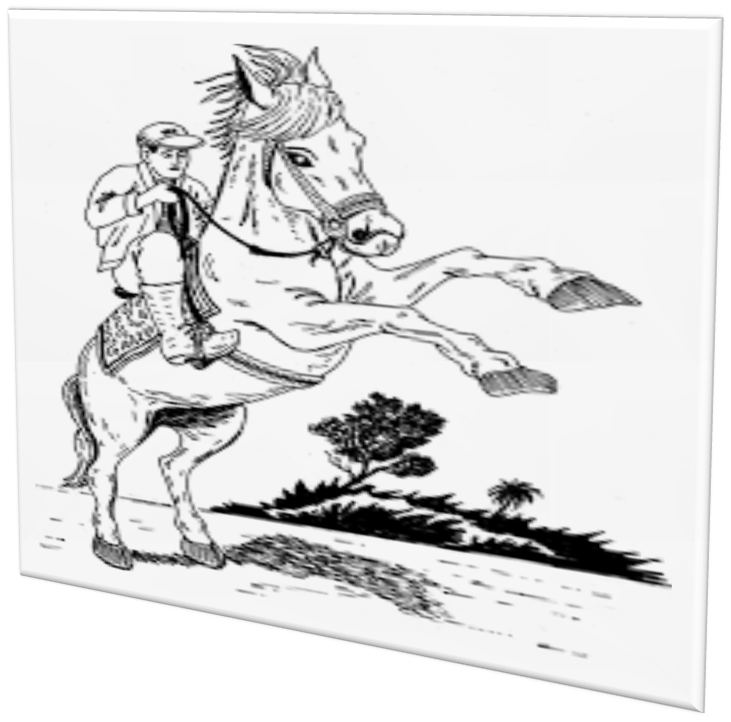
My cousin Mourad was sitting on a beautiful white horse.
I stuck my head out of the window and rubbed my eyes.
Yes, he said in Armenian. It’s a horse. You’re not dreaming.
Make it quick if you want to ride.

I knew my cousin Mourad enjoyed being alive more than anybody else who had ever fallen into the world by mistake, but this was more than even I could believe.
In the first place, my earliest memories had been memories of horses and my first longings had been longings to ride. This was the wonderful part.
Word meaning
Armenian – official language of Armenia branch
Longings – an aching desire
Mourad was sitting on a white horse. Aram rubbed his eyes and stuck out his head out of the window. Mourad assured him it was not a dream. He asked if he wanted a ride, he must make it quick. Mourad was the type of person who enjoyed being alive but he couldn’t believe that he was seeing a horse in front of him. Aram’s earliest memory was of horses and he always wanted to ride one. This was the wonderful part that he was actually going to ride a horse for real.
In the second place, we were poor.
This was the part that wouldn’t permit me to believe what I saw.
We were poor. We had no money. Our whole tribe was poverty stricken. Every branch of the Garoghlanian1 family was living in the most amazing and comical poverty in the world. Nobody could understand where we ever got money enough to keep us with food in our bellies, not even the old men of the family. Most important of all, though, we were famous for our honesty. We had been famous for our honesty for something like eleven centuries, even when we had been the wealthiest family in what we liked to think was the world. We were proud first, honest next, and after that, we believed in right and wrong. None of us would take advantage of anybody in the world, let alone steal.
Word meaning
Comical – funny
Garoghlanian – an Armenian tribe
Aram’s family was poor and had no money so it was difficult for him to believe in what he saw outside his house. He belonged to the Garoghlanian family that was strictly and funnily in poverty. They didn’t even know how they managed to get food for themselves every day. Although his tribe was poor, they were known for their honesty for eleven centuries.They were honest, proud and always believed in right and wrong. No one from their family would ever steal anything or would take advantage of anyone in the world.
Consequently, even though I could see the horse, so magnificent; even though I could smell it, so lovely; even though I could hear it breathing, so exciting; I couldn’t believe the horse had anything to do with my cousin Mourad or with me or with any of the other members of our family, asleep or awake, because I knew my cousin Mourad couldn’t have bought the horse, and if he couldn’t have bought it he must have stolen it, and I refused to believe he had stolen it.
No member of the Garoghlanian family could be a thief.
I stared first at my cousin and then at the horse. There was a pious stillness and humor in each of them which on the one hand delighted me and on the other frightened me.
Word meaning
Consequently – as a result
Pious – religious
Aram was so excited that he was seeing a horse that was so pleasant and beautiful. He could smell it and hear it breathing and still couldn’t believe that Mourad or anyone in the family could afford a horse. He was thinking if Mourad had stolen the horse but he didn’t believe it as he thought no one in his family could be a thief. He stared at his cousin and then at the horse. There was religious motionlessness and wittiness in both Mourad and the horse as one charmed him and the other scared him.
Mourad, I said, where did you steal this horse?
Leap out of the window, he said, if you want to ride.
It was true, then. He had stolen the horse. There was no question about it. He had come to invite me to ride or not, as I chose.
Well, it seemed to me stealing a horse for a ride was not the same thing as stealing something else, such as money.
For all I knew, maybe it wasn’t stealing at all. If you were crazy about horses the way my cousin Mourad and I were, it wasn’t stealing.
It wouldn’t become stealing until we offered to sell the horse, which of course, I knew we would never do.
Let me put on some clothes, I said. All right, he said, but hurry.
I leaped into my clothes. I jumped down to the yard from the window and leaped up onto the horse behind my cousin Mourad.
Word meaning
Leap out – jump out from a place
He asked Mourad if he had stolen the horse. Mourad replied if he wants a ride he must jump out of the window. Aram was convinced that the horse was stolen by Mourad. He came to visit him to ask him to ride it with him. Aram tried to convince himself that it was not the same as stealing money as they both were so crazy about riding a horse. He thought that it would not be called stealing until they decide to sell it which they would never do. Aram said he will wear some clothes and come outside. He jumped down to his yard from his room’s window and sat on the horse behind his cousin.
That year we lived at the edge of town, on Walnut Avenue.
Behind our house was the country: vineyards, orchards, irrigation ditches, and country roads. In less than three minutes we were on Olive Avenue, and then the horse began to trot. The air was new and lovely to breathe. The feel of the horse running was wonderful. My cousin Mourad who was considered one of the craziest members of our family began to sing. I mean, he began to roar.
Every family has a crazy streak in it somewhere, and my cousin Mourad was considered the natural descendant of the crazy streak in our tribe. Before him was our uncle Khosrove, an enormous man with a powerful head of black hair and the largest moustache in the San Joaquin Valley2, a man so furious in temper, so irritable, so impatient that he stopped anyone from talking by roaring, It is no harm; pay no attention to it.
Word meaning
Vineyard – plantation of grapevines used in winemaking
Orchards – a piece of land of the plantation of fruits
Irrigation ditches – manmade channel used to deliver water to homes, industries and other uses
Trot – proceed with something
Descendant – a system that develops from an earlier simple version
Streak – race
Enormous – huge
San Joaquin Valley – one of the long interior valleys of California
Aram lived at the edge of the town on Walnut Avenue. There were orchards, vineyards, irrigation ditches and country roads behind his house. They were on Olive Avenue within three minutes and the horse started to proceed. The air felt new and lovely to breathe. Aram felt wonderful sitting on the horse which was running. Mourad started singing loudly who was considered one of the craziest members of the family. There is one crazy person in every family and Mourad was the one natural descendant of a crazy race in their tribe. Before Mourad was Uncle Khosrove was the one huge man with black hair and the largest mustache in the valley. He had an energetic temper and was impatient which was irritating. He used to make anyone stop talking by roaring and saying ‘it is no harm, pay no attention to it.’
That was all, no matter what anybody happened to be talking about. Once it was his own son Arak running eight blocks to the barber’s shop where his father was having his mustache trimmed to tell him their house was on fire. This man Khosrove sat up in the chair and roared, It is no harm; pay no attention to it. The barber said, but the boy says your house is on fire. So Khosrove roared, enough, it is no harm, I say.
My cousin Mourad was considered the natural descendant of this man, although Mourad’s father was Zorab, who was practical and nothing else. That’s how it was in our tribe. A man could be the father of his son’s flesh, but that did not mean that he was also the father of his spirit. The distribution of the various kinds of the spirit of our tribe had been from the beginning capricious and vagrant.
We rode and my cousin Mourad sang. For all, anybody knew we were still in the old country where, at least according to some of our neighbors, we belonged. We let the horse run as long as it felt like running.
Word meaning
Capricious – inconsistent change of mood
Vagrant – a person without a settled home or work
Uncle Khosrove was always this rigid no matter who happened to be talking about in front of him. Once his own son, Arav, came running to him when he was getting his mustache trimmed at the barber’s shop. He told him the house was on fire to which he roared and said the same dialogue. Barber was amused and tried to talk to him about it but as usual, Khosrove roared again and did not pay attention to it. Mourad was considered to be a natural descendant of this man but he was not his son. His father was Zorab who was a practical person. A child could look like his father but that doesn’t mean he gets his nature and attitude just the same. There are different kinds of people in their tribes – moody and without any settled work or home. They were still riding the horse and Mourad was still singing loudly. They were still in the countryside where according to their neighbours, they belonged to.
At last my cousin Mourad said, Get down. I want to ride alone.
Will you let me ride alone? I asked.
That is up to the horse, my cousin said. Get down.
The horse will let me ride, I said.
We shall see, he said. Don’t forget that I have a way with a horse.
Well, I said, any way you have with a horse, I have also.
For the sake of your safety, he said, let us hope so. Get down.
All right, I said, but remember you’ve got to let me try to ride alone.
I got down and my cousin Mourad kicked his heels into the horse and shouted, Vazire, run. The horse stood on its hind legs, snorted, and burst into a fury of speed that was the loveliest thing I had ever seen. My cousin Mourad raced the horse across a field of dry grass to an irrigation ditch, crossed the ditch on the horse, and five minutes later returned, dripping wet.
Word meaning
Vazire – a name
Fury – anger
Mourad asked him to get down as he wanted to ride alone. Aram asked if he could ride the horse alone. He said it is up to the horse if he wants to ride you along and asked him to get Mourad down again. Aram tried to convince him that the horse would let him ride to which Mourad said that we shall see and told Aram that he had a way with a horse. Aram told him that he had it too. Mourad told him to get down and said it is for his own safety, let us hope so. Aram got down while telling him that he will ride the horse alone. Mourad kicked his heels in the horse and shouted run to him. The horse stood on its hind legs, breathed out and ran into a speed. Mourad raced the horse across a field of dry grass and irrigation ditches. When they arrived five minutes later, they were wet.
The sun was coming up.
Now it’s my turn to ride, I said.
My cousin Mourad got off the horse. Ride, he said.
I leaped to the back of the horse and for a moment knew the most awful fear imaginable. The horse did not move.
Kick into his muscles, my cousin Mourad said. What are you waiting for? We’ve got to take him back before everybody in the world is up and about.
I kicked into the muscles of the horse. Once again it reared and snorted. Then it began to run. I didn’t know what to do.
Instead of running across the field to the irrigation ditch, the horse ran down the road to the vineyard of Dikran Halabian where it began to leap over vines. The horse leaped over seven vines before I fell. Then it continued running.
My cousin Mourad came running down the road.
I’m not worried about you, he shouted. We’ve got to get that horse. You go this way and I’ll go this way. If you come upon him, be kindly. I’ll be near.
Word meaning
Reared – raised
Snorted – breathed out
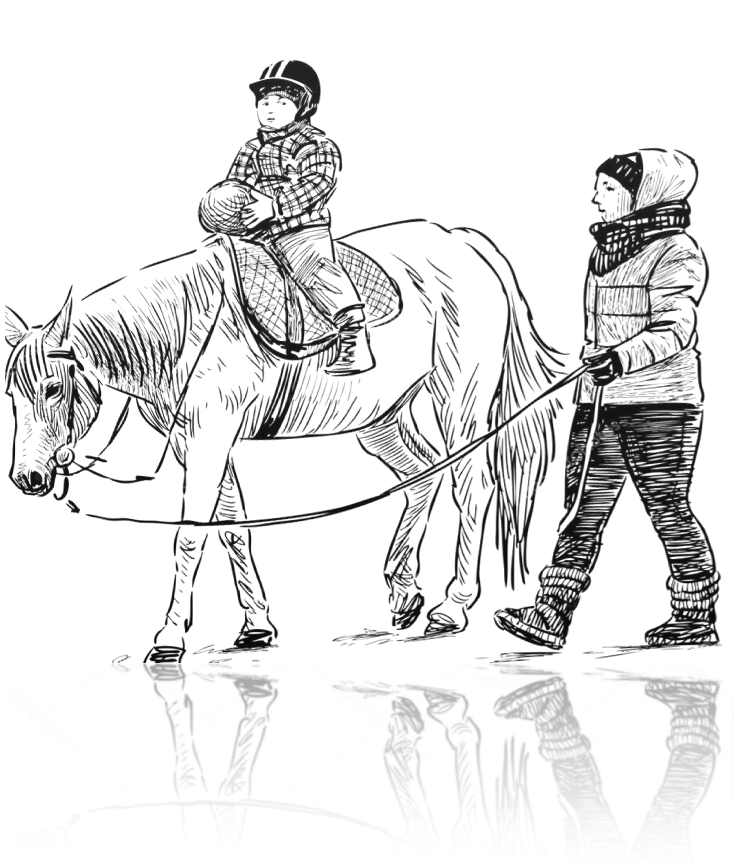
The sun was almost up and Aram told him it was his turn to ride. Mourad got off and Aram sat on the horse. He was fearful and the horse did not move. Mourad tried to guide him by saying that he should try to kick into his muscles and told him that he should hurry because they need to take him back before everyone woke up. Aram kicked into the muscles of the horse to which the horse again raised and breathed out. The horse began to run and Aram didn’t know what to do next. The horse started going towards the road that leads to the vineyard of Dikran Halabian. It began to move over vines and Aram fell down. The horse continued to run and Mourad came running down the road towards him. Mourad told him that he is not worried about him but they need to find the horse. They both went different ways to find him. He instructed Aram to be kind if he saw him anywhere.
I continued down the road and my cousin, Mourad went across the field toward the irrigation ditch.
It took him half an hour to find the horse and bring him back.
All right, he said, jump on. The whole world is awake now.
What will we do? I said.
Well, he said, we’ll either take him back or hide him until tomorrow morning.
He didn’t sound worried and I knew he’d hide him and not take him back. Not for a while, at any rate.
Where will we hide him? I said.
I know a place, he said.
How long ago did you steal this horse? I said.
It suddenly dawned on me that he had been taking these early morning rides for some time and had come for me this morning only because he knew how much I longed to ride.
Word meaning
Dawned – appeared
Aram looked for the horse down the road and Mourad went towards the irrigation ditch. He came back after thirty minutes with the horse. He told him to jump over as the whole world was awake by then. Aram asked what would they do now to which Mourad told him about two options – take him back or hide him until tomorrow. Mourad was not worried and Aram knew that Mourad would hide him somewhere and not take him back for a while. Aram asked him where Mourad would hide him, Mourad told him about a place he knew which would be perfect as a hidden spot. Aram eagerly asked him when he stole the horse. It appeared to him that Mourad had been taking the horse for morning rides for quite some time and he showed up this morning to ask Aram to ride along because he knew he was longing to ride one.
Who said anything about stealing a horse? He said.
Anyhow, I said, how long ago did you begin riding every morning?
Not until this morning, he said.
Are you telling the truth? I said.
Of course not, he said, but if we are found out, that’s what you’re to say. I don’t want both of us to be liars. All you know is that we started riding this morning.
All right, I said.
He walked the horse quietly to the barn of a deserted vineyard which at one time had been the pride of a farmer named Fetvajian. There were some oats and dry alfalfa in the barn.
We began walking home.
It wasn’t easy, he said, to get the horse to behave so nicely.
At first it wanted to run wild, but, as I’ve told you, I have a way with a horse. I can get it to want to do anything I want it to do.
Horses understand me.
Word meaning
Alfalfa – a flowering plant
Mourad shuts him down by asking a counter-question about who talks about stealing a horse. Aram tried to change the question by asking him how long was he riding the horse every morning. Mourad told him that morning was the first time. Aram was not convinced and asked him if he was telling the truth. Mourad said, if anyone asked Aram, he should say that it was true. He further added that he didn’t want them to be liars but they had to say only this. Aram agreed and Mourad walked the horse quietly towards the barn of a deserted vineyard. It belonged to a farmer named Fetvajian. The barn had some oats and alfalfa. They started walking home. Mourad told Aram that it was not easy to get the horse to behave nicely as it wanted to run wild at first. He told him again that he had a way with a horse and he could get them to do whatever he wants to. Horses understood him.
How do you do it? I said. I have an understanding with a horse, he said.
Yes, but what sort of an understanding? I said. A simple and honest one, he said.
Well, I said, I wish I knew how to reach an understanding like that with a horse.
You’re still a small boy, he said. When you get to be thirteen you’ll know how to do it.
I went home and ate a hearty breakfast.
That afternoon my uncle Khosrove came to our house for coffee and cigarettes. He sat in the parlour, sipping and smoking and remembering the old country. Then another visitor arrived, a farmer named John Byro, an Assyrian who, out of loneliness, had learned to speak Armenian. My mother brought the lonely visitor coffee and tobacco and he rolled a cigarette and sipped and smoked, and then, at last, sighing sadly, he said, my white horse which was stolen last month is still gone — I cannot understand it.
My uncle Khosrove became very irritated and shouted, it’s no harm. What is the loss of a horse? Haven’t we all lost the homeland? What is this crying over a horse?
Word meaning
Parlour – a sitting space in a house
Aram amusingly asked him how he controlled the horse to which Mourad said he has an understanding with the horse. Aram asked him what sort of understanding he had with him to which Mourad told him – a simple and honest one. Aram confessed he would also like to know how to have an understanding with a horse. Mourad assured Aram by saying that he is still a small boy, he will learn when he will be thirteen. Aram went home and ate breakfast. That day, his uncle Khosrove visited his house for coffee and cigarettes. He sat in the parlour and was remembering the old country when a person came to visit him. He was John Byro, a farmer, who learned to speak Armenian because of loneliness. His mother bought Byro some coffee and tobacco. He sipped and smoked and told them about his missing white horse who was stolen last month and he is not able to find it. Khosrove roared again that it’s no harm and shouted that why he was crying over a lost horse when they had lost their homeland.
That may be all right for you, a city dweller, to say, John
Byro said, but what of my surrey? What good is a surrey without a horse?
Pay no attention to it, my uncle Khosrove roared.
I walked ten miles to get here, John Byro said.
You have legs, my uncle Khosrove shouted.
My left leg pains me, the farmer said.
Pay no attention to it, my uncle Khosrove roared.
That horse cost me sixty dollars, the farmer said.
I spit on money, my uncle Khosrove said.
He got up and stalked out of the house, slamming the screen door.
My mother explained.
He has a gentle heart, she said. It is simply that he is homesick and such a large man.
The farmer went away and I ran over to my cousin Mourad’s house.
He was sitting under a peach tree, trying to repair the hurt wing of a young robin that could not fly. He was talking to the bird.
What is it? he said.
The farmer, John Byro, I said. He visited our house. He wants his horse. You’ve had it a month. I want you to promise not to take it back until I learn to ride.
Word meaning
City Dweller – a person who lives in a city
Surrey – a country in South-East England
John replied to Khosrove that he would not bother as he lives in a city but his country was of no good without his horse. Khosrove shouted that he must not pay any attention to it. John told him that he walked down ten miles to come here. Khosrove shouted that he has legs to which John said his left leg hurt. Khosrove again tried to shut him down by saying that he should not pay any attention to it. John shared that the horse cost him sixty dollars. Khosrove said he would spit on the money after which John got up and went away slamming the door. Aram’s mother told him that John had a gentle heart as he was homesick and he was such a large man. Aram went to Mourad, he was sitting under a peach tree talking to a robin bird. He was repairing the wing that was hurt. Aram told him about John Byro and how he visited their house and he wanted his horse. Aram asked him not to return the horse until he learns to ride it.
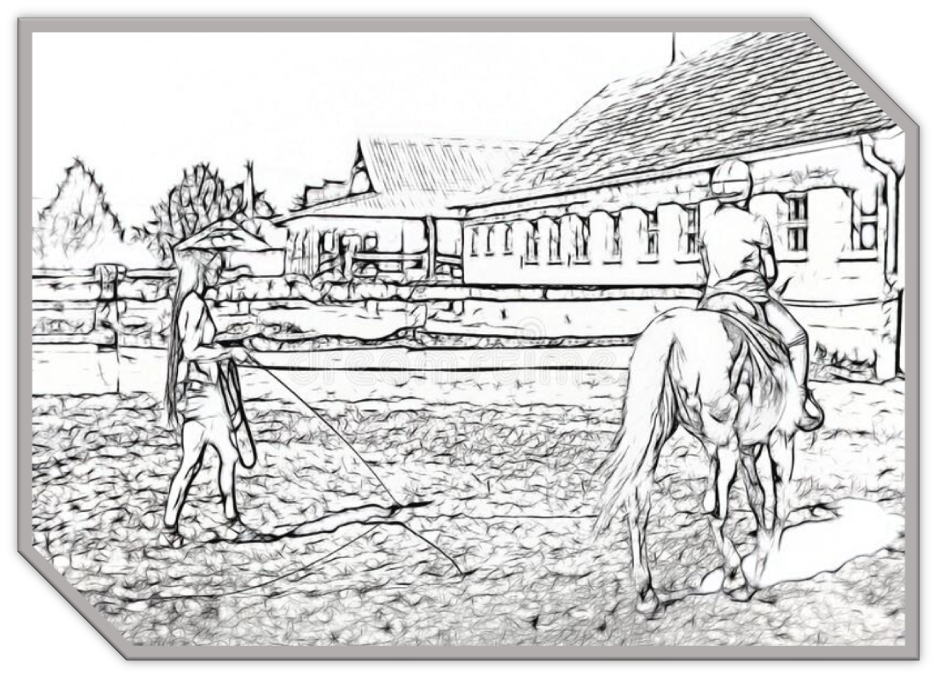
It will take you a year to learn to ride, my cousin Mourad said.
We could keep the horse a year, I said.
My cousin Mourad leaped to his feet.
What? He roared. Are you inviting a member of the Garoghlanian family to steal? The horse must go back to its true owner.
When? I said.
In six months at the latest, he said.
He threw the bird into the air. The bird tried hard, almost fell twice, but at last flew away, high and straight.
Early every morning for two weeks my cousin Mourad and I took the horse out of the barn of the deserted vineyard where we were hiding it and rode it, and every morning the horse, when it was my turn to ride alone, leaped over grapevines and small trees and threw me and ran away. Nevertheless, I hoped in time to learn to ride the way my cousin Mourad rode.
One morning on the way to Fetvajian’s deserted vineyard we ran into the farmer John Byro who was on his way to town.
Let me do the talking, my cousin Mourad said. I have a way with farmers.
Mourad told Aram that it will take him a whole year to learn to ride a horse. Aram said they could keep him for a year then. Mourad stood up on his feet and shouted at him about encouraging him to be a thief in spite of being a member of the Garoghlanian family. He declared that the horse should go to his true owner. Aram asked when they would have to return the horse to which Mourad said in six months. He threw the bird into the air, it almost fell twice but flew at last. For the next two weeks, they both would take the horse out of the barn and ride it. But every morning the horse would throw Aram and run away whenever he tried to ride it. He still hoped he would learn to ride it the way his cousin did. Once on the way to the deserted vineyard to hide the horse again, they met John Byro who was on his way to town. Mourad insisted on talking to him as he had a way with farmers.
Good morning, John Byro, my cousin Mourad said to the farmer.
The farmer studied the horse eagerly.
Good morning, son of my friends, he said. What is the name of your horse?
My Heart, my cousin Mourad said in Armenian.
A lovely name, John Byro said, for a lovely horse. I could swear it is the horse that was stolen from me many weeks ago.
May I look into his mouth?
Of course, Mourad said.
The farmer looked into the mouth of the horse.
Tooth for tooth, he said. I would swear it is my horse if I didn’t know your parents. The fame of your family for honesty is well known to me. Yet the horse is the twin of my horse. A suspicious man would believe his eyes instead of his heart. Good day, my young friends.
Mourad wished him Good Morning and Byro saw the horse carefully. Byro wished them back and asked the name of the horse. Mourad said ‘My Heart’ in the Armenian language. Byro complimented that it was a lovely name for a lovely horse. He swore that it was his horse that was stolen weeks ago. He asked if he could look into his mouth. After looking from tooth to tooth, it said it was his horse if he didn’t know his parents. He said the horse was a twin of his horse. He further said that his family is all for honesty but the horse looks just like the one he lost. A man who is suspicious would easily believe his eyes and not his heart. He wished them and went away.
Good day, John Byro, my cousin Mourad said.
Early the following morning we took the horse to John Byro’s vineyard and put it in the barn. The dogs followed us around without making a sound.
The dogs, I whispered to my cousin Mourad. I thought they would bark.
They would at somebody else, he said. I have a way with dogs.
My cousin Mourad put his arms around the horse, pressed his nose into the horse’s nose, patted it, and then we went away.
That afternoon John Byro came to our house in his surrey and showed my mother the horse that had been stolen and returned.
I do not know what to think, he said. The horse is stronger than ever. Better-tempered, too. I thank God. My uncle Khosrove, who was in the parlour, became irritated and shouted, Quiet, man, quiet. Your horse has been returned. Pay no attention to it.
Mourad wished him back. The next morning, they took the horse back to John Byro’s vineyard and put it in his barn. The dogs followed them around without making any sound. Mourad replied they would not bark at them since he had a way with dogs. Mourad put his arms around the horse, then pressed his nose into the horse’s nose. He patted him and then they went away. That same afternoon, John came to Aram’s house in his surrey and showed his mother his horse that returned. He said he didn’t know what to think as the horse is much stronger now with a better temper. He thanked god. Uncle Khosrove who was in the Parlour again shouted irritated, ‘Quiet, man, quiet. Your horse has been returned. Pay no attention to it.’
Story Explanation
- Books Name
- (English) Hornbill & Snapshot Class-11
- Publication
- PathSet Publications
- Course
- CBSE Class 11
- Subject
- English
The Address
By Marga Minco

Introduction

The Address is about the human plight that follows pre-war and post-war times where Mrs.S was a Jews and was affluent whereas Mrs. Dorling was non-jews. The daughter of S had lost her house and now she decided to come back and take her possessions from Mrs. Dorling who has been living at her, mother’s address.
At her mother’s house Mrs. Dorling welcomed her in a cold way and didn’t let her in but Dorling’s daughter let her in. and as soon she goes inside and saw all the possessions, she couldn’t connect with them and left the house immediately.

Summary

The Narrator of the story is the daughter of Mrs. S who went to her native place in times of war and after that, she returns to collect her belongings after her death. She rang the doorbell of Mrs. Dorling and felt bad when she welcomed her in a cold response. She was an old acquaintance of hers and even wearing her green cardigan. She didn’t want to talk to her. The narrator left the place and remembers something thing about the past. When her mother was alive she only gave her this address and when she went home for a few days she learns that her few things were missing. Mother only told her about Mrs.Dorling that she had taken all these kinds of stuff and promised her to keep them safely and neatly. Every time she takes some or the other thing with her. The girl visited her the second time and this time, a girl about 15 opened the door to her. The daughter asked about her mother whether she is at home or not.
She followed her and the first thing that struck her was an old candlestand next to the mirror. When she went to the living room, she was surrounded by the stuff she wanted to take a glimpse of. She found herself in a room where all the stuff was arranged in a haphazard manner which she did not like. She didn’t have the strength to look around and sat down and kept staring at the woolen table cover. She remembered that burn mark on the cover that could never be repaired and soon she found the hole. Dorling’s daughter was very nice by nature and poured tea from a white pot that had a golden border on the lid and took out some spoons. The daughter praised the box and the spoons and to her surprise, Dorling told her that it is an antique piece. Mrs. Dorling then told her that they had many such things and the daughter knew w all this about. Then she moved towards the side drawer to open it. The narrator felt emotional while linking the objects with her mother’s memories. Initially, she was eager to and long to see and feel those things as they had an attachment with them. Through these, she can connect with her mother. But now she lost interest in the valuables and it seems useless to her as she lives in a small rented room where these will not be fitted but kept somewhere else. She tried hard to forget that address and dong so she wanted to forget and leave those memories and decided to move on.

‘DO you still know me?’ I asked.
The woman looked at me searchingly. She had opened the door a chink. I came closer and stood on the step.
‘No, I don’t know you.’
‘I’m Mrs. S’s daughter.’
She held her hand on the door as though she wanted to prevent it from opening any further. Her face gave absolutely no sign of recognition. She kept staring at me in silence.
Perhaps I was mistaken, I thought, perhaps it isn’t her. I had seen her only once, fleetingly, and that was years ago. It was most probable that I had rung the wrong bell. The woman let go of the door and stepped to the side. She was wearing my mother’s green knitted cardigan. The wooden buttons were rather pale from washing. She saw that I was looking at the cardigan and half hid again behind the door. But I knew now that I was right.
Word meaning
Chink – Narrow opening
Fleetingly – For a short time
The Address Lesson Explanation
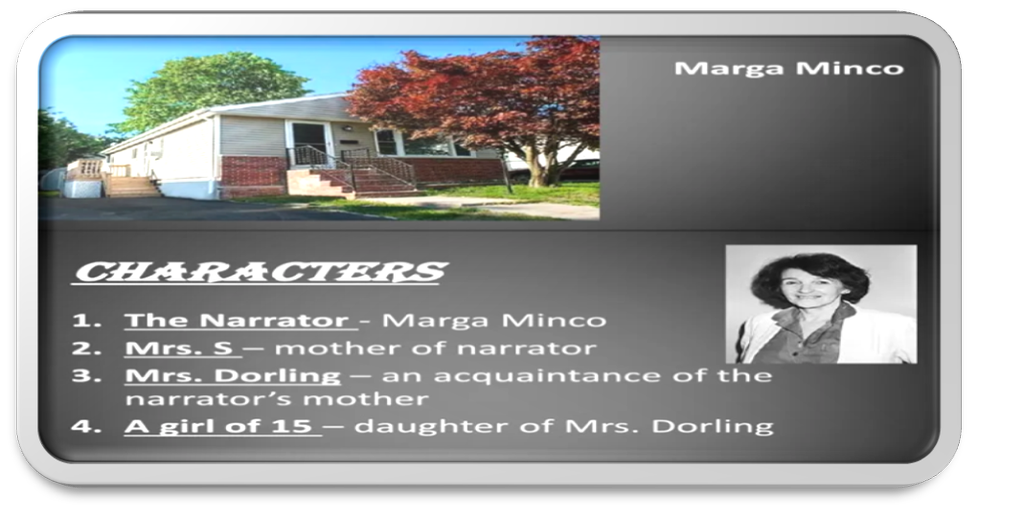
The protagonist asked the woman standing at the door if she still knew her. The lady had opened the door a little, the protagonist came closer to the door and stood there. The woman responded negatively and the protagonist still gave her introduction. She said she was Mrs. S’s daughter. The woman had held the door tightly as she didn’t want her to enter the house. She kept staring at the protagonist though she couldn’t recognize her. The protagonist thought maybe she had come to the wrong house. She had seen the woman only for a short time years ago. The woman who answered the door stepped aside and let go of the door. The protagonist recognized her mother’s green knitted cardigan that the woman was wearing. The wooden buttons had become pale because of the washing. The woman noticed the protagonist looking at the cardigan. She hid behind the door.
Well, you knew my mother?’ I asked.
‘Have you come back?’ said the woman. ‘I thought that no one had come back.’
‘Only me.’
A door opened and closed in the passage behind her. A musty smell emerged.
‘I regret I cannot do anything for you.’
‘I’ve come here, especially on the train. I wanted to talk to you for a moment.’
‘It is not convenient for me now,’ said the woman. ‘I can’t see you. Another time.’
She nodded and cautiously closed the door as though no one inside the house should be disturbed.
I stood where I was on the step. The curtain in front of the bay window moved. Someone stared at me and would then have asked what I wanted. ‘Oh, nothing,’ the woman would have said. ‘It was nothing.’
Word meaning
Musty – stale
The protagonist asked the woman about her mother. The woman asked her if she had come back, she replied only to her and no one else came with her. The woman opened the door and a passage was behind her. A stale smell occurred all over. The woman told her that she could not do anything for her. The protagonist told her that she had come from afar place on the train just to talk to her. The woman told her it is not convenient to talk right now and asked her to come back later. The woman closed the door as she didn’t want anyone to get disturbed in the house. The protagonist was still standing on the step. She saw a curtain moving on the window bay. Someone was staring at her from inside the house. She thought it was nothing as the woman would have told her.
I looked at the nameplate again. Dorling it said, in black letters on white enamel. And on the jamb, a bit higher, the number. Number 46.
As I walked slowly back to the station I thought about my mother, who had given me the address years ago. It had been in the first half of the War. I was home for a few days and it struck me immediately that something or other about the rooms had changed. I missed various things. My mother was surprised I should have noticed so quickly. Then she told me about Mrs. Dorling. I had never heard of her but apparently, she was an old acquaintance of my mother, whom she hadn’t seen for years. She had suddenly turned up and renewed their contact. Since then she had come regularly.
Word meaning
Enamel – an opaque or semi-transparent substance that is a type of glass
Jamb – side post of a window, fireplace, or doorway
Acquaintance – stranger or social contact
The protagonist looked at the number plate again, it said Number 46. Dorling was written on the plate on white enamel. As she was going back to the station, she was thinking about her mother who gave her the address. It was the first half of the war. She was home for a few days and suddenly, it struck her that the room was different now. Various things were missing. Her mother was surprised that she noticed the changes a little later. It was that time when she told her about this woman, Mrs. Dorling. She was an old contact of hers whom she hadn’t seen for years. Suddenly, she came to visit her and since then they had been in regular contact.
‘Every time she leaves here she takes something home with her,’ said my mother. ‘She took all the table silver in one go. And then the antique plates that hung there. She had trouble lugging those large vases, and I’m worried she got a crick in her back from the crockery.’ My mother shook her head pityingly. ‘I would never have dared ask her. She suggested it to me herself. She even insisted. She wanted to save all my nice things. If we have to leave here we shall lose everything, she says.’
‘Have you agreed with her that she should keep everything?’ I asked.
‘As if that’s necessary,’ my mother cried. ‘It would simply be an insult to talk like that. And think about the risk she’s running, each time she goes out of our door with a full suitcase or bag.’
Word meaning
Lugging – carry a heavy object with great effort
Pityingly – feeling sorrow
Crick – cramp or spasm in muscles
Her mother told her that whenever that woman came to visit her, she took something from the house with her. Table silvers, antique plates and she had trouble over carrying the large vase. She told her that the cramp in her back came from the crockery. Her mother shook her head in sorrow. The woman kept telling the protagonist’s mother that she wanted to save her precious things. If they had to leave the place someday, they would lose everything. She asked her mother if she really wanted her to take all the things with her. Her mother replied that even if she didn’t, it would be an insult to ask her not to. She was going out with a risk herself, a suitcase full of items.

My mother seemed to notice that I was not entirely convinced. She looked at me reprovingly and after that, we spoke no more about it.
Meanwhile, I had arrived at the station without having paid much attention to things on the way. I was walking in familiar places again for the first time since the War, but I did not want to go further than was necessary. I didn’t want to upset myself with the sight of streets and houses full of memories from a precious time.
On the train back I saw Mrs. Dorling in front of me again as I had the first time I met her. It was the morning after the day my mother had told me about her. I had got up late and, coming downstairs, I saw my mother about to see someone out. A woman with a broad back.
‘There is my daughter,’ said my mother. She beckoned to me.
The woman nodded and picked up the suitcase under the coat rack. She wore a brown coat and a shapeless hat.
‘Does she live far away?’ I asked, seeing the difficulty she had going out of the house with the heavy case.
‘In Marconi Street,’ said my mother. ‘Number 46. Remember that.’
Word meaning
Reprovingly – critically
Beckoned – signaled
Her mother noticed that she wasn’t convinced and looked at her critically. After that day, they never talked about the incident again. She reached the station without noticing any details on the way. She passed the familiar things after the war for the first time. She didn’t want to upset herself with the familiar sights of houses and streets that reminded her of all the precious times. Back in the time, she saw Mrs. Dorling in person a day after her mother told her daughter about her. She woke up late that morning and as she was going downstairs, she saw her ‘the lady with broad back’. Her mother was seeing her out. Her mother introduced the protagonist to the lady. She signaled to her and the women responded with a nod. She picked the suitcase under the coat rack. She was wearing a brown coat and a shapeless hat. The protagonist asked her mother if she lived far away. The mother told her the address, ’Marconi Street, Number 46’. She remembered it.
I had remembered it. But I had waited a long time to go there. Initially, after the Liberation, I was absolutely not interested in all that stored stuff, and naturally, I was also rather afraid of it. Afraid of being confronted with things that had belonged to a connection that no longer existed; which were hidden away in cupboards and boxes and waiting in vain until they were put back in their place again; which had endured all those years because they were ‘things.’
But gradually everything became more normal again. The bread was getting to be a lighter colour, there was a bed you could sleep in unthreatened, a room with a view you were more used to glancing at each day. And one day I noticed I was curious about all the possessions that must still be at that address. I wanted to see them, touch, remember.
After my first visit in vain to Mrs. Dorling’s house, I decided to try a second time. Now a girl of about fifteen opened the door to me. I asked her if her mother was at home.
‘No’ she said, ‘my mother’s doing an errand.’
‘No matter,’ I said, ‘I’ll wait for her.’
Word meaning
Liberation – Liberty or Freeing
Endured – suffered
Vain – hopeless
She remembered the address but she took too long to visit the place. After the freedom, she was on one hand, not interested and on the other, was afraid. She was afraid of getting confronted with the past memories and connections that no longer existed. Connections were hidden in cupboards and boxes. It seemed that those memories were waiting in vain to put them back to their places as they had suffered all these years because they were only things. Things were getting normal in the Protagonist’s life, but one day, she got curious about all the things that were still at that address. She wanted to see them and touch them. After the first hopeless visit, she decided to try one more time. When she reached Mrs. Morling’s home, a girl of fifteen years opened the door. Protagonist asked her about her mother. She told her that she was outside doing some errands to which the protagonist decided that she would wait for her.
I followed the girl along the passage. An old-fashioned iron Hanukkah1 candle holder hung next to a mirror. We never used it because it was much more cumbersome than a single candlestick.
‘Won’t you sit down?’ asked the girl. She held open the door of the living room and I went inside past her. I stopped, horrified. I was in a room I knew and did not know. I found myself in the midst of things I did want to see again but which oppressed me in the strange atmosphere. Or because of the tasteless way everything was arranged, because of the ugly furniture or the muggy smell that hung there, I don’t know; but I scarcely dared to look around me. The girl moved a chair. I sat down and stared at the woolen tablecloth. I rubbed it. My fingers grew warm from rubbing. I followed the lines of the pattern. Somewhere on the edge, there should be a burn mark that had never been repaired.
‘My mother'll be back soon,’ said the girl. ‘I’ve already made tea for her. Will you have a cup?’
‘Thank you.’
Word meaning
Hanukkah – The Feast of Lights, a Hebrew festival in December
Cumbersome – unmanageable
Midst – middle
Muggy – humid
The protagonist followed the girl along the passage. There was a Hanukkah candle holder hung next to a mirror. She remembered that she never used it as it was unmanageable. The girl asked her to sit down as she opened the door to the living room. She stopped and she was disturbed. She was standing in a room which she knew and she didn’t. She was standing in the middle of things that she didn’t want to see and they burdened her. Maybe because of the way things were arranged, the humid smell in the room, or the ugly furniture, she was scared to look at everything. She sat down on a chair which the girl pulled out for her. She looked at the woolen table cloth. She rubbed it and her fingers felt warm. As she followed the lines of the pattern, she remembered a burn mark that was never repaired. The girl told her that her mother would be back soon and asked if she would like to have a cup of tea. She answered thank you.
I looked up. The girl put cups ready on the tea table. She had a broad back. Just like her mother. She poured tea from a white pot. All it had was a gold border on the lid, I remembered. She opened a box and took some spoons out.
‘That’s a nice box.’ I heard my own voice. It was a strange voice. As though each sound was different in this room.
‘Oh, you know about them?’ She had turned around and brought me my tea. She laughed. ‘My mother says it is antique. We’ve got lots more.’ She pointed around the room. ‘See for yourself.’
I had no need to follow her hand. I knew which things she meant. I just looked at the still life over the tea-table. As a child, I had always fancied the apple on the pewter plate.
‘We use it for everything,’ she said. ‘Once we even ate off the plates hanging there on the wall. I wanted to so much. But it wasn’t anything special.’
I had found the burn mark on the tablecloth. The girl looked questioningly at me.
Word meaning
Pewter plate – plate made of a gray alloy of tin
The protagonist looked up, she saw the girl put two cups of tea in front of her. She had a broad back just like her mother. She poured tea from the teapot and it had a gold border on the lid. She opened a box and took some spoons out of it. The protagonist complimented the girl about the box. She felt weird hearing her own voice. It was sounding different to her. As the girl turned to give her a cup, she asked if she knew about the box. Then she added that it is antique, according to her mother. She pointed around the room and said that there are more. She told her to see, although the protagonist didn’t need to follow her direction. She knew what she was talking about. She glanced over the tea table, she remembered how she used to fancy the apple on the pewter plate. The girl shared that they use the plate for everything. Once they ate off the plates that were hanging on the wall. The girl wanted to eat off that plate too. But it wasn’t anything special. The protagonist found the burn mark on the table cloth, the girl looked at her in a question.
‘Yes,’ I said, ‘you get so used to touching all these lovely things in the house, you hardly look at them anymore. You only notice when something is missing, because it has to be repaired or because you have lent it, for example.’
Again I heard the unnatural sound of my voice and I went on: ‘I remember my mother once asked me if I would help her polish the silver. It was a very long time ago and I was probably bored that day or perhaps I had to stay at home because I was ill, as she had never asked me before. I asked her which silver she meant and she replied, surprised, that it was the spoons, forks, and knives, of course. And that was the strange thing, I didn’t know the cutlery we ate off every day was silver.’
The girl laughed again.
‘I bet you don’t know it is either.’ I looked intently at her. ‘What we eat with?’ she asked.
‘Well, do you know?’
She hesitated. She walked to the sideboard and wanted to open a drawer. ‘I’ll look. It’s in here.’
The protagonist said yes and told her that when you are so used to touching things into your house, you hardly notice anything. You only notice when something is missing or it needs to be repaired or because you have lent it. She again found her voice to be unnatural. She continued, she told the girl that once her mother asked her if she would help her polish the silver. It was a long time ago and she was bored that day. She had to stay that day maybe as she was ill. She asked her mother what silver she is talking about? Her mother said it was the spoons, knives, and forks. But she didn’t know that it was silver. The girl laughed and said that she bet, she didn’t know it was either with what they ate with. The protagonist asked if she knew. The girl hesitated and walked to the sideboard and opened a drawer. She said she would see if it was there.
I jumped up. ‘I was forgetting the time. I must catch my train.’
She had her hand on the drawer. ‘Don’t you want to wait for my mother?’
‘No, I must go.’ I walked to the door. The girl pulled the drawer open. ‘I can find my own way.’
As I walked down the passage I heard the jingling of spoons and forks.
At the corner of the road, I looked up at the nameplate. Marconi Street, it said. I had been at Number 46. The address was correct. But now I didn’t want to remember it anymore. I wouldn’t go back there because the objects that are linked in your memory with the familiar life of former times instantly lose their value when severed from them, you see them again in strange surroundings. And what should I have done with them in a small rented room where the shreds of black-out paper still hung along with the windows and no more than a handful of cutlery fitted in the narrow table drawer?
I resolved to forget the address. Of all the things I had to forget, that would be the easiest.
Word meaning
Jingling – ringing
The protagonist jumped and said she forgot the time as she had to catch the train. The girl asked her if she did not want to wait for her mother? The protagonist still replied with a no and said she must leave. The girl pulled the drawer open. The protagonist said she could find her way out and walked down the passage as she heard the ringing spoon of spoons and forks.
When she reached the corner of the road, she looked at the nameplate again. It said Marconi Street and she was standing at 46. The address was correct but she doesn’t want to remember it anymore. She didn’t want to go back as the things in there reminded her of memories linked with the familiar life of old times. But they lose value when you are separated from them and you see them again in a strange environment. She thought of what she would have done with a small rented room where black-out paper hung over the window and no cutlery fitted in the narrow drawer. She finally resolved on forgetting the address as it would be easiest.
Ranga's Marriage explanation
- Books Name
- (English) Hornbill & Snapshot Class-11
- Publication
- PathSet Publications
- Course
- CBSE Class 11
- Subject
- English
Ranga’s Marriage

Introduction
The story depicts the life in Indian villages in the past when child marriage was a common practice. Ranga’s Marriage is an interesting story of how a person manipulates to get a young boy married to an eleven-year-old girl in a village. The story dates back to the early days of British rule when English was not used in a big way. Rangappa, the son of a village accountant returns from Bangalore after his studies. His homecoming after six months makes a big event. The curious villagers gather outside Ranga’s house to see how much the boy is changed. But they see no change in the boy. The narrator discusses the issue of marriage with Ranga. He is piqued to hear his ideas about marriage. He resolves to get the boy married to a very young and immature 11-year-old girl Ratna. He seeks the support of Shastri’s astrology to bring Ratna round. And Ranga forgets his idealism and settles down happily.
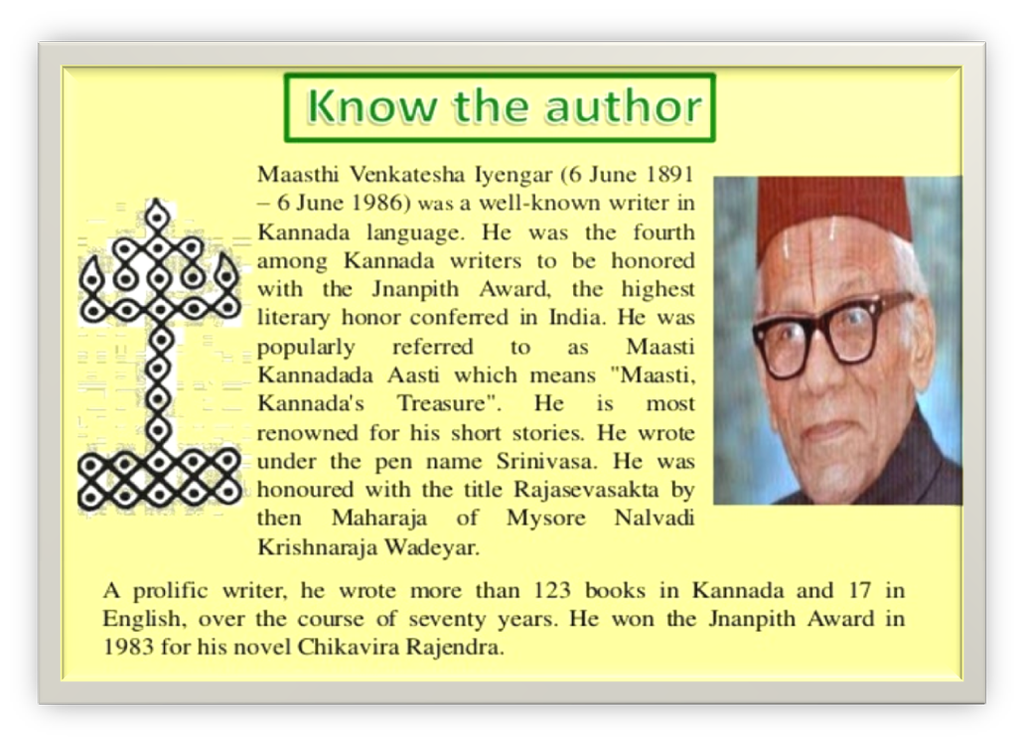
Summary
Ten years ago when the village accountant sent his son Ranga to Bangalore for studies, the situation in the village was different. People never used to use English words while talking in Kannada, their mother tongue. But now they do it with an abominable pride. For instance, Rama Rao’s son was not ashamed to use the word ‘change’ while buying some firewood from a woman who knew no English, thereby creating confusion.
Now people are so fond of foreign language and education that Ranga’s homecoming is made a big affair. People crowd his house to see if he has changed. They return home on finding no significant change in him. The narrator is particularly happy to find the boy still quite cultured as he respectfully does ‘namaskara’. The narrator spontaneously blesses him saying ‘May you get married soon.’
But the boy is not ready for marriage, he says. He is of the opinion that one should better remain a bachelor than marry a young girl, as the custom of the village is. The narrator is disappointed to hear this, but as he sincerely wants Ranga to get married and settle to be of some service to society, he does not lose heart. He takes a vow to get him married, and that to a young girl of 11 by the name of Ratna, Rama Rao’s niece, who has of late come to Hosahalli to stay for a few days.
Now the narrator plans to make the prospective bride and the bridegroom meet each other. So he does this by asking Rao’s wife to send Ratna to his house to fetch buttermilk. As Ratna arrives she is asked to sing. As planned at that very moment Ranga arrives and gets mesmerized by Ratna’s singing and almost instantly falls in love with her being oblivious of his theories regarding child marriage. The narrator, from his experience, notices this quite well but purposely disappoints Ranga by saying that Ratna is married.
The next morning the narrator meticulously plots with Shastri, the fortune teller, to trap Ranga and have him marry Ratna. He tutors him in what is to be said and done when he will bring the boy to him. The narrator finds Ranga miserable that day. The latter complains of headaches and the narrator suggests that they visit Shastri. Thereupon Ranga is taken to Shastri who cleverly reacts by saying that their visit has been a surprise. The narrator acts foolishly forgetting what he is supposed to say but Shastri cleverly manages the scene.
Everything goes well as per the plan. Shyama, the narrator, asks Shastri what might be worrying the boy. Shastri calculates throwing his cowries and suggests that it is about a girl. On further calculation, he suggests that the girl’s name has a connection with something found in the ocean. The narrator asks if it could be ‘Kamala’. Then he suggests ‘Pachchi’, meaning moss. When Shastri hints at‘ pearl’ or ‘Ratna’, the narrator becomes jubilant and Ranga is amazed. Shyama further asks if there is any chance of negotiation of the marriage bearing any fruit, to which Shastri answered affirmatively. But once again the narrator pours water on Ranga’s hopes by saying that Ratna is married.
However, on the way, the narrator enters Rama Rao’s house and comes out of the house to inform Ranga that Ratna is unmarried and the previous information about her marriage was wrong. Now visibly Ranga’s joys have no limits. When the narrator asks him whether whatever the astrologer told is right, he admits that it is true and further adds that there is more truth in astrology than he thought.
Later the narrator informs Shastri about the success story and makes a sarcastic comment about astrology. But Shastri is not ready to accept. He says that the former gave only the hints and whatever he said was the result of his calculation. Whatever the case might be, Ranga finally gets married to Ratna and fathers two children, moreover, Ratna is now eight months pregnant. The narrator is invited to the third birth anniversary of Ranga’s child, who was named after the narrator as ‘Shyama’. On finding this, the narrator mildly chides Ranga saying that he knows that it is the English custom to name the child after someone one likes, but it is not fair to name him ‘Shyama’ because he is fair complexioned.
All said and done, it is interesting to find how Ranga forgets what he learned about happy marriages in cities and gives in to the far deeper influences the village customs and traditions have on him. And why not, is it easy to do away with all that one learns so unconsciously day and night in the society one grows up in?
Ranga’s Marriage Lesson Explanation
Ranga, the accountant’s son, is one of the rare breeds among the village folk who has been to the city to pursue his studies. When he returns to his village from the city of Bangalore, the crowds mill around his house to see whether he has changed or not. His ideas about marriage are now quite different—or are they?
Word meaning
Rare breed- a person or thing with characteristics that are uncommon among their kind; a rarity
The lesson revolves around Ranga, the village accountant’s son who had just come back from Bangalore. At the news of his arrival, the villagers gather at his home to analyze if he had changed or not and what is his perception about marriage. Everyone was so excited because, during those days, not everyone used to get a chance to go to cities for studying.
When you see this title, some of you may ask, “Ranga’s Marriage?” Why not “Ranganatha Vivaha” or “Ranganatha Vijaya?” Well, yes. I know I could have used some other mouth-filling one like “Jagannatha Vijaya” or “Girija Kalyana.” But then, this is not about Jagannatha’s victory or Girija’s wedding. It’s about our own Ranga’s marriage and hence no fancy title. Hosahalli is our village. You must have heard of it. No? What a pity! But it is not your fault. There is no mention of it in any geography book. Those sahibs in England, writing in English, probably do not know that such a place exists, and so make no mention of it. Our own people forget about it. You know how it is —they are like a flock of sheep. One sheep walks into a pit, the rest blindly follow it. When both, the sahibs in England and our own geographers, have not referred to it, you cannot expect the poor cartographer to remember to put it on the map, can you? And so there is not even the shadow of our village on any map
Word meaning
Vivaha- Marriage
Vijaya- Victory
Girija- female (here)
Kalyana- beautiful, lovely, auspicious in Sanskrit
Sahib- a polite title or form of address for a man
Like a flock of sheep- a group of people behaving in the same way or following what others are doing
Cartographer- a person who draws or produces maps
The narrator expects the readers to be questioning the simplicity of the title “Ranga’s Marriage”. He feels readers might be thinking of fancier titles like “Ranganatha Vivaha”, “Ranganatha Vijaya” or “Girija Kalyana”. He clarifies that although he had options of keeping such elaborate names, the reason why he chose the basic and casual one is that the story is about “our Ranga” as in, someone who is very close and dear to him. They live in a village called Hosahalli in Mysore. Not many people know of it and the narrator does not blame them because there is no trace of it in the geography books. Even the Englishmen have no idea about the place but they are also not to blame because our citizens too are completely ignorant about his village. He refers to the people as “sheep” who blindly follow each other and do not use their logic or brain to justify or invent things. At last, he feels the cartographer is also not to be held responsible. As a result, there is no trace of their village on the map.
Sorry, I started somewhere and then went off in another direction. If the state of Mysore is to Bharatavarsha what the sweet karigadabu is to a festive meal, then Hosahalli is to Mysore State what the filling is to the karigadabu. What I have said is absolutely true, believe me. I will not object to your questioning it but I will stick to my opinion. I am not the only one who speaks glowingly of Hosahalli. We have a doctor in our place. His name is Gundabhatta. He agrees with me. He has been to quite a few places. No, not England. If anyone asks him whether he has been there, he says, “No, annayya , I have left that to you. Running around like a flea-pestered dog is not for me. I have seen a few places in my time, though.” As a matter of fact, he has seen many.
Word meaning
Bharatvarsha- India
Karigadabu- a South Indian fried sweet filled with coconut and sugar
Annayya- (in Kannada) a respectful term for an elder
Flea-pestered dog- A flea-pestered dog does not stick to one place but keeps roaming everywhere.Flea-pestered means being infested by fleas and ticks which can cause uncontrollable itching in animals
The narrator feels apologetic for getting carried away and deviating from the topic. He then again throws light upon the significance of the village Hosahalli. He says it is just as important as Mysore is to India, Karigadabu to a festive meal and filling is to Karigadabu. Thus, he can’t highlight its importance anymore. Not only him, but the doctor named Gundabhatta feels the same. The doctor has been to many places except England but he still loves Hosahalli. However, an outsider might contest this but the narrator claims to stick to his opinion of the place.

We have some mango trees in our village. Come visit us, and I will give you a raw mango from one of them. Do not eat it. Just take a bite. The sourness is sure to go straight to your brahmarandhra . I once took one such fruit home and chutney was made out of it. All of us ate it. The cough we suffered from, after that! It was when I went for the cough medicine that the doctor told me about the special quality of the fruit. Brahmarandhra-(in Kannada) the soft part in a child’s head where skull bones join later. Here, used as an idiomatic expression to convey the extreme potency of sourness. In Sanskrit, “Brahmarandhra” means the hole of Brahman. It is the dwelling house of the human soul.
Then he tells the readers about their special mango trees in the village whose mangoes are famous for their special quality. He once took the fruit at home to make chutney and everyone suffered from a bad cough after eating it. It was only when he went to see the doctor that he told him about the quality of mangoes of Hosahalli. The narrator asks the readers to take a bite and assures them that the sourness of the mango will be felt by them till the top of their head (where Brahmarandhra is located).
Just as the mango is special, so is everything else around our village. We have a creeper growing in the ever-so-fine water of the village pond. Its flowers are a feast to behold. Get two leaves from the creeper when you go to the pond for your bath, and you will not have to worry about not having leaves on which to serve the afternoon meal. You will say I am rambling. It is always like that when the subject of our village comes up. But enough. If any one of you would like to visit us, drop me a line. I will let you know where Hosahalli is and what things are like here. The best way of getting to know a place is to visit it, don’t you agree?
Word meaning
Behold- see or observe (someone or something, especially of remarkable or impressive nature)
Rambling- (of writing or speech) lengthy and confused or inconsequential
Not only is the mangoes, everything in and around this village is remarkable. The creeper growing in the pond and its flowers are also special. One can even serve an afternoon meal on its leaves, all you need to do is to grab two leaves when you are on your way to the pond to bathe. After speaking highly of his village, the narrator says if anyone wishes to see for himself/herself, one must contact him. He will help them to reach there. Also, he feels that there is no better way to know a place than to visit it.
What I am going to tell you is something that happened ten years ago. We did not have many people who knew English, then. Our village accountant was the first one who had enough courage to send his son to Bangalore to study. It is different now. There are many who know English. During the holidays, you come across them on every street, talking in English. Those days, we did not speak in English, nor did we bring in English words while talking in Kannada. What has happened is disgraceful, believe me. The other day, I was in Rama Rao’s house when they bought a bundle of firewood. Rama Rao’s son came out to pay for it. He asked the woman, “How much should I give you?” “Four pice,” she said. The boy told her he did not have any “change” and asked her to come the next morning. The poor woman did not understand the English word “change” and went away muttering to herself. I too did not know. Later, when I went to Ranga’s house and asked him, I understood what it meant.
The narrator then brings about a comparison as to how things were different ten years ago when not many people knew or spoke English. Neither did people send their children to big cities like Bangalore to study. Back then, only the village accountant had the courage to send his son to Bangalore. According to the author, those times were simpler. He justifies his claim by telling an incident where he was at Rama Rao’s house and they had just bought a bundle of firewood from an old lady. Rama told her to come the next morning as he did not have any chance at the moment. The poor old lady did not know what “change” meant and she went away whispering to herself. Neither did the narrator know its meaning. It was only when he went to Ranga’s house that he told him.
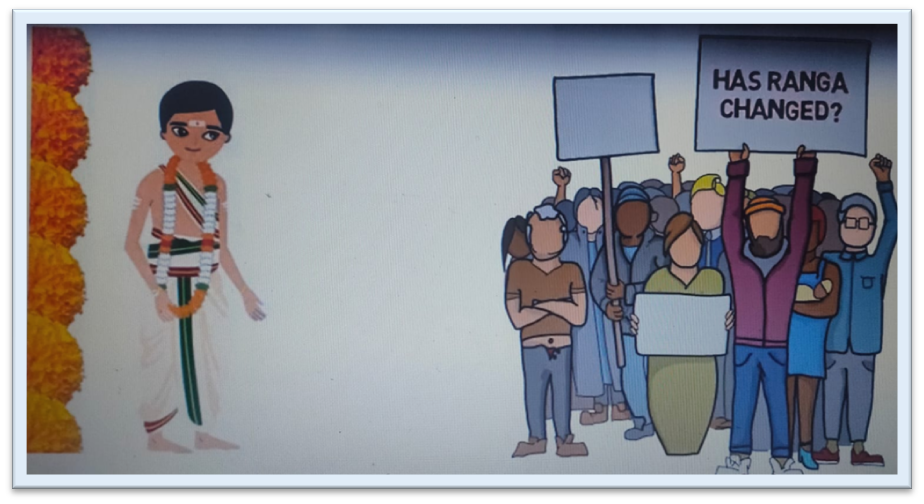
This priceless commodity, the English language, was not so widespread in our village a decade ago. That was why Ranga’s homecoming was a great event. People rushed to his doorstep announcing, “The accountant’s son has come,” “The boy who had gone to Bangalore for his studies is here, it seems,” and “Come, Ranga is here. Let’s go and have a look.”
However, ten years ago, English was not commonly spoken in this village and when the villagers came to know that Ranga, the accountant’s son was coming home from Bangalore, everyone got excited and rushed to his home to have a glance at him.
Attracted by the crowd, I too went and stood in the courtyard and asked, “Why have all these people come? There’s no performing monkey here.” A boy, a fellow without any brains, said, loud enough for everyone to hear, “What are you doing here, then?” A youngster, immature and without any manners. Thinking that all these things were now of the past, I kept quiet.
Fascinated by all the crowd, the narrator too, went there and asked people as to why they were gathered because he couldn’t see anything entertaining happening there like a monkey performing. A boy “without brains” shouted loud enough for everyone to hear and in a rude way. The narrator called him immature
Seeing so many people there, Ranga came out with a smile on his face. Had we all gone inside, the place would have turned into what people call the Black Hole of Calcutta. Thank God it did not. Everyone was surprised to see that Ranga was the same as he had been six months ago when he had first left our village. An old lady who was near him ran her hand over his chest, looked into his eyes, and said, “The janewara is still there. He hasn’t lost his caste.” She went away soon after that. Ranga laughed.
Word meaning
Janewara- (in Kannada) the sacred thread worn by Brahmins
All the people were waiting outside Ranga’s house because the place would look like the “Black Hole of Calcutta” if they all went inside. By saying this, the narrator means that there were so many people that the house would have fallen short to accommodate them all. Thus, Ranga came outside with a smile on his face. Everyone was so amazed to see that Ranga had not changed a bit after he left 6 months ago. An old lady even went to the extent of running her hands through his chest to check for a sacred thread. However, she went away after confirming that he had not forgotten about his caste.
Once they realized that Ranga still had the same hands, legs, eyes, and nose, the crowd melted away, like a lump of sugar in a child’s mouth. I continued to stand there. After everyone had gone, I asked, “How are you, Rangappa? Is everything well with you?” It was only then that Ranga noticed me. He came near me and did a namaskara respectfully, saying, “I am all right, with your blessings.”
Once the villagers realized that Ranga did not change even after moving to the city, they disappeared as fast as a lump of sugar does in a child’s mouth. The narrator waited till the crowd cleared and asked him about his well-being. Ranga noticed him and replied with full respect in a traditional way. Ranga had not noticed the narrator in the crowd before that moment.
I must draw your attention to this aspect of Ranga’s character. He knew when it would be to his advantage to talk to someone and rightly assessed people’s worth. As for his namaskara to me, he did not do it like any present-day boy—with his head up towards the sun, standing stiff like a pole without joints, jerking his body as if it was either a wand or a walking stick. Nor did he merely fold his hands. He bent low to touch my feet. “May you get married soon,” I said, blessing him. After exchanging a few pleasantries, I left.
Ranga was very well-behaved and well-aware as to who could benefit him. He was one of those who could analyze someone’s worth rightfully. For how he greeted the narrator, he bent low and touched his feet thereby seeking his blessings. It was not the present-day namaskara where children would do it casually, it was a proper, traditional one. The narrator blessed him that he might get married soon and then, left.
That afternoon, when I was resting, Ranga came to my house with a couple of oranges in his hand. A generous, considerate fellow. It would be a fine thing to have him marry, settle down and be of service to society, I thought. For a while, we talked about this and that. Then I came to the point. “Rangappa, when do you plan to get married?” “I am not going to get married now,” he said. “Why not?” “I need to find the right girl. I know an officer who got married only six months ago. He is about thirty and his wife is twenty-five, I am told. They will be able to talk lovingly to each other. Let’s say I married a very young girl. She may take my words spoken in love as words spoken in anger. Recently, a troupe in Bangalore staged the play Shakuntala. There is no question of Dushyantha falling in love with Shakuntala if she were young, as the present-day brides, is there? What would have happened to Kalidasa’s play? If one gets married, it should be to a girl who is mature. Otherwise, one should remain a bachelor. That’s why I am not marrying now.”
Word meaning
Considerate- thoughtful, concerned
Troupe- a group of dancers, actors, or other entertainers who tour different venues
That afternoon, Ranga visited the author with a few oranges which the narrator thought was quite thoughtful of him. Thinking of how nice Ranga is, the author thought it would be a good deed to have him married to a girl just as nice as him. They chatted for a while and then the narrator asked Ranga about his views on getting married. Ranga expresses that he doesn’t intend on marrying now because he intends on finding the right girl. He cites the example of an officer who got married at the age of thirty to a woman aged twenty-five. Now since these are both adults, they would understand each other’s actions and behavior. Whereas suppose the narrator finds a girl who is very young, she could misunderstand his words or actions because she is not mature enough. He even mentions the love story of Shakuntala and Dushyantha from Mahabharata and that he would not have fallen in love with Shakuntala if she were too young. In that case, Kalidasa’s play also would have not existed. That is why he intends on staying a bachelor's till he finds the right girl.
“Is there any other reason?” “A man should marry a girl he admires. What we have now are arranged marriages. How can one admire a girl with milk stains on one side of her face and wetness on the other, or so young that she doesn’t even know how to bite her fingers?” “One a neem fruit, the other, a bitter gourd.” “Exactly!” Ranga said, laughing. I was distressed that the boy who I thought would make a good husband, had decided to remain a bachelor. After chatting for a little longer, Ranga left. I made up my mind right then, that I would get him married. Rama Rao’s niece, a pretty girl of eleven, had come to stay with him. She was from a big town, so she knew how to play the veena and the harmonium. She also had a sweet voice. Both her parents had died, and her uncle had brought her home. Ranga was just the boy for her, and she was the most suitable bride for him.
Here, the narrator introduces us to a new character in the story named Ratna. She is eleven years old and is Rama Rao’s niece. She had lost both her parents so her uncle brought her from the big town to his home with him. She had a great voice and could play harmonium and veena. The narrator thought that Ranga and Ratna would make a great pair.
Since I was a frequent visitor to Rama Rao’s place, the girl was quite free with me. I completely forgot to mention her name! Ratna, it was. The very next morning I went to their house and told Rama Rao’s wife, “I’ll send some buttermilk for you. Ask Ratna to fetch it.” Ratna came. It was a Friday, so she was wearing a grand saree. I told her to sit in my room and requested her to sing a song. I sent for Ranga. While she was singing the song— Krishnamurthy, in front of my eyes — Ranga reached the door. He stopped at the threshold. He did not want the singing to stop but was curious to see the singer. Carefully, he peeped in. The light coming into the room was blocked. Ratna looked up and seeing a stranger there, abruptly stopped.
Word meaning
Threshold- a strip of wood or stone forming the bottom of a doorway and crossed in entering a house or a room
Ratna was quite familiar with the narrator as he visited Rama’s place frequently. The narrator thought of a plan to introduce Ratna to Ranga. He asked Rama to send Ratna to his place as he wanted to send some buttermilk for them. She came all dressed up. The narrator insisted upon her to sing a song while he sent someone to call Ranga. Just as she was singing, Ranga arrived at the door. Her melancholic voice touched his ears and thus, he did not want to interrupt the singing so he stood at the door. He was curious to see the singer and very cautiously he tried to have a look that disturbed the lighting in the room. On seeing a stranger, Ratna immediately stopped her singing.
Suppose you buy the best quality mango. You eat it slowly, savoring its peel, before biting into the juicy flesh. You do not want to waste any part of it. Before you take another bite, the fruit slips out of your hand and falls to the ground. How do you feel? Ranga’s face showed the same disappointment when the singing stopped. “You sent for me?” he asked as he came in and sat on a chair. Ratna stood at a distance, her head lowered. Ranga repeatedly glanced at her. Once, our eyes met, and he looked very embarrassed. No one spoke for a long while.
The narrator compares Ranga’s situation to the disappointment of dropping a best-quality mango on the floor just before having to truly enjoy it. It was as if something great had been stolen before one could fully enjoy it. Ranga asked the narrator why he called for him. Ratna was shy and thus, looked downward whereas Ranga stealthily glanced at her. There was an awkward silence in the room.
“It was my coming in that stopped the singing. Let me leave.” Words, mere words! The fellow said he would leave but did not make a move. How can one expect words to match actions in these days of Kaliyuga? Ratna ran inside, overcome by shyness. After things went a bit awkward, Ranga said that he feels it was his coming that stopped the singing so he must leave. However, he did not. The narrator makes fun of him because he had no intention of going. He jokes about it and says one cannot expect actions and words to match in the Kalyuga.
After a while, Ranga asked, “Who is that girl, swami?” “Who’s that inside?” the lion wanted to know. The he-goat who had taken shelter in the temple replied, “Does it matter who I am? I am a poor animal who has already eaten nine lions. I have vowed to eat one more. Tell me, are you male or female?” The lion fled the place in fear, it seems. Like the he-goat, I said, “What does it matter to either of us who she is? I’m already married and you aren’t the marrying kind.”
After a few minutes of awkward silence, Ranga finally asked the narrator about the girl. Now the narrator compares the situation with the infamous story of the he-goat and the lion where he is the he-goat and Ranga, the lion. The narrator replies very cleverly and intends on seeing Ranga’s interest in knowing about Ratna. Thus, he says that who she is, is not of that much importance because he is already married and Ranga doesn’t intend on marrying anytime soon.
Very hopefully, he asked, “She isn’t married, then?” His voice did not betray his excitement but I knew it was there. “She has married a year ago.” His face shriveled like roasted brinjal. After a while, Ranga left, saying, “I must go, I have work at home.” I went to our Shastri the next morning and told him, “Keep everything ready to read the stars. I’ll come later.” I tutored him in all that I wanted him to say. I found no change in Ranga when I met him that afternoon. “What’s the matter? You seem to be lost in thought,” I said. “Nothing, nothing’s wrong, believe me.” “Headache? Come, let’s go and see a doctor.”
Word meaning
Betray- portray (here)
Shriveled- shrunken and wrinkled; especially as a result of loss of moisture
Tutored- taught
Hearing the narrator’s reply, Ranga got excited, although he did not show it but was quite evident. Full of hope, he asks if she isn’t married yet to which the narrator replies that she is, probably a year ago. Ranga was disappointed and disheartened. It was clearly all over his face. He went away quoting some work. Our narrator, having staged certain liking in the mind of Ranga for Ratna, went on to complete his play. He went to the village Shastri and told him everything that had to be said and done. Then, he met Ranga that afternoon and he carried the same disappointment on his face. Upon asking if it’s a headache, the narrator tells him that they should go see a doctor.
“I have no headache. I’m my usual self.” “I went through the same thing when the process of choosing a girl for me was going on. But I don’t think that that could be a reason for your present condition.” Ranga stared at me. “Come, let’s go and see Shastri,” I suggested. “We will find out whether Guru and Shani are favorable for you or not.” Ranga accompanied me without any protest. As soon as Shastri saw me, he exclaimed, “What a surprise, Shyama! Haven’t seen you for a long time.”
Ranga insists that everything is fine with him and he is his normal self. The narrator, very wittily, makes a remark that he went through the same feelings when he was seeing girls for himself and immediately mentions that it could not be the reason for Ranga. Furthermore, he suggested that they go see Shastri to see if the stars (Guru for Jupiter and Shani for Saturn) are in their favor. Ranga went with him. On seeing Shastri ji, he implied not having seen the narrator in a long while, which is obviously not true as they had met before, the same morning.
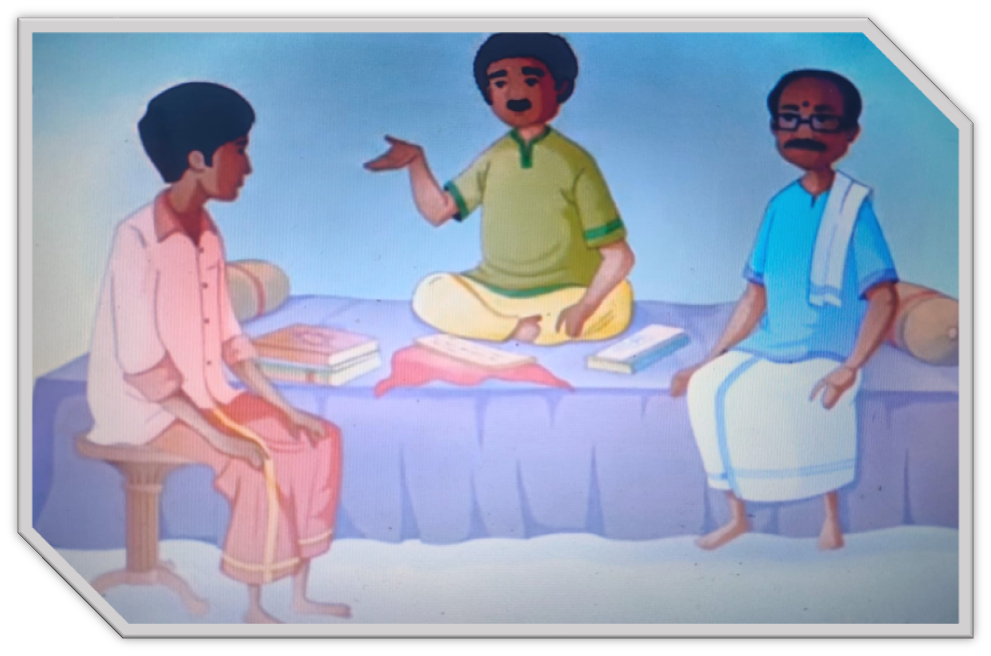
Shyama is none other than your servant, the narrator of this tale. I got angry and shouted, “What? Only this morning…” Shastri completed my sentence, “You finished all your work and are now free to visit me.” Had he not done so, I would have ruined our plan by bursting like grains that are kept in the sun to dry. I was extremely careful of what I said afterward. Shastri turned to Ranga. “When did the young son of our accountant clerk come home? What can I do for him? It’s very rarely that he visits us.”
Here, the narrator reveals his pet name, Shyama as they called him in the village. The narrator felt that Shastri was lying because they saw each other that morning and thus he immediately responded. However, Shastri completed his sentence and saved the entire situation. Shyama realized what he was just about to do and took extra care from that moment. Shastri continued his role and acted surprised on seeing Ranga.
“Take out your paraphernalia. Our Rangappa seems to have something on his mind. Can you tell us what’s worrying him? Shall we put your science of astrology to the test?” There was an authority in my voice as I spoke to Shastri. He took out two sheets of paper, some cowries, and a book of palmyra leaves, saying, “Ours is an ancient science, ayya. There’s a story to it… But I won’t tell you that story now. This is not a harikatha that allows you to tell a story within a story… You may get bored. I’ll tell it to you some other time.”
Word meaning
Paraphernalia- trappings associated with a particular institution or activity that are regarded as superfluous
Cowries- a marine mollusk that has a glossy, brightly patterned domed shell with a long, narrow opening
Palmyra- palm tree
Harikatha- Story of Lord
The narrator asks the Shastri to take out all his tools to help solve whatever is going on in Ranga’s mind with full authority. Shastri took out his essentials and told them that this is all ancient science but he won’t recite it now because then they both would get bored but he does intend on telling it some other time.
Shastri moved his lips fast as he counted on his fingers and then asked, “What’s your star?” Ranga didn’t know. “Never mind,” Shastri indicated with a shake of his head. He did some more calculations before saying in a serious tone, “It’s about a girl.” I had been controlling my laughter all this while. But now I burst out laughing. I turned to Ranga. “Exactly what I had said.” “Who is the girl?” It was your humble servant who asked the question.
Shastri moved his lips while counting quickly and asked Ranga about his star which he did not know. Shastri implied that it’s manageable. He appeared to be doing certain calculations. After a moment, he indicated that Ranga has a girl on her mind. Even after trying his best, Shyama could not control his laughter. He thus, posed the question to Shastri asking about the details of the girl.
Shastri thought for a while before replying, “She probably has the name of something found in the ocean.” “Kamala?” “Maybe.”
“Could it be Pachchi, moss?” “Must it be moss if it’s not Kamala? Why not pearl or Ratna, the precious stone?” “Ratna? The girl in Rama Rao’s house is Ratna. Tell me, is there any chance of our negotiations bearing fruit?” “Definitely,” he said, after thinking for some time. There was a surprise on Ranga’s face. And some happiness. I noticed it. “But that girl is married…” I said, Then I turned to him. His face had fallen
Shastri thought and thought and replied that the girl is likely to have the name of something found in the ocean. Their guesses include Kamala, Pachchi, moss, pearl, and then suddenly Shastri said Ratna. All of it came together now to a girl named Ratna, who is the niece of Rama Rao. That’s it, Ranga was thinking about her only. Ranga was both surprised and happy because Shastri’s predictions were right. He immediately became disappointed when he recalled that she was married.
“I don’t know all that. There may be some other girl who is suitable. I only told you what our shastra indicated,” Shastri said. We left the place. On the way, we passed by Rama Rao’s house. Ratna was standing at the door. I went in alone and came out a minute later.
Shastri said that he did not know all that and there might be another suitable girl. To make it look real, Shastri interfered in their name guessing game and told them that he only told what can be read. Both of them left and crossed Rama Rao’s door where Shyama went to see Ratna for a minute and came back.
“Surprising. This girl isn’t married, it seems. Someone told me the other day that she was. What Shastri told us has turned out to be true after all! But Rangappa, I can’t believe that you have been thinking of her. Swear on the name of Madhavacharya and tell me, is it true what Shastri said?”
I do not know whether anyone else would have been direct. Ranga admitted, “There’s greater truth in that shastra than we imagine. What he said is absolutely true.”
Word meaning
Madhavacharya- an exponent of Vedantic philosophy from South India
When the narrator comes back, he announces that fortunately, Ratna is not married and someone might have wrongly conveyed it to him about that. The narrator expresses his amazement at the fact that he has been thinking about Ratna and asks him to swear upon the truth. To his surprise, Ranga told him the truth that whatever Shastri said is true. His belief in all the Shastras had strengthened.
Shastri was at the well when I went there that evening. I said, “So Shastrigale, you repeated everything I had taught you without giving rise to any suspicion. What a marvelous shastra yours is!” He didn’t like it at all. “What are you saying? What you said to me was what I could have found out myself from the shastras. Don’t forget, I developed on the hints you had given me.” Tell me, is this what a decent man says?
Word meaning
Marvelous- causing great wonder; extraordinary
Shyama went to see Shastri that evening when he was near the well and remarked about how well he did what Shyama told him to. Shastri seemed to not like what the narrator was saying. Thus, he says that whatever he said could very clearly be seen in the Shastras. He completely disagreed with having staged the entire conversation.
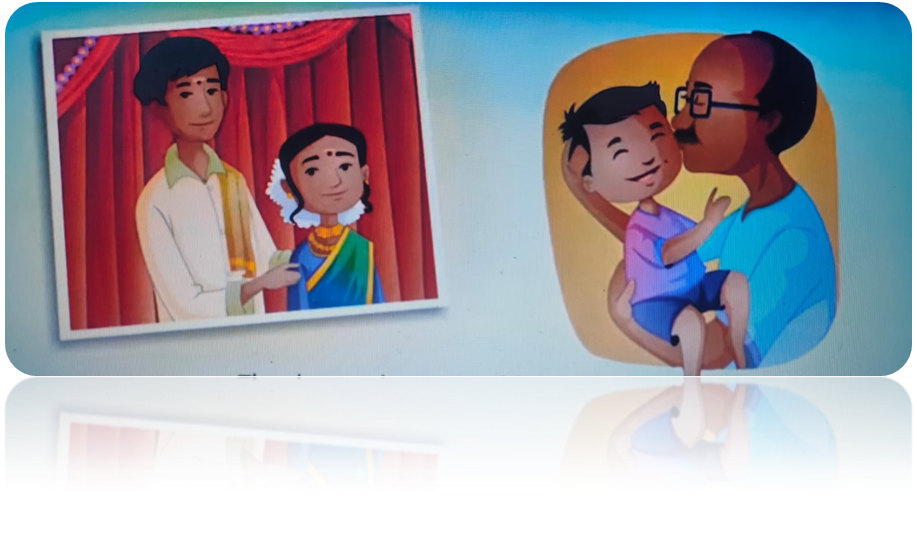
Rangappa had come the other day to invite me for dinner. “What’s the occasion?” I asked. “It’s Shyama’s birthday. He is three.” “It’s not a nice name —Shyama,” I said. “I’m like a dark piece of oil-cake. Why did you have to give that golden child of yours such a name? What a childish couple you are, Ratna and you! I know, I know, it is the English custom of naming the child after someone you like… Your wife is eight months pregnant now. Who’s there to help your mother to cook?” “My sister has come with her.” I went there for dinner. Shyama rushed to me when I walked in and put his arms around my legs. I kissed him on his cheek and placed a ring on his tiny little finger.
Now, the narrator takes us a few years forward where Ranga and Ratna are happily married, had a three-year-old son and Ratna was eight months pregnant. Ranga’s sister had come over to help them. It was Shyama’s birthday! Yes, the couple named their son after the narrator as it is a common foreign tradition to name your child after someone you truly admire. When the narrator went there for dinner, Shyama came running to him only to show his love by holding his leg. The narrator kissed him and gave him a ring.
Allow me to take leave of you, reader. I am always here, ready to serve you. You were not bored, I hope?
The narrator writes an ending note to all the readers hoping that they were not bored.
Albert Einstein at School
- Books Name
- (English) Hornbill & Snapshot Class-11
- Publication
- PathSet Publications
- Course
- CBSE Class 11
- Subject
- English
Albert Einstein at School
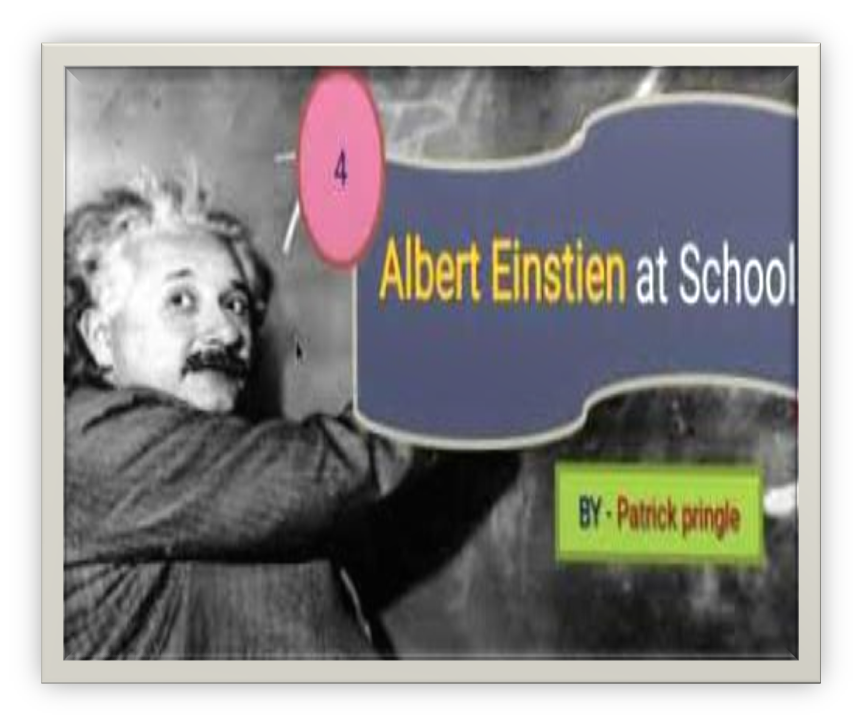
Introduction
In this story, we learn about the father of modern physics. Albert Einstein is known all over for his valuable contributions to physics and the theory of relativity. However, this story brings forth his school days which were not that pleasant. Naturally, everyone must think that such a genius mind would have excelled at school. But, it wasn’t so when he was in school.
Summary
The lesson begins with little Albert’s encounter with his history teacher, where the teacher is asking him about a particular date from the past and as usual, our unattentive Albert doesn’t know the answer. This moment leads us to a little speech given by Einstein in the class about what “education” should include and what they are being taught is irrelevant. It ends up in him being punished by the teacher, which again, is not new. Then the lesson talks about how Albert disliked his neighborhood because of all the slum violence and compared it to his best friend, Yuri’s neighborhood who did not like his’ either. Albert even expresses his worries to his cousin Elsa from Berlin who thinks he can pass if he made a little effort. At this point, Albert starts strategizing his way to get out of the school and he suddenly gets an idea that involves a doctor who is willing to help him. He wanted the doctor to know that he had a nervous breakdown and prescribe that the root cause of it is school, and he shall stay as far away from it as he could. This is where Yuri agrees and sets up an appointment with his friend, a freshly-qualified doctor who he warns is hard to befool. Albert thinks about his conversation with the doctor so much that at this point, he is actually nervous. On meeting the doctor, he comes to know that Yuri has already told him everything and the doctor is ready to help him. The doctor understands how tiring school can be, asks Albert his plans after he gets out of school, and realizes he is doing no good to him or anyone by staying there. Thus, he hands him his medical certificate and in turn asks him to take Yuri out for a meal. Although excited Albert had no money to spare, he took Yuri out for supper. He is next seen with his maths teacher who is giving him a referral to make it easier for him to get into a college for pursuing higher mathematics.
Einstein had studied all the maths they teach in school and even some more. He is then summoned to the head teacher’s room where he is told to walk away as hardly any serious work can be accomplished when he is around. As tempting, it was for Albert to tell the headteacher the truth and what he thought about his school, he resisted it and walked straight out of the school with his head high. He said goodbye to his only friend Yuri and Elsa was back in Berlin by that time. At last, Albert was out of school.
Albert Einstein at School Explanation
Albert Einstein (1879–1955) is regarded as the greatest physicist since Newton. In the following extract from The Young Einstein, the well-known biographer, Patrick Pringle, describes the circumstances which led to Albert Einstein’s expulsion from a German school.
Word meaning
Biographer- a person who writes an account of someone else
Expulsion- the action of forcing someone to leave an organization
The lesson is about the famous theoretical physicist Albert Einstein. It is taken from the biography named ‘The Young Einstein’ written by Patrick Pringle. The lesson talks about how Albert Einstein hated school, wanted to leave it and then was forced out of it.
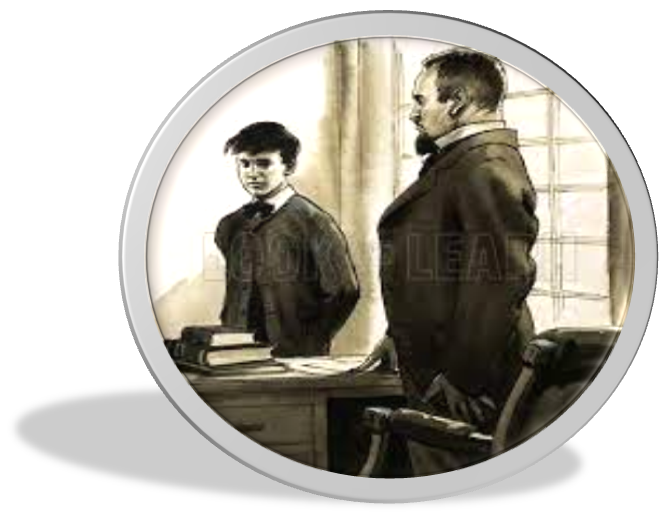
“IN what year, Einstein,” asked the history teacher, “did the Prussians defeat the French at Waterloo?” “I don’t know, sir,” “Why don’t you know? You’ve been told it often enough.” “I must have forgotten.” “Did you ever try to learn?” asked Mr. Braun. “No, sir,” Albert replied with his usual unthinking honesty. “Why not?” “I can’t see any point in learning dates. One can always look them up in a book.” Mr. Braun was speechless for a few moments. “You amaze me, Einstein,” he said at last. “Don’t you realize that one can always look most things up in books? That applies to all the facts you learn at school.” “Yes, sir.” “Then I suppose you don’t see any point in learning facts.” “Frankly, sir, I don’t,” said Albert.
The lesson begins with an account of Albert with his history teacher where the teacher asks him about the year in which the Prussians defeated the French at Waterloo. As usual, Einstein does not remember it to which Mr. Braun points out that the reason for this is because Einstein never bothers to learn them. Albert justifies that he finds it pointless to digest dates because one can always look them up in books whenever needed. The answer left Mr. Braun dumbstruck for a while. Finally, he replies and tells him that similarly, most of the things being taught in school can be looked up in the books and there is no point in mugging up facts. Einstein, without realizing that the statement was sarcastic, agrees with him.
“Then you don’t believe in education at all?” “Oh, yes, sir, I do. I don’t think learning facts is education.” “In that case,” said the history teacher with heavy sarcasm, “perhaps you will be so kind as to tell the class the Einstein theory of education.”
Professor concludes that if Einstein doesn’t see any point in grasping facts, then he should not also be a believer and follower of education. Albert very clearly replies that he is undoubtedly vested in the idea of education but according to him, merely digesting facts is not education. The history teacher, then in an attempt to mock him in front of the whole class, asks about his elaborate version of an ideal education.
Albert flushed. “I think it’s not facts that matter, but ideas,” he said. “I don’t see the point in learning the dates of battles, or even which of the armies killed more men. I’d be more interested in learning why those soldiers were trying to kill each other.” “That’s enough,” Mr. Braun’s eyes were cold and cruel. “We don’t want a lecture from you, Einstein. You will stay in for an extra period today, although I don’t imagine it will do you much good. It won’t do the school any good, either. You are a disgrace. I don’t know why you continue to come.” “It’s not my wish, sir,” Albert pointed out. “Then you are an ungrateful boy and ought to be ashamed of yourself. I suggest you ask your father to take you away.”
Again, being very clear about his idea of education, Albert explains that it is useless to acquire knowledge on dates of battles and the number of men that were compromised. What is important is to read and analyze the reasons that were responsible for the battle between the two armies. Mr. Braun got extremely angry and interrupted Albert’s speech and punished him to stay for extra classes, even if it were of no good to anyone including Albert. The teacher then calls him a “disgrace” expressing his displeasure of having him around. Albert mentions that he doesn’t want to be there either. The teacher then remarkably calls him an “ungrateful boy” who should be ashamed and suggests that his father take him away from school.
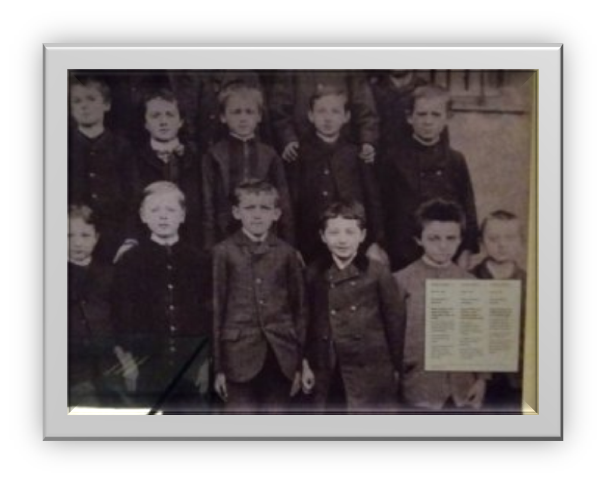
Albert felt miserable when he left school that afternoon; not that it had been a bad day—most days were bad now, anyway— but because he had to go back to the hateful place the next morning. He only wished his father would take him away, but there was no point in even asking. He knew what the answer would be: he would have to stay until he had taken his diploma.
Word meaning
Miserable- unhappy
That afternoon, Albert was unhappy when he left school. It was not that the day was bad but in general, days were getting bad at school and he hated the thought of going to school every morning. His only wish was that his father would take him to Italy along with him but it was pointless to ask him because he would anyway make him stay here until he completed his diploma.
Going back to his lodgings did not cheer him up. His father had so little money to spare that Albert had been found a room in one of the poorest quarters of Munich. He did not mind the bad food and lack of comfort, or even the dirt and squalor, but he hated the atmosphere of slum violence. His landlady beat her children regularly, and every Saturday her husband came drunk and beat her.
Word meaning
Lodgings- temporary accommodation or a room rented out to someone, usually in the same residence as the owner
Squalor- the state of being extremely dirty and unpleasant, especially as a result of poverty and neglect
The school was surely an unpleasant place for Einstein but his place of stay in Munich was nothing better. Because of limited cash availability with his father, he had to stay within the poorest neighborhood in Munich. However, poverty, bad food, dirt, and lack of comfort hardly bothered him, it was the frequent fights at the place that he hated. Even the landlady’s family was a violent one where she used to hit her kids every now and then while her husband beat her every Saturday after he came back home drunk.
“But at least you have a room of your own, which is more than I can say,” said Yuri when he called round in the evening. “At least you live among civilized human beings, even if they are all poor students,” said Albert. “They are not all civilized,” Yuri replied. “Did you not hear that one of them was killed last week in a duel?” “And what happens to the one who killed him?” “Nothing, of course. He is even proud of it. His only worry is that the authorities have told him not to fight any more duels. He’s upset about this because he hasn’t a single scar on his face to wear for the rest of his life as a badge of honor.” “Ugh!” exclaimed Albert. “And these are the students.” “Well, you’ll be a student one day,” said Yuri. “I doubt it,” said Albert glumly.
Word meaning
Duel- A contest with deadly weapons arranged between two people in order to settle a point of honor
Now here, we are introduced to his friend Yuri who is also not very fortunate. He reminds Albert that he should be glad about the fact that he has a room of his own to live in even though the neighborhood is not something he likes. In return, Albert reminds Yuri that even though Yuri lives among poor students, they are all civilized and non-violent. Yuri interrupts to correct him that not all of them have manners and only last week, one was killed in a fight. The one who killed him did not face any circumstances except never being allowed to play a duel again. The only regret that guy had was that he won’t be able to show off a scar as a symbol of bravery. Albert sighs at the state of students pursuing diplomas. Yuri then gives Albert some hope by saying that he will be a student too, to which Albert expresses his doubtfulness.
“I don’t think I’ll ever pass the exams for the school diploma.” He told his cousin Elsa the same next time she came to Munich. Normally she lived in Berlin, where her father had a business. “I’m sure you could learn enough to pass the exams, Albert if you tried,” she said, “I know lots of boys who are much more stupid than you are, and who gets through. They say you don’t have to know anything— you don’t have to understand what you’re taught, just be able to repeat it in the exams.” “That’s the whole trouble,” said Albert. “I’m no good at learning things by heart.”
Albert expresses his concern to his cousin Elsa saying that it is not very likely for him to pass exams. Elsa, who had come to visit Einstein in Munich, normally lived in Berlin, the place of her family business. Elsa tried to convince Albert to learn just enough to pass the exams by learning and repeating facts and that, she had seen a lot of dull guys do it. Albert, again, exclaimed that learning things by heart is not his best suit.
“You don’t need to be good at it. Anyone can learn like a parrot. You just don’t try. And yet I always see you with a book under your arm,” added Elsa. “What is the one you’re reading?” “A book on geology.” “Geology? Rocks and things? Do you learn that?” “No. We have hardly any science at school.” “Then why are you studying it?” “Because I like it. Isn’t that a good enough reason?” Elsa sighed. “You’re right, of course, Albert,” she said. “But it won’t help with your diploma.”
Elsa presented her counter-agreement that anyone can learn like a parrot but for that, one needs to try which Albert doesn’t. She then expresses irony by mentioning that he always has a book under his arm. Albert tells her that it is a book on Geology that is not taught in school. He adds that they are hardly taught Science at school. Elsa doesn’t understand why he is reading the book if it is not a part of his curriculum. Albert clarifies that he likes studying science and considers it a reason good enough to read it. Elsa understands this but also warns him that it is not going to help him in passing his diploma.
Apart from books on science, his only comfort was music, and he played his violin regularly until his landlady asked him to stop. “That wailing gets on my nerves,” she said. “There’s enough noise in this house, with all the kids howling.” Albert was tempted to point out that most of the time it was she who made them howl, but he decided it was better to say nothing.
Word meaning
Wailing- crying with pain or anger
Howling- making a howling sound
Albert was very fond of reading science books and the only other thing that brought him joy and peace was music. He played the violin a lot but only until his landlady told him to stop.
The sound supposedly irritated her and she justified it by saying that kids already make a lot of noise in the house. Albert wanted to say that she is the one who made her kids cry all the time but somehow resisted the urge to say it, probably for the better.
“I must get away from here,” he told Yuri, after six months alone in Munich. “It is absurd that I should go on like this. In the end, it will turn out I have been wasting my father’s money and everyone’s time. It will be better for all if I stop now.” “And then what will you do?” Yuri asked. “I don’t know. If I go to Milan I’m afraid my father will send me back. Unless…” His eyes gleamed with a sudden idea. “Yuri, do you know any friendly doctors?” “I know a lot of medical students, and some of them are friendly,” said Yuri. “Doctor, no. I’ve never had enough money to go to one. Why?”
After being in Munich alone for six months, Albert expressed to Yuri that he feels it’s high time he moves away from here. He sees no point in carrying on like this because if he does, it is only going to result in the wastage of his father’s money, everyone’s time, and efforts. Yuri asked if he has any backup plans to which Albert says that going to Milan wouldn’t be such a great idea because his father would send him back. They were discussing all it when suddenly, an idea occurred to him. He asked Yuri if he knew any doctors. Unfortunately, Yuri could never afford to go to one but he did have a lot of friends from the medical field.
“Suppose,” said Albert, “that I had a nervous breakdown. Suppose a doctor would say it’s bad for me to go to school, and I need to get right away from it?”
Albert’s idea included a nervous breakdown and a doctor that could advise him that school is bad for him and he needs to stay as far as he could from it.
“I can’t imagine a doctor saying that,” said Yuri. “I must try,” said Albert, “to find a doctor who specializes in nerves.” “There are plenty of them,” Yuri told him. He hesitated for a moment, and then added, rather reluctantly, “I’ll ask some of the students if they know one if you like.” “Will you? Oh, thank you, Yuri,” Albert’s eyes were shining. “Wait a moment, I haven’t found one yet…” “Oh, but you will!” “And if I do I don’t know if he’ll be willing to help you…” “He will, he will,” declared Albert. “I’m going to have a real nervous breakdown, to make it easier for him.” He laughed merrily. “I’ve never seen you looking less nervous,” remarked Yuri. “A day or two at school will soon put that right,” Albert assured him.
Yuri didn’t think the idea was a success because it was merely likely for a doctor to advise something like that. Albert still wanted to give it a try and find a doctor that specializes in nerves. Yuri offers to ask one of his friends about such a doctor. Albert expressed his gratitude. Yuri told him not to have his hopes high but little. Albert was hopeful and positive about finding a suitable doctor that will be willing to help him. He even went to the extent of offering to showcase an actual breakdown to make it seem more real. He was full of hope and Yuri had never seen him feeling like that. Albert told him not to worry about that because a day or two at school would restore him back to his troubled state.
Certainly, he had lost his high spirits when Yuri saw him next. “I can’t stand it any longer,” he said, “I really shall have a nervous breakdown that will satisfy any doctor.” “Keep it up, then,” said Yuri. “I’ve found a doctor for you.” “You have?” Albert’s face lit up. “Oh, good. When can I see him?” “I have an appointment for you for tomorrow evening,” Yuri said. “Here’s the address.” He handed Albert a piece of paper. “Doctor Ernst Weil -is he a specialist in nervous troubles?” asked Albert.
Albert was right and when Yuri saw him the next time, he actually seemed troubled. By this time, Albert had given up and he actually was expecting a nervous breakdown if it continued like this. This would have surely made the doctor’s work easier. Yuri conveyed to him that he has found just the doctor for him and he has an appointment the next evening while giving him the address. Albert read the doctor’s name, which is Doctor Ernst Weil, and asked Yuri if he specialized in nerves?
“Not exactly,” Yuri admitted. “As a matter of fact, he only qualified as a doctor last week. You may even be his first patient!” “You knew him as a student, then?” “I’ve known Ernst for years.” Yuri hesitated for a few moments. “He’s not a fool,” he warned Albert. “What do you mean?” “Don’t try to pull the wool over his eyes, that’s all. Be frank with him, but don’t pretend you’ve got what you haven’t. Not that you’d deceive anyone.” Yuri added. “You’re the world’s worst liar.”
Yuri told him that he was not exactly a neuro specialist and that he qualified as a doctor only last week and that Albert could even be his first patient. Yuri mentioned that he has known him for a while now and warned Albert to not lie to him because he was no fool. Yuri asked him to be honest and not pretend to have nerve issues. He immediately mentioned that it was also not possible because Albert is the “World’s worst liar”.
Albert spent the next day wondering what to tell the doctor. When the time arrived for his appointment he had worried over it so much that he really was quite nervous.
He spent the next day thinking about all he was going to say to the doctor. He thought so much that he feared he would actually get a nervous breakdown
“I don’t really know how to describe my trouble, Dr. Weil,” he began. “Don’t try,” said the young doctor with a friendly smile. “Yuri has already given me a history of the case.” “Oh! What did he say?” “Only that you want me to think you have had a nervous breakdown, and say that you mustn’t go back to that school.” “Oh, dear.” Albert’s face fell. “He shouldn’t have told you that.” “Why not? Isn’t it true, then?” “Yes, that’s the trouble. Now you’ll say there’s nothing wrong with me, and you’ll tell me to go back to school.” “Don’t be too sure of that,” said the doctor. “As a matter of fact, I am pretty sure you are in a nervous state about that school.” “But I haven’t told you anything about it,” said Albert, wide-eyed. “How can you know that?”
Albert went to see the doctor and told him that he really does not have the right choice of words to describe his miserable situation. The friendly doctor comforted him and told him that Yuri had already done it for him. It turned out that Yuri had told Dr. Weil the entire truth and how Albert wanted the doctor to think he had a nervous breakdown because of school. Albert expressed his displeasure with Dr. Weil knowing the entire truth because he felt that the doctor would not help him now. As a result, he would have to go back to school. Again, the friendly doctor comforted him by saying that his situation was well-understood even when he had not told anything about it. Albert was surprised by the doctor’s reply and asked him how he got to know all about Albert.
“Because you wouldn’t have come to see me about this if you hadn’t been pretty close to a nervous breakdown, that’s why. Now,” said the doctor briskly, “if I certify that you have had a nervous breakdown, and must stay away from school for a while, what will you do?” “I’ll go to Italy,” said Albert. “To Milan, where my parents are.” “And what will you do there?” “I’ll try to get into an Italian college or institute.” “How can you, without a diploma?” “I’ll ask my mathematics teacher to give me something about my work, and perhaps that will be enough. I’ve learned all the maths they teach at school, and a bit more,” he added when Dr. Weil looked doubtful.
The doctor very professionally replies that if Albert weren’t really close to a nervous breakdown, he wouldn’t be really seeing him. He then inquired about Albert’s plans once he gets out of school. Albert tells him that he plans on going to live with his parents in Italy where he would join an Italian college. The doctor expresses his lack of clarity on the subject of admission to the college without a school diploma. Albert assures him that his mathematics teacher would provide him with a reference good enough to get him in. Albert claimed to have learned all about mathematics that is taught in a school and some more of it as well.
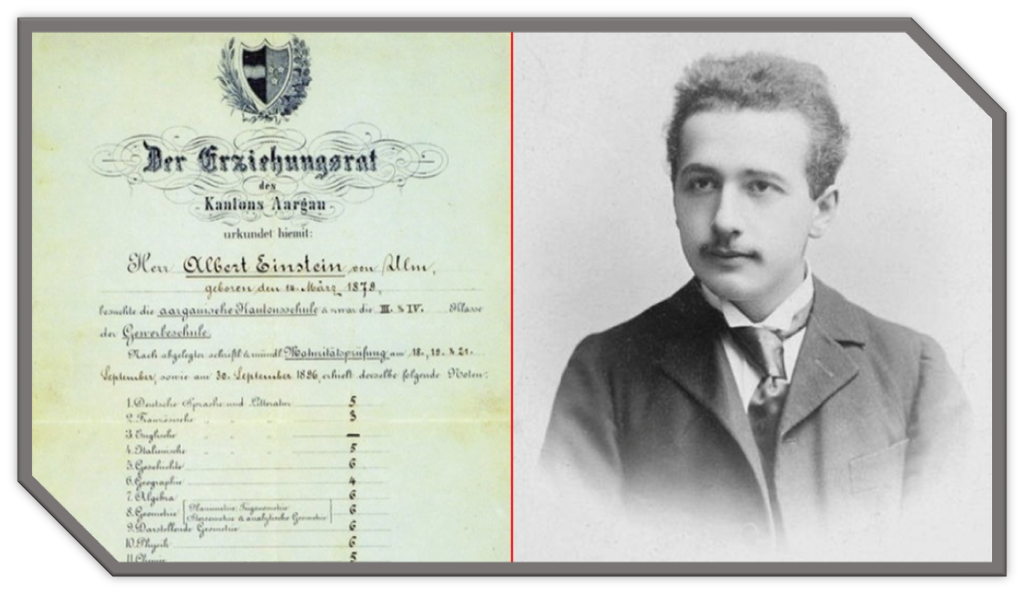
“Well, it’s up to you,” he said. “I doubt if it will come off, but I can see you’re not doing yourself or anyone else much good by staying here. How long would you like me to say you should stay away from school? Would six months be all right?” “This is very kind of you.” “It’s nothing. I’ve only just stopped being a student myself, so I know how you feel. Here you are.” Dr Weil handed him the certificate, “And the best of luck.” “How much…” “Nothing, if you have anything to spare, invite Yuri to a meal. He’s a good friend of mine, and yours too, I think,” Albert had no money to spare, but he pretended he had and took Yuri out to supper.
The doctor is still not convinced if the college idea would succeed but he is definitely convinced about the fact that Albert going to school is not doing anyone much good. Thus, he confirms if a six-month away from the school period would be enough to put his plans in place. Dr. Weil tells him that he understands the situation so well because he has just stopped being a student. He even refuses to take his fees and asks him to take Yuri for a meal. Filled with joy, Albert took Yuri out for supper even though he had no extra money.
“Isn’t it wonderful?” he said after showing Yuri the certificate. “Yes, it’s fine,” Yuri agreed. “Six months is a good period. This way you won’t actually be leaving the school so if the worst comes to the worst you’ll be able to come back and carry on for your diploma.” “I’ll never go back to that place,” Albert assured him. “I’m going to take this certificate to the headteacher tomorrow, and that will be the end of it.” “Don’t forget to get a reference in writing from your mathematics teacher first,” Yuri reminded him.
On seeing the certificate, Yuri assures him that six months is a good time period because just in case things go wrong, Albert could come back to finish his school diploma. Albert reassures Yuri that this is not going to happen because he is never going back to “that place” or school. He conveyed his idea of taking the certificate to the head of school the next day while Yuri reminded him to get the reference letter first from the mathematics teacher.
“I’m sorry you’re leaving us, although you’re wasting your time in my class,” he said. “It’s almost the only class where I’m not wasting my time,” said Albert. “But how did you know I’m leaving, sir?” “You wouldn’t have asked me for this reference otherwise.” “I thought you’d wonder…” “There’s nothing to wonder about, Einstein. I knew you were going to leave before you know yourself.” Albert was puzzled. What did the teacher mean? He soon found out. Before he had a chance to ask for an interview with the headteacher, he was summoned to the head’s room. “Well, it saves me the trouble of having to wait an hour or two outside,” he thought
The teacher expresses his displeasure about Albert leaving but again, he knew Albert was wasting his time there. Albert instantly corrected him by saying that Mr. Koch’s class was the only class where he was not wasting his time. Albert did not tell him anything about leaving but Mr. Koch could identify it long before Albert realized himself and also because of the referral. To his surprise, Albert was called into the head’s room. Although, he was not aware of the reason and he was himself going to make an appointment but he was happy that it saved him the trouble of waiting for one or two hours to meet him.
He hardly bothered to wonder why he had been sent for but vaguely supposed he was to be punished again for bad work and laziness. Well, he had finished with punishments.
Albert did not put much thought into why he was called into the office but somehow he knew it was to punish him for his poor performance and lack of interest. But now, he was done with all of it.
“I’m not going to punish you,” the headteacher said, to Albert’s surprise. “Your work is terrible, and I’m not prepared to have you here any longer, Einstein. I want you to leave the school now.” “Leave school now?” repeated Albert, dazed. “That is what I said.” “You mean,” said Albert, “that I am to be expelled?”
Word meaning
Expelled- officially make someone leave a school or any other organization
To his utmost surprise, Einstein was told that he was not going to be punished this time. The headmaster expressed that he is done with all his laziness and wishes to no longer have him there. Albert’s first thought was if he was being “expelled”.
You can take it that way if you wish, Einstein.” The headteacher was not mincing words. “The simplest thing will be for you to go of your own accord, and then the question won’t arise.” “But,” said Albert, “what crime have I committed?” “Your presence in the classroom makes it impossible for the teacher to teach and for the other pupils to learn. You refuse to learn, you are in constant rebellion, and no serious work can be done while you are there.” Albert felt the medical certificate almost burning a hole in his pocket. “I was going to leave, anyway,” he said. “Then we are in agreement at least, Einstein,” the head said.
Word meaning
Mincing words- to speak vaguely or indirectly
Rebellion- the action or process of resisting authority, control, or convention
The head of school was pretty serious and suggested that he left school on his own instead of being expelled because it would be easier for both parties. Albert still didn’t understand what “crime” he had committed. The headteacher explained how his presence is creating trouble for teachers to give lessons to other students and how no work can be done when he is around. While standing there, Albert felt the certificate was “burning a hole in his pocket” which means that the money he had spent on extracting the certificate (which was paid in terms of a meal with Yuri) had gone waste as the certificate was rendered useless. He was anyway being sent away from school. Regardless, Albert expresses that he was anyway going to leave to which the teacher replies that at least, for the first time, they are agreeing on something.
For a moment Albert was tempted to tell the man what he thought of him and of his school. Then he stopped himself. Without another word, holding his head high, he stalked out. “Shut the door after you!” shouted the head. Albert ignored him
Word meaning
Stalked out to leave (some place) in a haughty, stiff, or threatening manner
At that moment, Albert was being driven by his desire to tell the headteacher the truth and what he thought of the school, but somehow he managed to resist it because at last, his wish was fulfilled. He walked straight out of the school while ignoring the head teacher’s instructions with his head high.
He walked straight on, out of the school where he had spent five miserable years, without turning his head to give it a last look. He could not think of anyone he wanted to say goodbye to. Indeed, Yuri was almost the only person in Munich he felt like seeing before he left the town he had come to hate almost as much as the school. Elsa was back in Berlin, and he had no other real friends. “Goodbye —and good luck,” said Yuri when he left. “You are going to a wonderful country, I think. I hope you will be happier there.”
He did not even look back at the place where he had spent the most terrible years of his life. He had no real friends or close acquaintances to who he could bid adieu to. He met Yuri before leaving who wished him well and hoped he’d be happy in the country he was going to. Elsa was also back in Berlin with her family, thus, there was no one else he could say goodbye to.
Mother's Day
- Books Name
- (English) Hornbill & Snapshot Class-11
- Publication
- PathSet Publications
- Course
- CBSE Class 11
- Subject
- English
Mother’s Day
By J.B. Priestly

About The Author
J.B. Priestley was born on 13th September 1894 in the UK. He was an English novelist, playwright, screenwriter, etc. and his notable works are An Inspector Calls, Dangerous Corners When we are Married, etc. through this play, he wants the readers to understand how much a mother works for her family and still does not get any kind of respect and everybody wants her for granted.
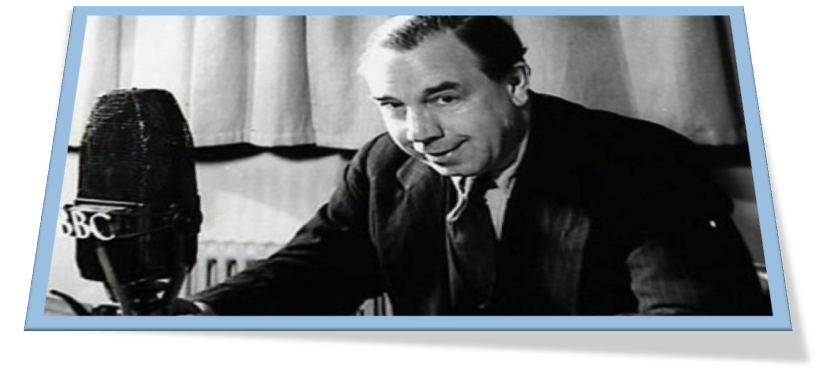
Introduction:
The play revolves around a mother who takes help from her friend to earn respect in her own family. The author brings out and tells that how a mother is not treated well by her husband and children and she has to take the help of a third person to earn what she deserves. With the help of her neighbor friend Mrs. Fitzgerald, she exchanges roles and stands up for her rights.
Summary :
Mrs. Annie Pearson and Mrs. Fitzgerald are neighbor friends but are very different in nature. Annie is a pleasant woman and she is in her forties. She looks a little bit nervous and despite taking care of her family, she didn’t get respect and love in return. On the other hand, her neighbor was a lady of a strong personality and broad-mindedness. She is older than Annie. Annie has a soft voice whereas Fitzgerald has a very heavy voice. Mrs. Fitzgerald has learned the art of fortune-telling from the east. And she advises Annie to be more specific with her family in terms of her rights and respect. She advises her to be the boss of the family and take command of the house. Annie was not treated well by her husband and her children. She was just working day and night like a servant of the family who does not get any pay for this 24 hrs service.
Mrs. Fitzgerald makes a plan to change her family’s attitude toward her. So, she suggested changing their personality by using a magic spell. She took Annie’s hand, spoke some magic spells, and exchanged their personality. Annie got scared a little bit but Fitzgerald told her that we exchange into our own later on. Now, Annie moves to Fitzgerald’s house and relaxes there. When her elder daughter entered the room she was left flabbergasted when she saw her mom playing cards and smoking. Dorris asked her for her yellow dress but she didn’t reply and continued in her own world. She then asked her to make tea. She also told her to iron her dress herself and make tea on her own. She also made fun of her boyfriend and left Dorris in tears. As soon as Cyril entered the house and demanded tea angrily. The mother does not respond and says she is not at all bothered to do so. Cyril replied that he cannot make it on his own so requested her, mother was not in a mood to do any work. Then Cyril asked for his clothes, that also she replied that she has not done her clothes ready. Cyril got angered and asked her for her behavior and tone. The mother replied that all three of them also talked with her in the same tone so now why they all are feeling bad. Further, she said that she has become a member of the union and gets what she deserves the best.
When Dorris enters wearing a shoulder strap, mother taunts her and both of them argue. Cyril was left shocked when her mother (Annie) demanded beer for a drink. He was not able to understand what was going on in the house that day. Now both Dorris and Cyril are left in shock and discuss her mother’s behavior. Both of them giggled in between the conversation when they thought about what will happen when their father will come. Dorris asked her about their fault and Annie said that she was hurt by the family’s behavior towards her. It bothered her the most. The family never asked her about her feelings or what she wants. They all are using her for their work and care. In return, she always does those things that are best for him. She told them that all of them get holidays and weekends to enjoy. But she continues her work seven days a week without even thinking about holidays and enjoyment. On top of it, the family is never grateful or thankful for her. They are always taking her for granted. Now, she also wanted to take off for two days. She also wished to go out as no one took her or asked her. Dorris was shocked when their mother asked for holidays on weekends.
When Mr. George entered and was annoyed with Annie as she was sipping beer. He was about 50 years old and considered him very important. He just told her that he will have supper at the club. The wife told that she has not made tea at all and to this George was annoyed as she was not bothered about him. After that, Annie retorts to him about why he goes daily to the club when everyone laughs at him. She told me that he was called Pompyompy Pearson at the club. George was shocked at her behavior and the tone she was using in front of her. So, he confirms her with his son, Cyril. Annie said that sometimes we have to be sadistic and hurt feelings only then the person realizes. On hearing a knock at the door, Annie told Cyril to open and let Mrs. Fitzgerald enter. Real Annie enters the house and finds that her daughter was crying very badly.
Mrs. Fitzgerald was scolding them in front of real Annie also. When George threatens her, she also retorts and threatens him that she will give a slap on her big fat face. Real Annie was feeling sad to see all this and wanted everyone to leave as she wanted to talk with Mrs. Fitzgerald (Annie). She told me that now she wants to be back at her place and stop this game at once. Mrs. Fitzgerald was herself ready and spelled her magic words again to exchange and get back their roles. They both were happy as they enjoyed the whole day. Mrs. Fitzgerald told Annie to be firm in her attitude like this only and do not care to make an apology or give justification for her behavior. After going back to her room when the family arrives she plans to play a game of rummy with them. She smiled and the family felt relaxed. The play ends on a happy note and Annie asked about what they would like to have for dinner. She also wants to have a conversation with her husband.
Mother’s Day Lesson Explanation
The following play is a humorous portrayal of the status of the mother in a family. Let’s read on to see how Mrs. Pearson’s family reacts when she tries to stand up for her rights.
Characters
MRS ANNIE PEARSON
GEORGE PEARSON
DORIS PEARSON
CYRIL PEARSON
MRS FITZGERALD

The action takes place in the living room of the Pearson's house in a London suburb.
Time: The Present
Scene: The living room of the Pearson family. Afternoon. It is a comfortably furnished, much lived-in room in a small suburban semi-detached villa. If necessary only one door needs are used, but it is better with two — one up left leading to the front door and the stairs and the other in the right wall leading to the kitchen and the back door. There can be a muslin-covered window in the left wall and possibly one in the right wall, too. The fireplace is assumed to be on the fourth wall. There is a settee upright, an armchair down left, and one downright. A small table with two chairs on either side of it stands at the center. When the curtain rises it is an afternoon in early autumn and the stage can be well lit. Mrs. Pearson at right, and Mrs. Fitzgerald at left, are sitting opposite each other at the small table, on which are two teacups and saucers and the cards with which Mrs. Fitzgerald has been telling Mrs. Pearson’s fortune. Mrs. Pearson is a pleasant but worried-looking woman in her forties. Mrs. Fitzgerald is older, heavier, and has a strong and sinister personality. She is smoking. It is very important that these two should have sharply contrasting voices —Mrs. Pearson speaking in a light, flurried sort of tone, with a touch of suburban Cockney perhaps; and Mrs. Fitzgerald with a deep voice, rather Irish perhaps.
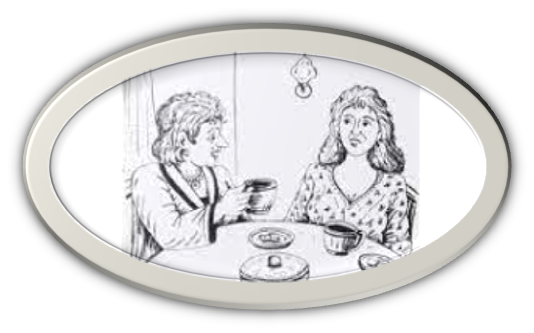
Mrs. FITZGERALD: [collecting up the cards] And that’s all I can tell you, Mrs. Pearson. Could be a good fortune. Could be a bad one. It all depends on yourself now. Make up your mind—and there it is.
The story begins with both Mrs. Pearson and Mrs. Fitzgerald sitting opposite each other at Mrs. Pearson’s place. Mrs. Fitzgerald is a fortune-teller and she has supposedly seen Mrs. Pearson’s fortune, thus, she continues to say that she has told her all that is within her capacity to tell. The same reading can work in a positive way if Mrs. Pearson’s actions are in sync with it or it could turn out to be bad too.
Mrs. PEARSON: Yes, thank you, Mrs. Fitzgerald. I’m much obliged, I’m sure. It’s wonderful having a real fortune-teller living next door. Did you learn that out East, too?
Mrs. Pearson expresses her gratitude towards Mrs. Fitzgerald for having seen her fortune and shares how great it is to have someone like her around. She then asks her if she (Mrs. Fitzgerald) has learned the art of fortune-telling from the East.
Mrs. FITZGERALD: I did. Twelve years I had of it, with my old man rising to be Lieutenant Quartermaster. He learned a lot, and I learned a lot more. But will you make up your mind now, Mrs. Pearson dear? Put your foot down, once an’ for all, an’ be the mistress of your own house an’ the boss of your own family.
Mrs. Fitzgerald answers that she did learn the art from the East for at least twelve years. While her father was climbing the ladder to becoming Lieutenant Quartermaster, she was learning this. She then motivates Mrs. Pearson to stand for herself and get the respect she deserves at her home.
Mrs. PEARSON: [smiling apologetically] that’s easier said than done. Besides I’m so fond of them even if they are so thoughtless and selfish. They don’t mean to be…
Word meaning -
Thoughtless- (of a person or their behavior) not showing consideration for the needs of other people
Here Mrs. Pearson replies to Mrs. Fitzgerald’s advice by telling her it’s far more difficult than it sounds. This is because she loves her family even if they ignore her needs. She loves to provide for them even if they are self-centered.
Mrs. FITZGERALD: [cutting in] maybe not. But it’d be better for them if they learned to treat you properly…
Mrs. Fitzgerald wants Mrs. Pearson to realize that it is not that difficult if she really tries. Moreover, she thinks it would add to their well-being as well if they behaved with love and respect with her
Mrs. PEARSON: Yes, I suppose it would, in a way.
Mrs. Pearson agrees with what Mrs. Fitzgerald has to say
Mrs. FITZGERALD: No doubt about it at all. Who’s the better for being spoilt—grown man, lad or girl? Nobody. You think it does ’em good when you run after them all the time, take their orders as if you were the servant in the house, stay at home every night while they go out enjoying themselves? Never in all your life. It’s the ruin of them as well as you. Husbands, sons, daughters should be taking notice of wives an’ mothers, not giving ’em orders an’ treating ’em like dirt. An’ don’t tell me you don’t know what I mean, for I know more than you’ve told me.
Mrs. Fitzgerald says they need to learn to treat Mrs. Pearson certainly. She further adds that none of them (husband, daughter and son) have turned out positively as a result of being spoiled by Mrs. Pearson. She enables her to see how running after them, handling their tantrums, doing all their tasks for them and staying home while they enjoy every night is harmful to Mrs. Pearson as well as her family. She explains how it should be the other way round; the family must treat wives and mothers with full respect and be after them instead of throwing orders. Mrs. Fitzgerald blatantly tells Mrs. Pearson not to act unknown as she is completely aware of the situation.
Mrs. PEARSON: [dubiously] I—keep dropping a hint…
Word meaning -
Dubiously- with hesitation or doubt
Mrs. Pearson hesitantly says that she often tries to give her and the family clues in between conversations
Mrs. FITZGERALD: Hint? It’s more than hints your family needs, Mrs. Pearson.
Mrs. Fitzgerald is trying to make her understand that it’s high time and Mrs. Pearson’s family should respect her now and that would require more than just clues. They need to be brought on track.
MRS PEARSON: [dubiously] I suppose it is. But I do hate any unpleasantness. And it’s so hard to know where to start. I keep making up my mind to have it out with them but somehow I don’t know how to begin. [She glances at her watch or at a clock] Oh —good gracious! Look at the time. Nothing ready and they’ll be home any minute and probably all in a hurry to go out again.
[As she is about to rise, Mrs. Fitzgerald reaches out across the table and pulls her down.]
Mrs. Pearson understands what Mrs. Fitzgerald is trying to say but she can’t stand giving them any discomfort. She wants to clear it out with her family and take her stand but she just doesn’t know how to take the first step. Just as she is saying this, she notices that it’s time for everyone to come back home. Immediately, she gets worried about how nothing is ready for them to come home to and they’ll probably have to rush out again. She tries to get up and make arrangements for her family, Mrs. Fitzgerald stops her from doing so.
Mrs. FITZGERALD: Let ’em wait or look after themselves for once. This is where your foot goes down. Start now. [She lights a cigarette from the one she has just finished.]
Very easily, while lighting another cigarette, she asks Mrs. Pearson to begin at the very moment. She tells her to stop providing for them all the time and let them experience what it feels like to do things on their own.
Mrs. PEARSON: [embarrassed] Mrs. Fitzgerald —I know you mean well —in fact, I agree with you—but I just can’t—and it’s no use you trying to make me. If I promise you I’d really have it out with them, I know I wouldn’t be able to keep my promise.
Even though in the hearts of hearts Mrs. Pearson knows that Mrs. Fitzgerald is right, she tells her that it is almost impossible for her to obey it. She feels that there is no point in giving a promise she won’t be able to keep.
Mrs. FITZGERALD: Then let me do it.
She asks Mrs. Pearson to let her do the hard part and teach Mrs. Pearson’s family a lesson.
Mrs. PEARSON: [flustered] Oh no—thank you very much, Mrs. Fitzgerald —but that wouldn’t do at all. It couldn’t possibly be somebody else — they’d resent it at once and wouldn’t listen— and really I couldn’t blame them. I know I ought to do it— but you see how it is? [She looks apologetically across the table, smiling rather miserably.]
Word meaning -
Flustered- agitated or confused
Resent- feel bitterness or indignation at a circumstance, action, or person
Mrs. Pearson tells her that she doesn’t think it’s a good idea. She says so because she knows that they might react to her changed behavior at first but then would ignore it and resort to their old ways. Also, Mrs. Pearson doesn’t blame them for this. She feels stuck because she knows it needs to be done but is unable to do it.
Mrs. FITZGERALD: [coolly] you haven’t got the idea.
She tells Mrs. Pearson that she has no idea how successful the idea can be
Mrs. PEARSON: [bewildered] Oh —I’m sorry—I thought you asked me to let you do it.
She thought that Mrs. Fitzgerald wanted to take her place in the house and be strict with her family.
Mrs. FITZGERALD: I did. But not as me— as you.
She affirms that she meant the same but she will not be taking her place as herself. She will become Mrs. Pearson and then do her part.
Mrs. PEARSON: But—I don’t understand. You couldn’t be me.
As confused as she can be at the moment, Mrs. Pearson asks Mrs. Fitzgerald to be a bit more elaborate.
Mrs. FITZGERALD: [coolly] we change places. Or — really — bodies. You look like me. I look like you.
She proposes that they switch their places or in other words, change bodies wherein Mrs. Fitzgerald will look like Mrs. Pearson and vice-versa.
Mrs. PEARSON: But that’s impossible.
A bit more confused and now even surprised, Mrs. Pearson expresses that this is something not possible.
Mrs. FITZGERALD: How do you know? Ever tried it?
Mrs. Fitzgerald questions her response by asking Mrs. Pearson if she has ever tried it.
Mrs. PEARSON: No, of course not…
Quite obviously, Mrs. Pearson had never attempted it
Mrs. FITZGERALD: [coolly] I have. Not for some time but it still ought to work. Won’t last long, but long enough for what we want to do. Learned it out East, of course, where they’re up to all these tricks. [She holds her hand out across the table, keeping the cigarette in her mouth] Gimme your hands, dear.
In a very relaxed tone, Mrs. Fitzgerald tells her that she has tried it before and even though it’s been long, the trick should work. Its effect will remain for a short period but enough for them to fulfill their motive. She further added while holding Mrs. Pearson’s hands, that she had acquired the trick from the East.
Mrs. PEARSON: [dubiously] well —I don’t know —is it right?
Still confused, Mrs. Pearson seeks assurance from Mrs. Fitzgerald.
Mrs. FITZGERALD: It’s your only chance. Give me your hands an’ keep quiet a minute. Just don’t think about anything. [Taking her hands] Now look at me. [They stare at each other. Muttering] Arshtatta dum—arshtatta lam—arshtatta lamdumbona… [This little scene should be acted very carefully. We are to assume that the personalities change bodies. After the spell has been spoken, both women, still grasping hands, go lax, as if the life were out of them. Then both come to life, but with the personality of the other. Each must try to adopt the voice and mannerisms of the other. So now Mrs. Pearson is bold and dominating and Mrs. Fitzgerald is nervous and fluttering.]
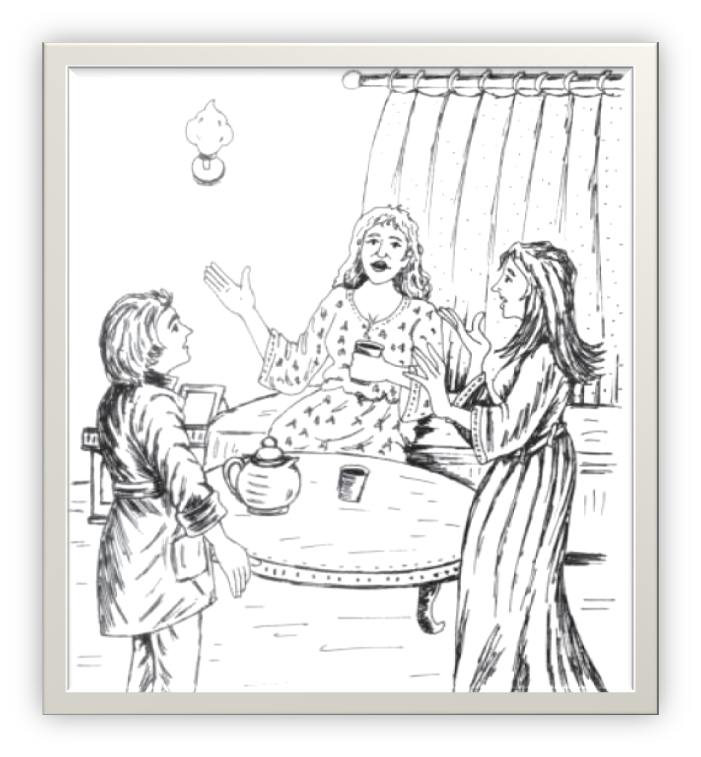
Well, Mrs. Fitzgerald makes her aware that she has no other option while holding her hands. She gives Mrs. Pearson a few simple instructions in the process of transmission and says a few words in her mouth. Once she has whispered the spell, both of their bodies become lifeless for a moment while they are still holding each other’s hands. As they both come back to life, they try to imitate each other. Mrs. Fitzgerald is now a bit shy and Mrs. Pearson has become unafraid.
Mrs. PEARSON: [now with Mrs. Fitzgerald’s personality] see what I mean, dear? [She notices the cigarette] Here—you don’t want that. [She snatches it and puts it in her own mouth, puffing contentedly.]
The personalities have now been switched and with this, the transmission process is complete. While snatching away the cigarette from Mrs. Fitzgerald’s hand (who is now Mrs. Pearson), she is confident about the success of her trick.
[Mrs. Fitzgerald, now with Mrs. Pearson’s personality, looks down at herself and sees that her body has changed and gives a scream of fright.]
Mrs. Fitzgerald (who is now Mrs. Pearson) looks at herself and she is shocked to see herself in the body of Mrs. Fitzgerald. Thus, she screams with fright.
Mrs. FITZGERALD: [with Mrs. Pearson’s personality] oh —it’s happened.
Mrs. Fitzgerald, still in shock, now believes that it is possible and their bodies have actually changed
Mrs. PEARSON: [complacently] Of course it’s happened. Very neat. Didn’t know I had it in me.
Word meaning -
Complacently- showing smug or uncritical satisfaction with oneself or one’s achievements
Very proudly, Mrs. Pearson affirms and thinks to herself that she was unsure if she still had the ability to do the magic
Mrs. FITZGERALD: [alarmed] But whatever shall I do, Mrs. Fitzgerald? George and the children can’t see me like this.
Still unclear about her idea, Mrs. Pearson (now in the body of Mrs. Fitzgerald) is worried that her family can’t see her in the body of Mrs. Fitzgerald
Mrs. PEARSON: [grimly] they aren’t going to — that’s the point. They’ll have me to deal with —only they won’t know it.
Word meaning -
Grimly- bitter, hard manner
She very harshly tells worried Mrs. Pearson that her family will face Mrs. Fitzgerald who is now in her body. The secret is only theirs and the family will not know anything about it.
Mrs. FITZGERALD: [still alarmed] But what if we can’t change back? It’d be terrible.
She is still frightened about the consequences and is worried about not being able to reverse the magic.
Mrs. PEARSON: Here—steady, Mrs. Pearson —if you had to live my life it wouldn’t be so bad. You’d have more fun as me than you’ve had as you.
In an attempt to comfort her, she tells the real Mrs. Pearson that she would anyway have more privilege and fun being Mrs. Fitzgerald while living her life.
Mrs. FITZGERALD: Yes—but I don’t want to be anybody else…
Still worried, she tells her that she wants to live as herself only and not like somebody else
Mrs. PEARSON: Now —stop worrying. It’s easier changing back —I can do it any time we want…
She comforts her by telling her that there is nothing to worry about and that she will reverse it whenever Mrs. Pearson wants
Mrs. FITZGERALD: Well—do it now…
Mrs. PEARSON: Not likely. I’ve got to deal with your family first. That’s the idea, isn’t it? Didn’t know how to begin with ‘em, you said. Well. I’ll show you.
Mrs. Pearson wants to get back in her body while Mrs. Fitzgerald is strong of the opinion that she should deal with the family first. Mrs. Pearson didn’t know where to begin from, so Mrs. Fitzgerald would do it for her.
Mrs. FITZGERALD: But what am I going to do?
She asks what she should do in the meantime.
Mrs. PEARSON: Go into my house for a bit—there’s nobody there— then pop back and see how we’re doing. You ought to enjoy it. Better get off now before one of ’em comes.
She instructs her to go to Mrs. Fitzgerald’s house which is vacant for now. She could visit in a while to see the progress but till then, she is supposed to take pleasure in the process. She then tells her to go before someone sees her.
Mrs. FITZGERALD: [nervously rising] Yes —I suppose that’s best. You’re sure it’ll be all right?
Realizing that this is happening, the now Mrs. Fitzgerald gets up to leave and confirms once again if all is going to work
Mrs. PEARSON: [chuckling] It’ll be wonderful. Now off you go, dear. [Mrs. Fitzgerald crosses and hurries out through the door right. Left to herself, Mrs. Pearson smokes away — lighting another cigarette — and begins laying out the cards for patience on the table. After a few moments, Doris Pearson comes bursting in left. She is a pretty girl in her early twenties, who would be pleasant enough if she had not been spoilt.]
Word meaning -
Chuckling- laugh quietly or inwardly
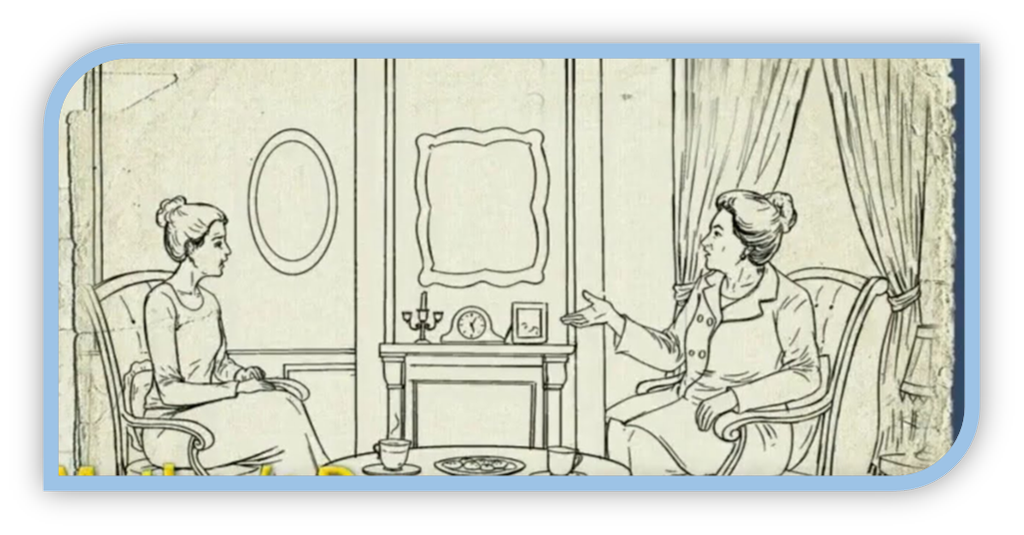
Mrs. Pearson reassures her and tells her to leave. While Mrs. Fitzgerald leaves, Mrs. Pearson attempts to make herself comfortable by lighting another cigarette and sorting her cards. After a while, Doris Pearson, a girl of about twenty or so enters. She is the daughter of Mrs. Pearson and had the potential of turning out well hadn’t she been over-pampered.
DORIS: [before she has taken anything in] Mum— you’ll have to iron my yellow silk. I must wear it tonight. [She now sees what is happening, and is astounded.] What are you doing? [She moves down left-center.]
Word meaning -
Astounded- shock or greatly surprise
Without noticing, Doris instructs her mom to iron her yellow silk dress as she is supposed to go out that night. As soon as she notices her mom, she is left startled and goes towards her.
[Mrs. Pearson now uses her ordinary voice, but her manner is not fluttering and apologetic but cool and incisive.]
MRS PEARSON: [not even looking up] what d’you think I’m doing—whitewashing the ceiling?
Word meaning -
Fluttering- trembling
Incisive- intelligently analytical and clear thinking
As she is about to speak, she uses her normally calm voice instead of the usual regretful and shaky voice. She looks at her and sarcastically asks her what according to her was she doing. Does it look like she is painting the ceiling?
DORIS: [still astounded] But you’re smoking!
She points out that her mother is smoking. The fact that she is so shocked highlights that Mrs. Pearson isn’t usually seen smoking.
MRS PEARSON: That’s right, dear. No law against it, is there?
Again in a very calm manner, Mrs. Pearson replies that she saw it right and tells her that apparently, there is no law against smoking.
DORIS: But I thought you didn’t smoke.
She is shocked because she thought Mrs. Pearson doesn’t smoke.
MRS PEARSON: Then you thought wrong.
She bluntly replies to Doris that she was wrong.
DORIS: Are we having tea in the kitchen?
Doris asks Mrs. Pearson if the tea is ready for her in the kitchen.
MRS PEARSON: Have it where you like, dear.
She tells her that she can have it wherever she wants
DORIS: [angrily] Do you mean it isn’t ready?
Annoyed, she asks if Mrs. Pearson is indicating that the tea is not ready.
MRS PEARSON: Yours isn’t. I’ve had all I want. Might go out later and get a square meal at the Clarendon.
Mrs. Pearson replies that she has had all the tea she wanted and there is none ready for Doris. She then shares that she might go out for a meal at the Clarendon.
DORIS: [hardly believing her ears] who might?
A bit more shocked, she asks Mrs. Pearson, who would go out for a meal?
MRS PEARSON: I might. Who d’you think?
Mrs. Pearson again tells her that she might go out for a meal. She is talking about herself only
DORIS: [staring at her] Mum —what’s the matter with you?
Doris senses that there is something wrong and asks Mrs. Pearson what’s gotten into her
MRS PEARSON: Don’t be silly.
DORIS: [indignantly] It’s not me that’s being silly— and I must say it’s a bit much when I’ve been working hard all day and you can’t even bother to get my tea ready. Did you hear what I said about my yellow silk?
Word meaning -
Indignantly - in a manner indicating anger or annoyance at something perceived as unfair
Thinking that it’s unfair to her, she exclaims that she is not being foolish. She thinks that it is hard to take that she has been working hard and when she comes home tired, she cannot even expect a cup of tea. She then asks Mrs. Pearson if she heard the instructions about her yellow silk
MRS PEARSON: No. Don’t you like it now? I never did.
Mrs. Pearson refuses to have heard anything about her dress. She asks Doris if she now likes being treated like how they have been treating Mrs. Pearson.
DORIS: [indignantly] Of course I like it. And I’m going to wear it tonight. So I want it ironed.
Rudely, she tells Mrs. Pearson that she has no problem with it and that she wants her yellow dress ironed so that she can wear it
MRS PEARSON: Want it ironed? What d’you think it’s going to do—iron itself?
Mrs. Pearson asks Doris what she means when she says she wants the dress “ironed” because the dress isn’t going to get ironed itself.
DORIS: No, you’re going to iron it for me… You always do.
Doris tells her that she wants Mrs. Pearson to do it like she always does.
MRS PEARSON: Well, this time I don’t. And don’t talk rubbish to me about working hard. I have a good idea how much you do, Doris Pearson. I put in twice the hours you do, and get no wages nor thanks for it. Why are you going to wear your yellow silk? Where are you going?
Mrs. Pearson refuses to iron her dress this time and tells her not to brag about the long hours she works for because Mrs. Pearson herself works twice the hours as Doris and has never once complained in her life, nor has she been thanked for it. She doesn’t even get paid. She then asks Doris where she is supposed to go that night.
DORIS: [sulkily] out with Charlie Spence.
Word meaning -
Sulkily- a disagreeable mood
She replies that she is supposed to go out for dinner with Charlie Spence.
MRS PEARSON: Why?
She asks Doris on what occasion is she going out with Charlie
DORIS: [wildly] Why? Why? What’s the matter with you? Why shouldn’t I go out with Charlie Spence if he asks me and I want to? Any objections? Go on —you might as well tell me…
She gets further annoyed and tells her that Charlie has asked her out and she wants to go. She irritably asks Mrs. Pearson if she objects to that too, if yes, she might as well spit it out. Doris doesn’t understand what has gotten into her mother as she has been acting weirdly.
MRS PEARSON: [severely] can’t you find anybody better? I wouldn’t be seen dead with Charlie Spence. Buck teeth and half-witted…
Mrs. Pearson asks her very seriously if she could find anyone better than Charlie Spence. She thinks he doesn’t look that nice and is also not very intelligent.
DORIS: He isn’t…
She tries to defend Charlie Spence
MRS PEARSON: When I was your age I’d have found somebody better than Charlie Spence—or given myself up as a bad job.
Mrs. Pearson brags that she would have done a better job at finding a good boy, someone who must have been better than Charlie Spence. Had she failed at doing so, she would have given up finding anyone declaring that she is bad at it.
DORIS: [nearly in tears] Oh —shut up!
Almost crying, she asks Mrs. Pearson to stop picking at her
[Doris runs out left. Mrs. Pearson chuckles and begins putting the cards together. After a moment Cyril Pearson enters left. He is the masculine counterpart of Doris.]
CYRIL: [briskly] Hello—Mum. Is tea ready?
Word meaning -
Briskly- in an active, quick, or energetic way
Cyril, Mrs. Pearson’s son asks her if the tea is made as soon as he reaches home.
MRS PEARSON: No.
CYRIL: [moving to the table; annoyed] Why not?
Mrs. Pearson tells him that the tea is not ready which annoys him and thus, he moves towards the table asking her the reason behind the tea being not made.
MRS PEARSON: [coolly] I couldn’t bother.
CYRIL: Feeling off-color or something?
Mrs. Pearson tells him in a very relaxed way that she didn’t bother making tea for him. Cyril, out of concern asks if all is good with her.
MRS PEARSON: Never felt better in my life.
Being all chilled out, she conveys that she is feeling her best
CYRIL: [aggressively] what’s the idea then?
On hearing her reply, he turns argumentative and asks her to explain
MRS PEARSON: Just a change.
Mrs. Pearson says the tea is not ready just to break the monotony
CYRIL: [briskly] well, snap out of it, Ma—and get cracking. Haven’t too much time. [Cyril is about to go when Mrs. Pearson’s voice checks him.]
Word meaning -
Briskly- In an active, quick, or energetic way
Cracking- fast
He tells her to stop resting and make tea for him in a commanding tone. He tells her that he is in a hurry like usual.
MRS PEARSON: I’ve plenty of time.
As Cyril is about to leave, Mrs. Pearson stops him and says that he might be in a hurry but she is all relaxed because she has plenty of time.
CYRIL: Yes, but I haven’t. Got a busy night tonight. [Moving left to the door] Did you put my things out?
Cyril, being a spoiled child, replies that he is short of time and it is going to be a long night. He asks Mrs. Pearson if all his things are ready.
MRS PEARSON: [coolly] can’t remember. But I doubt it.
In a very chilled-out manner, she says she can’t recall taking them out, probably because she didn’t take them out.
CYRIL: [moving to the table; protesting] Now —look. When I asked you this morning, you promised. You said you’d have to look through ‘em first in case there was any mending.
In an attempt to raise an objection, Cyril moves towards Mrs. Pearson and reminds her that she promised him to keep them ready. She even committed to fixing them in case they needed any repairs.
MRS PEARSON: Yes — well now I’ve decided I don’t like mending.
Mrs. Pearson says that she has now changed her mind because she has realized that she doesn’t like sewing (or fixing)
CYRIL: That’s a nice way to talk — what would happen if we all talked like that?
He objects to Mrs. Pearson’s way of speaking and asks her how she would feel if all of them talked to her like that.
MRS PEARSON: You all do talk like that. If there’s something at home you don’t want to do, you don’t do it. If it’s something at your work, you get the Union to bar it. Now all that’s happened is that I’ve joined the movement.
Mrs. Pearson clarifies that they already talk to her in an objectionable tone. They do what they want and leave what they don’t. At home, they have been given this privilege, and is the situation in the office where if they do not like something, they get the Union to interfere. She mentions that what has now changed is that she has started acting the same way where she won’t do what she doesn’t want to.
CYRIL: [staggered] I don’t get this, Mum. What’s going on?
Word meaning -
Staggered- astonish or deeply shock
Deeply shocked by his mom’s reply, he attempts to know what the matter is
MRS PEARSON: [laconic and sinister] Changes.
Word meaning -
Laconic- using very few words
Sinister- giving the impression that something harmful or evil is happening or will happen
Choosing not to speak a lot, she implies that things are going to change from now on
[Doris enters left. She is in the process of dressing and is now wearing a wrap. She looks pale and red-eyed.]
MRS PEARSON: You look terrible. I wouldn’t wear that face even for Charlie Spence.
Doris appears on the scene with her eyes turned red and her face, white. Mrs. Pearson asks her what’s wrong and how would she go with Charlie Spence with this face.
DORIS: [moving above the table; angrily] Oh —shut up about Charlie Spence. And anyhow I’m not ready yet—just dressing. And if I do look terrible, it’s your fault—you made me cry.
All steamed up, Doris tells her mom to hold her tongue about Charlie Spence. She further adds that she is not yet ready and the reason behind her awful look is that she has been crying after talking to Mrs. Pearson.
CYRIL: [curious] Why— what did she do?
Cyril interrupts and interrogates as to what did their mother do
DORIS: Never you mind.
Doris tells her brother to stay out of it.
MRS PEARSON: [rising and preparing to move to the kitchen] Have we any stout left? I can’t remember.
Word meaning -
Stout- a kind of strong, dark beer brewed with roasted malt or barley
Paying as much less attention as one could, Mrs. Pearson gets up to go to the kitchen while asking for stout.
CYRIL: Bottle or two, I think. But you don’t want stout now.
Cyril recalls that there might be one or two bottles of it left but tells her in a weird tone that after all this mess, she doesn’t need stout
MRS PEARSON: [moving left slowly] I do.
She makes it clear that she wants stout at the moment
CYRIL: What for?
Cyril asks her why she needs to have stout.
MRS PEARSON: [turning at the door] to drink —you clot!
Word meaning -
Clot- a foolish or clumsy person
Mrs. Pearson calls Cyril foolish for asking her such a question
[Mrs. Pearson exits right. Instantly Cyril and Doris are in a huddle, close together at left centre, rapidly whispering.]
DORIS: Has she been like that with you, too?
As soon as Mrs Pearson leaves, the siblings get together to discuss the matter behind her back. Doris asks her brother if their mom has been behaving weird with him as well.
CYRIL: Yes—no tea ready—couldn’t care less…
Cyril tells Doris that she has been behaving like that with him too. She didn’t even make tea for him.
DORIS: Well, I’m glad it’s both of us. I thought I’d done something wrong.
Doris is relieved to hear that they both are in the same boat because she feared it is her who had hurt Mrs Pearson in some way.
CYRIL: So did I. But it’s her of course…
Cyril expresses that he thought the same but actually, it’s Mrs. Pearson has been behaving oddly.
DORIS: She was smoking and playing cards when I came in. I couldn’t believe my eyes.
Doris tells Cyril how shocked she was on seeing her mom smoking and playing cards when she came home from work.
CYRIL: I asked her if she was feeling off-color and she said she wasn’t.
Cyril tell her that he even asked her if she was feeling unwell but she said she had never felt better
DORIS: Well, she’s suddenly all different. An’ that’s what made me cry. It wasn’t what she said but the way she said it— an’ the way she looked.
She is amazed by the difference in her. She tells Cyril that it’s not her words that hurt her, but the look in her eyes that made her cry.
CYRIL: Haven’t noticed that. She looks just the same to me.
He mentions that he hadn’t noticed any change in her appearance.
DORIS: She doesn’t to me. Do you think she could have hit her head or something—y’know — an’ got—what is it?—y’know…
Doris suspects that Mrs. Pearson might have hit her head somewhere and got herself hurt
CYRIL: [staggered] Do you mean she’s barmy?
Word meaning -
Barmy- mad; crazy
Amazed, he asks Doris if she means that their mother has gone crazy.
DORIS: No, you fathead. Y’know —concussion. She might have.
Word meaning -
Fathead- a stupid person
Concussion- a violent shock as from a heavy blow
Doris suggests that she might be in shock after having hit her head somewhere.
CYRIL: Sounds far-fetched.
Word meaning -
Far-fetched- unlikely and unconvincing; implausible
Cyril thinks that Doris is not being reasonable.
DORIS: Well, she’s far-fetched, if you ask me. [She suddenly begins to giggle.]
With light-hearted laughter, Doris comments that she is finding her mother to be irrational at the moment
CYRIL: Now then —what is it?
Cyril asks her what she means.
DORIS: If she’s going to be like this when Dad comes home… [She giggles again.]
Doris indicates what’s going to happen when their father sees Mrs. Pearson behave this way
CYRIL: [beginning to guffaw] I’m staying in for that-two front dress circles for the first house…
Word meaning -
Guffaw- a loud and hearty laugh
Cyril makes fun of what is going to happen in that case and jokes about it while saying that he is even willing to stay at home for seeing that.
[Mrs Pearson enters right, carrying a bottle of stout and a half-filled glass. Cyril and Doris try to stop their guffawing and giggling, but they are not quick enough. Mrs Pearson regards them with contempt.]
MRS PEARSON [coldly] you two are always talking about being grown-up —why don’t you both try for once to be your age? [She moves to the settee and sits.]
Word meaning -
Contempt- the feeling that a person or a thing is worthless or beneath consideration
Settee- long upholstered seat for more than one person, typically with a back and arms
While the siblings were talking, Mrs. Pearson enters the room with stout. They failed at controlling their laughter and Mrs Pearson ridicules them. While moving towards a settee, she talks about how both of them regard themselves as mature and asks them to behave and be responsible like people of their age.
CYRIL: Can’t we laugh now?
Cyril asks Mrs. Pearson if she now has an objection to their laughing.
MRS PEARSON Yes, if it’s funny. Go on, tell me. Make me laugh. I could do with it.
She replies that she has no problem with them laughing at something which is funny. She asks them to make her laugh as well by telling her what they were talking about
DORIS: Y’know you never understand our jokes, Mum…
Doris undermines Mrs. Pearson’s ability to understand their jokes
MRS PEARSON: I was yawning at your jokes before you were born, Doris.
Mrs. Pearson replies in an equally mean tone indicating how boring their jokes usually are
DORIS: [almost tearful again] what’s making you talk like this? What have we done?
Doris, who is not used to Mrs Pearson talking to them in such a manner, asks her the reason behind her behaviour. She is just about to cry once again and asks what they have done to deserve this.
MRS PEARSON: [promptly] nothing but come in, ask for something, go out again, then come back when there’s nowhere else to go.
She mentions that they haven’t done much except barging in whenever they want and going out as per their convenience. In between, all they do is make her work all the time and when they have no other place to go, they come back home.
CYRIL: [aggressively] Look —if you won’t get tea ready, then I’ll find something to eat myself…
Cyril gets angry and hyper while telling Mrs. Pearson that if she doesn’t get the tea ready, he will find something to eat by himself
MRS PEARSON: Why not? Help yourself. [She takes a sip of stout.]
Mrs. Pearson asks him to go ahead and find something for himself to eat while sipping stout.
CYRIL: [turning on his way to the kitchen] Mind you, I think it’s a bit thick. I’ve been working all day.
While going to the kitchen, he attempts to make Mrs. Pearson feel obligated to prepare for him as he had been working all day.
DORIS: Same here.
Doris agrees with Cyril.
MRS PEARSON: (calmly) Eight hour day!
Mrs Pearson (actually Mrs Fitzgerald) did not lose her cool and tells them that they work only an eight hour shift a day.
CYRIL: Yes— eight hour day —an’ don’t forget it.
Cyril exaggerates upon his eight hour shift.
MRS PEARSON: I’ve done my eight hours.
She lets them know that she has also completed her eight hour shift of doing their work and handling their tantrums.
CYRIL: That’s different.
DORIS: Of course it is.
They both argue that Mrs Pearson’s eight hour work is nowhere compared to theirs.
MRS PEARSON: [calmly] It was. Now it isn’t. Forty-hour week for all now. Just watch it at the weekend when I have my two days off. [Doris and Cyril exchange alarmed glances. Then they stare at Mrs. Pearson who returns their look calmly.]
Without losing her cool, she warns them that everything is going to change from now. She will only work for forty hours a week just like all of them and tells them to wait and watch when she takes her weekend off. Doris and Cyril gets shocked while Mrs Pearson maintains her calm look.
CYRIL: Must grab something to eat. Looks as if I’ll need to keep my strength up. [Cyril exits to the kitchen.]
Cyril exits to find something to eat in the kitchen. He feels it’s necessary as he would require the strength to face all of this.
DORIS: [moving to the settee; anxiously] Mummy, you don’t mean you’re not going to do anything on Saturday and Sunday?
Doris, still amazed at what Mrs Pearson said before, confirms if she was joking about it or not.
MRS PEARSON: [airily] No, I wouldn’t go that far. I might make a bed or two and do a bit of cooking as a favour. This means, of course, I’ll have to be asked very nicely and thanked for everything and generally made a fuss of. But any of you forty-hour-a-weekers who expect to be waited on hand and foot on Saturday and Sunday, with no thanks for it, are in for a nasty disappointment. Might go off for the weekend perhaps.
Word meaning -
Nasty- very bad or unpleasant
She explains that she might do a few petty tasks if she is pleasantly asked to do so and is duly thanked for performing them as well. She warns her that if any of her family members who work for only 8 hours a day and keep blabbering about it expect her to perform all their tasks, then they are going to be let down this time. She even mentions that she could go for a vacation as well.
DORIS: [aghast] Go off for the week-end?
Word meaning -
Aghast- filled with horror or shock
More shocked, she couldn’t believe when Mrs. Pearson said that she might go on a vacation this weekend
MRS PEARSON: Why not? I could do with a change. Stuck here day after day, week after week. If I don’t need a change, who does?
Mrs. Pearson replies that she out of all, deserves to take a break as she works day and night continuously.
DORIS: But where would you go, who would you go with?
Doris is confused as to where she would go and with whom.
MRS PEARSON: That’s my business. You don’t ask me where you should go and who you should go with, do you?
Mrs Pearson expresses that Doris has no business asking her all this because she never asks Doris the same stuff.
DORIS: That’s different.
Doris tells her that what she does is not the same.
MRS PEARSON: The only difference is that I’m a lot older and better able to look after myself, so it’s you who should do the asking.
Mrs. Pearson clarifies that she is older than Doris and is in a better position to take care of herself, so it would make sense if Doris would take permission from Mrs. Pearson and not the other way round.
DORIS: Did you fall or hit yourself with something?
Doris finally asks Mrs. Pearson if she hit herself and got a concussion or something.
MRS PEARSON: [coldly] No. But I’ll hit you with something, girl if you don’t stop asking silly questions.
Bluntly, she replies that she is completely fine but if Doris doesn’t stop talking, then she might hit her with something for sure.
[Doris stares at her open-mouthed, ready to cry.]
DORIS: Oh —this is awful… [She begins to cry, not passionately.]
Almost about to cry, she expresses how disheartening it is to go through all this and while she says it, she bursts into tears.
MRS PEARSON: [coldly] stop blubbering. You’re not a baby. If you’re old enough to go out with Charlie Spence, you’re old enough to behave properly. Now stop it.
Mrs Pearson asks Doris to stop acting like a child. She bluntly says that if she considers herself mature enough to go out with Charlie Spence, she should act properly at home as well.
[George Pearson enters left. He is about fifty, fundamentally decent but solemn, self-important, pompous. Preferably he should be a heavy, slow-moving type. He notices Doris’s tears.]
GEORGE: Hello—what’s this? Can’t be anything to cry about.
Word meaning -
Solemn- formal and dignified; characterized by deep sincerity
Pompous- affectedly grand, solemn, or self-important
As they are talking, George Pearson, Mrs Pearson’s husband enters. He is a man in his fifties who is characterized by deep sincerity but is self-assertive. As one can infer, he must be a healthy man who moves at a slow pace. As he enters, he notices that Doris is crying. He asks her what’s the matter and is sure the matter won’t be worthy of crying.
DORIS: [through sobs] you’ll see. [Doris runs out left with a sob or two on the way. George stares after her a moment, then looks at Mrs. Pearson.]
Doris tells her father to wait and observe while she is crying and runs out of the scene.
GEORGE: Did she say ‘You’ll see’…?
George Pearson is left amazed at how she ran and what she said.
MRS PEARSON: Yes.
Mrs. Pearson replies to George’s rhetorical question.
GEORGE: What did she mean?
He is still confused about what is going on
MRS PEARSON: Better ask her.
Mrs Pearson advises him to ask Doris what she meant.
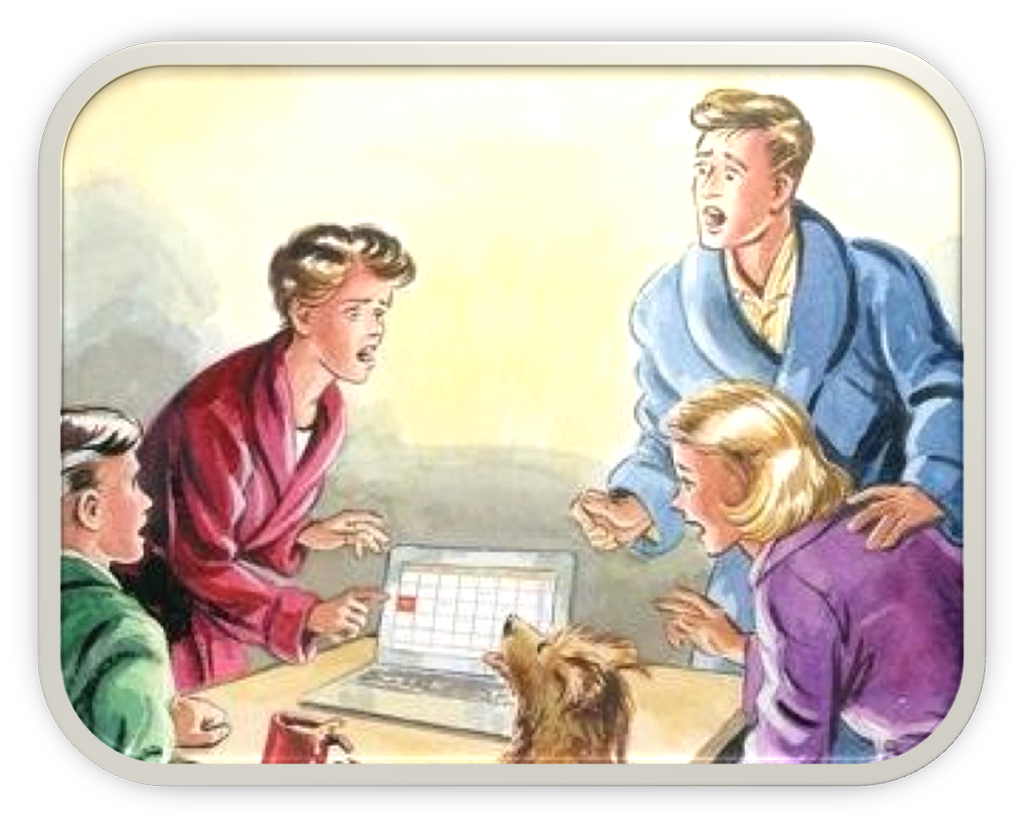
[George looks slowly again at the door then at Mrs Pearson. Then he notices the stout that Mrs. Pearson raises for another sip. His eyes almost bulge.]
GEORGE: Stout?
As Mrs. Pearson raised her glass to sip her stout, George gets even more shocked.
MRS PEARSON: Yes.
Mrs. Pearson lets him know that he saw right.
GEORGE: [amazed] what are you drinking stout for?
Still amazed, he asks the reason behind her drinking.
MRS PEARSON: Because I fancied some.
Still maintaining her calm, she simply replies by saying that she is drinking it because she wanted to.
GEORGE: At this time of day?
He is shocked at the sight of Mrs. Pearson drinking and that too during the day.
MRS PEARSON: Yes—what’s wrong with it at this time of day?
She counter-questions and asks what is the problem with drinking at this time of the day.
GEORGE: [bewildered] Nothing, I suppose, Annie — but I’ve never seen you do it before…
Word meaning -
Bewildered- perplexed and confused; very puzzled
He explains that he is so shocked because Mrs. Pearson had never been seen day drinking
MRS PEARSON: Well, you’re seeing me now.
She tells him that there is nothing to be shocked about. If he hadn’t seen her do it till date, he is seeing her do it now.
GEORGE: [with heavy distaste] Yes, an’ I don’t like it. It doesn’t look right. I’m surprised at you.
In contempt, he tells Mrs. Pearson that he didn’t like the idea of her drinking at this hour. It blew his mind at once.
MRS PEARSON: Well, that ought to be a nice change for you.
Responding to his reaction, she says that it could be a nice change for him.
GEORGE: What do you mean?
He did not understand what she was trying to say.
MRS PEARSON: It must be some time since you were surprised at me, George.
She explains that it’s been a long time since she amazed him.
GEORGE: I don’t like surprises—I’m all for a steady-going on —you ought to know that by this time. By the way, I forgot to tell you this morning I wouldn’t want any tea. Special snooker match night at the club tonight— an’ a bit of supper going. So no tea.
Snooker- a game played with cues on a billiard table in which the players use a cue ball (white) to pocket the other balls (fifteen red and six coloured) in a set order
He tells her how he doesn’t appreciate change or surprises and this is something Mrs Pearson should know by now. He then changes the topic by telling Mrs Pearson that he forgot to tell her about the Special snooker match and the supper. Also, he won’t be needing any tea that afternoon.
MRS PEARSON: That’s all right. There isn’t any.
She tells him that there isn’t any tea made, so it’s fine even if he forgot to convey.
GEORGE: [astonished] you mean you didn’t get any ready?
Shocked at her reply, he asks Mrs Pearson what she just told him.
MRS PEARSON: Yes. And a good thing, too, as it’s turned out.
Mrs. Pearson replies and says that it has turned out to be well because he didn’t need any tea.
GEORGE: [aggrieved] that’s all very well, but suppose I’d wanted some?
He asks Mrs. Pearson what if he wanted some.
MRS PEARSON: My goodness! Listen to the man! Annoyed because I don’t get a tea for him that he doesn’t even want. Ever tried that at the club?
Mrs Pearson expresses her bafflement at the fact that George Pearson is angry that the tea he didn’t want is not made. She suggests that he should try this behavior at the club sometime.
GEORGE: Tried what at the club?
He is not sure as to what Mrs. Pearson is telling him to try at the club.
MRS PEARSON: Going up to the bar and telling ’em you don’t want a glass of beer but you’re annoyed because they haven’t already poured it out. Try that on them and see what you get.
She explains the tea situation in context of the club where he goes to the bar to tell them that he doesn’t want a beer and then he gets mad at them because they hadn’t already poured some for him. She suggests that he try and see their reaction.
GEORGE: I don’t know what you’re talking about.
He pretends to not have understood what Mrs. Pearson just said.
MRS PEARSON: They’d laugh at you even more than they do now.
Mrs Pearson says that the people at the club would make fun of him, even more than they did.
GEORGE: [indignantly] laugh at me? They don’t laugh at me.
Word meaning -
Indignantly - in a manner indicating anger or annoyance at something perceived as unfair.
He gets irritated when Mrs Pearson says that and tells her that they don’t make fun of him.
MRS PEARSON: Of course they do. You ought to have found that out by this time. Anybody else would have done. You’re one of their standing jokes. Famous. They call you Pompy-ompy Pearson because they think you’re so slow and pompous.
Word meaning -
Pompous- self-important or overbearing
Mrs. Pearson tells him that he should have known this by now. If there would have been someone else in his place, they would have known by now. She also tells him that he is famously made fun about at the club and they call him “Pompy-ompy Pearson” because they think he is self-absorbed and overbearing.
GEORGE: [horrified] Never!
George is horrified at her words and denies it.
MRS PEARSON: It’s always beaten me why you should want to spend so much time at a place where they’re always laughing at you behind your back and calling you names. Leaving your wife at home, night after night. Instead of going out with her, who doesn’t make you look a fool…
Mrs Pearson expresses how hurtful it has been for her seeing her husband leaving her and wanting to go to a place where people make fun of him behind his back. She further adds that he does it every night instead of going out with Mrs Pearson who doesn’t at least make him look like a fool.
[Cyril enters right, with a glass of milk in one hand and a thick slice of cake in the other. George, almost dazed, turns to him appealingly.]
Cyril enters the room holding a glass of milk in one hand and a slice of cake in the other. George is confused and turns to look at Cyril, seeking his help.
GEORGE: Here, Cyril, you’ve been with me to the club once or twice. They don’t laugh at me and call me Pompy-ompy Pearson, do they? [Cyril, embarrassed, hesitates.] [Angrily] Go on —tell me. Do they?
He asks Cyril angrily if he knew this had been going on in the club, leaving Cyril embarrassed and unwilling.
CYRIL: [embarrassed] Well —yes, Dad, I’m afraid they do. [George slowly looks from one to the other, staggered.]
The Ghat of the Only World
- Books Name
- (English) Hornbill & Snapshot Class-11
- Publication
- PathSet Publications
- Course
- CBSE Class 11
- Subject
- English
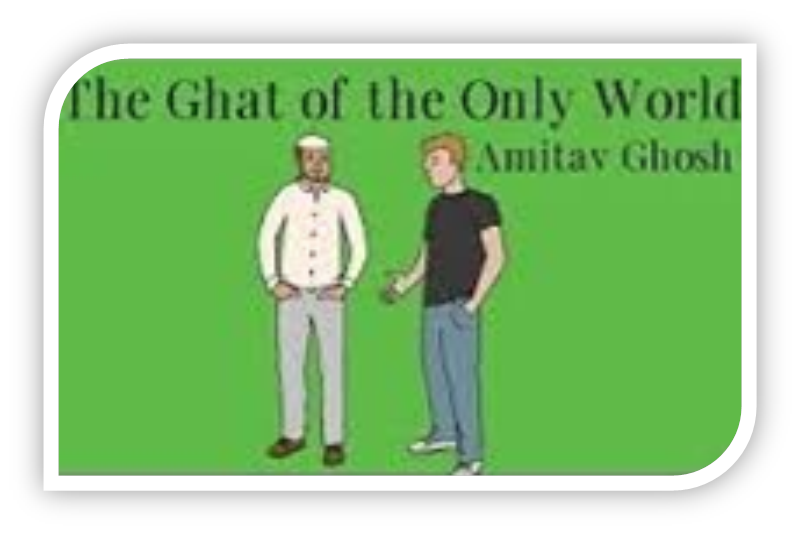
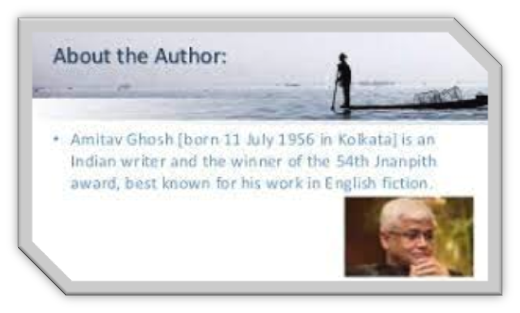
Introduction
The essay “The Ghat of the only world” is a friend’s tribute to a friend. In the Ghat of the only world, Amitav Ghosh recalls all memories of his beloved friend to fulfill his promise. This is a profoundly emotional response to respect a friend’s desire to write something about him after his death.
Summary
The writer had a friend named Agha Shahid who knew he wouldn’t live because he suffered a brain tumor, so he asked the writer to write about him when he wouldn’t be there anymore. The author kept his promise. The author and Shahid were both studying at the University of Delhi. However, their time at the university had overlapped briefly. They never had met. Shahid belonged to Kashmir and moved to America in 1975 where his brother had already been settled. The two sisters of Shahid also joined them later. Shahid used to write poems and published a collection of his poems. The author had read some poems and was very impressed. But so far he had never met Shahid. The two had friends together. One of them contacted the author, Shahid. From 1998 to 1999, the two had several phone conversations and even met a couple of times. Shahid had a sudden blackout in February 2000. The tests showed that he had cerebral cancer. On 7 May 2000, the author went to Shahid, where he worked as a teacher. With his students, Shahid was very popular. Shahid now moved to Brooklyn in order to be close to his youngest sister. The writer lived a few blocks away, too, and the two met very often. On 25 April 2000, the writer phoned Shahid and reminded him of their friend’s invitation to lunch.
Shahid spoke to the author about his approaching death for the first time and asked him to write something about him after his death.
The author kept a record of all his talks and meetings with Shahid. He noted that Shahid shared the music of Roshanara Begum, Kishore Kumar and his fondness for Rogan Josh, and his interest in old Bombay films. And both shared a cricket indifference. On 21 May 2001, Shahid was admitted to the hospital. He was very weak now, and could hardly stand. However, he was as happy as ever. On 27 October, the writer met him last. He died on 8 December 2001 at two o’clock. Without Shahid, the writer says he feels a great void. He feels surprised that such a brief friendship has led to such an enormous void. She often remembers Shahid’s presence there when he walks into his living room.
Explanation
A dying man, an expatriate from Kashmir, asks the author to write something about him after he is gone. The following piece is what Amitav Ghosh wrote to keep his promise.
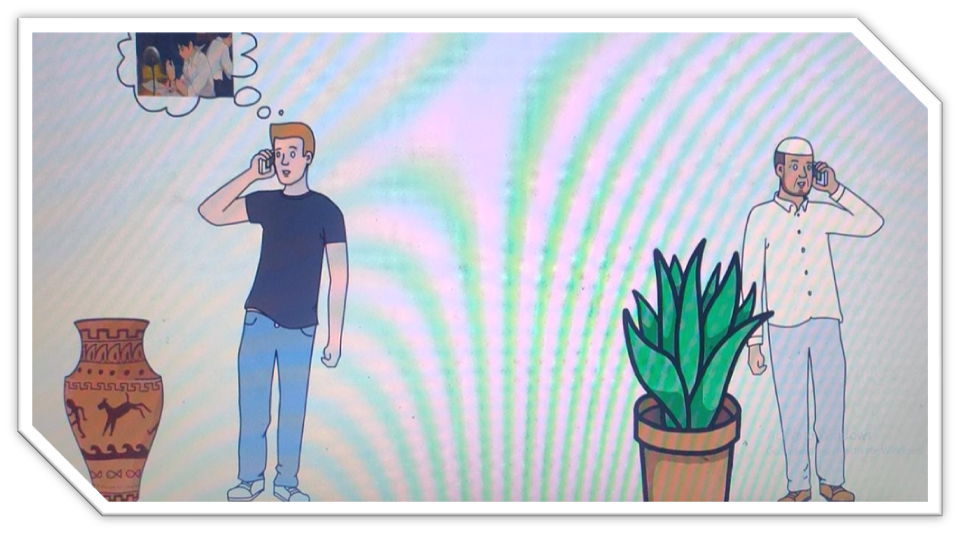
The first time that Agha Shahid Ali spoke to me about his approaching death was on 25 April 2001. The conversation began routinely. I had telephoned to remind him that we had been invited to a friend’s house for lunch and that I was going to come by his apartment to pick him up. Although he had been under treatment for cancer for some fourteen months, Shahid was still on his feet and perfectly lucid, except for occasional lapses of memory. I heard him thumbing through his engagement book and then suddenly he said: ‘Oh dear. I can’t see a thing.’ There was a brief pause and then he added: ‘I hope this doesn’t mean that I’m dying…’
Word – meaning -
Lucid- understandable
The author writes about the first time his friend, Agha Shahid Ali talked about his death openly. It was on 25 April 2001 when the author had called him to tell him that he would be coming by his house to pick him up. Shahid Ali was undergoing cancer treatment for fourteen months but was still very active all the time apart from a few occasions where he would lose his memory. For instance, the conversation that day began normally but the author could hear him saying that he doesn’t recall anything and heard him thumbing through his engagement book. He continued and said that this might mean his death is not far-fetched.
Although Shahid and I had talked a great deal over the last many weeks, I had never before heard him touch on the subject of death. I did not know how to respond: his voice was completely at odds with the content of what he had just said, light to the point of jocularity. I mumbled something innocuous: ‘No Shahid — of course not. You’ll be fine.’ He cut me short. In a tone of voice that was at once quizzical and direct, he said: ‘When it happens I hope you’ll write something about me.’
Word – meaning -
At odds- in conflict or at variance
Jocularity- said or done as a joke
Quizzical- indicating mild or amused puzzlement
Innocuous- not harmful or offensive
He mentions that this is the first time Shahid mentioned his death even though they had been in constant contact with each other. Shahid mentioned it in a very light way, not completely believing the possibility of it. The author did not at the moment know what to say but he somehow sympathized with him saying that everything was going to be just fine. Which, Shahid replied by saying in a quite direct tone that he hopes the author will write about him and keep him alive whenever it happens.
I was shocked into silence and a long moment passed before I could bring myself to say the things that people say on such occasions. ‘Shahid you’ll be fine; you have to be strong…’
He was immensely shocked at hearing this and it took him longer than usual to tell Shahid that all was going to be fine and that he ought to have hope.
From the window of my study, I could see a corner of the building in which he lived, some eight blocks away. It was just a few months since he moved there: he had been living a few miles away, in Manhattan, when he had a sudden blackout in February 2000. After tests revealed that he had a malignant brain tumor, he decided to move to Brooklyn, to be close to his youngest sister, Sameetah, who teaches at the Pratt Institute—a few blocks away from the street where I live.
Word – meaning -
Malignant- uncontrollable; dangerous
The author could easily see a part of the building where Shahid lived from his study. Shahid used to live in Manhattan with his sister Sameetah, who taught at the Pratt Institute which is nearby the author’s house, before he moved here It was after a temporary loss of consciousness when he got a few tests done which revealed that he had a brain tumor, Shahid moved to Brooklyn.
Shahid ignored my reassurances. He began to laugh and it was then that I realized that he was dead serious. I understood that he was entrusting me with a quite specific charge: he wanted me to remember him not through the spoken recitatives of memory and friendship, but through the written word. Shahid knew all too well that for those writers for whom things become real only in the process of writing, there is an inbuilt resistance to dealing with loss and bereavement. He knew that my instincts would have led me to search for reasons to avoid writing about his death: I would have told myself that I was not a poet; that our friendship was of recent date; that there were many others who knew him much better and would be writing from greater understanding and knowledge. All this Shahid had guessed and he had decided to shut off those routes while there was still time.
Word – meaning -
Bereavement- loss; deprivation; grief; sorrow
No matter how much the author consoled him, Shahid ignored it and began laughing which made the author realize that he was not joking. The author realized that he is being bestowed the responsibility of keeping Shahid alive through his words and not just spoken reminisces from the past. Shahid was well aware of how it was with writers, that they try to resist accepting any mishappening or avoid dealing with grief until they begin writing about it because that is when they come face-to-face with reality. Shahid also knew that the author would find every possible reason to not write about his death. He even quoted some of the excuses like they have only known each other for a while, others might know him better, or that he was no poet. Shahid was aware of all of them and he made sure that they didn’t disturb him while he was still alive.
‘You must write about me.’ Clear though it was that this imperative would have to be acknowledged, I could think of nothing to say: what are the words in which one promises a friend that one will write about him after his death? Finally, I said: ‘Shahid, I will: I’ll do the best I can’.
Word – meaning -
Imperative- giving an authoritative command
Shahid was firm on his words but our author, on the other hand, was not very sure of what to say at that moment when a friend was talking about his death. He could not find the right permutation and combination of words to assure his friend that he would write about him after his death. On the other hand, he knew this was supposed to be acknowledged. Thus, he promised to do the best of his ability.
By the end of the conversation, I knew exactly what I had to do. I picked up my pen, noted the date, and wrote down everything I remembered from that conversation. This I continued to do for the next few months: it is this record that has made it possible for me to fulfill the pledge I made that day.
That day, the author was clear as to what he should do. He noted down the minute details of their conversation and continued doing it for every conversation they had for a few months that followed. He mentions that it is those records that helped him in keeping his promise of writing about Shahid.
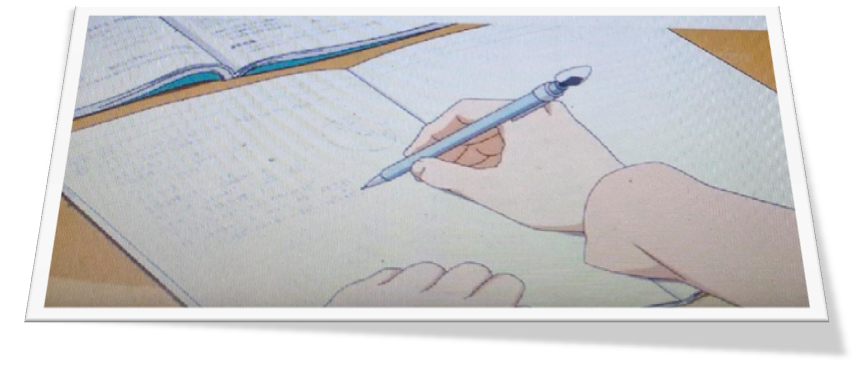
I knew Shahid’s work long before I met him. His 1997 collection, The Country without a Post Office, had made a powerful impression on me. His voice was like none I had ever heard before, at once lyrical and fiercely disciplined, engaged and yet deeply inward. Not for him the mock-casual almost-prose of so much contemporary poetry: he was a voice that was not ashamed to speak in a bardic register. I knew of no one else who would even conceive of publishing a line like: ‘Mad heart, be brave
Word – meaning -
To speak in a bardic register- A poetic style
Conceive- form a plan or idea in the mind
The author now tells how he knew Shahid even before they met. Shahid’s work from the 1997 collection inspired him. The author had not heard him speak like that ever before. Suddenly it would be poetical, or disciplined at another moment involved and deep. Sometimes he would utter so much contemporary poetry. He was not at all shy to speak in a poetic style. The author did not know anyone else who would think of publishing lines like “Mad heart, brave”
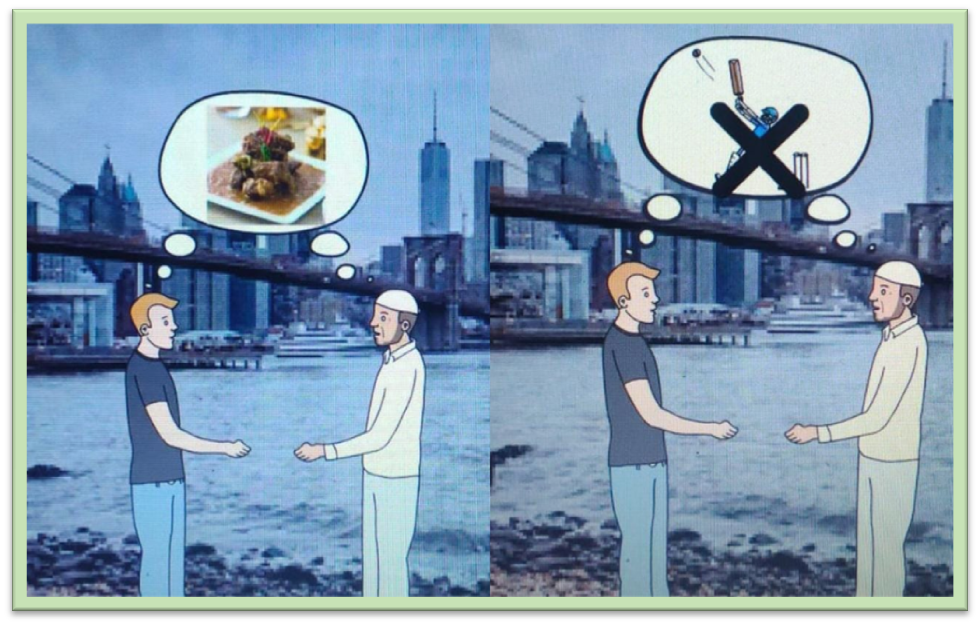
In 1998, I quoted a line from The Country without a Post Office in an article that touched briefly on Kashmir. At the time all I knew about Shahid was that he was from Srinagar and had studied in Delhi. I had been at Delhi University myself, but although our time there had briefly overlapped, we had never met. We had friends in common, however, and one of them put me in touch with Shahid. In 1998 and 1999 we had several conversations on the phone and even met a couple of times. But we were no more than acquaintances until he moved to Brooklyn the next year. Once we were in the same neighborhood, we began to meet for occasional meals and quickly discovered that we had a great deal in common. By this time of course Shahid’s condition was already serious, yet his illness did not impede the progress of our friendship. We found that we had a huge roster of common friends, in India, America, and elsewhere; we discovered a shared love of rogan josh, Roshanara Begum and Kishore Kumar; a mutual indifference to cricket and an equal attachment to old Bombay films. Because of Shahid’s condition, even the most trivial exchanges had a special charge and urgency: the inescapable poignance of talking about food and half-forgotten figures from the past with a man who knew himself to be dying was multiplied, in this instance, by the knowledge that this man was also a poet who had achieved greatness— perhaps the only such that I shall ever know as a friend.
Word – meaning -
Trivial- of little value or importance
Impede- delay or prevent something by obstructing it; hinder
Poignance- the quality of evoking a keen sense of sadness
He even used a line from Shahid’s The Country without a Post Office in his work in 1998 on Kashmir. The only thing he knew about Shahid back then was that he was from Srinagar and he studied at the Delhi University at almost the same time the author was there. They even met each other a few times through a common friend of theirs but it was only limited. It was when Shahid moved to Brooklyn the next year that they started seeing each other more often and got to know that they have a lot in common. Their love for specific dishes, singers and old Bombay films. Because of Shahid’s condition, even the smallest exchanges had been special. Even though there was an inescapable sense of sadness, talking with a man who knew he was dying about different things which he enjoyed such as food and half-forgotten stories from the past multiplied the pleasure of talking especially by the knowledge that this man was also a poet who had achieved greatness in his lifetime. The author is in doubt that he would ever know Shahid further as a friend.

One afternoon, the writer Suketu Mehta, who also lives in Brooklyn, joined us for lunch. Together we hatched a plan for an adda—by definition, a gathering that has no agenda, other than conviviality. Shahid was enthusiastic and we began to meet regularly. From time to time other writers would join us. On one occasion a crew arrived with a television camera. Shahid was not in the least bit put out: ‘I’m so shameless; I just love the camera.’
Word – meaning -
Conviviality- the quality of being friendly and lively
On one of their afternoon lunches, writer Suketu Mehta joined them. They enjoyed each other and even made new plans to enjoy. Shahid, full of life as he was, met him regularly and other writers would join them too. Once when a crew with a camera arrived, Shahid was not embarrassed to say that he loved the camera.
Shahid had a sorcerer’s ability to transmute the mundane into the magical. Once I accompanied Iqbal, his brother, and Hena, his sister, on a trip to fetch him home from the hospital. This was on 21 May: by that time he had already been through several unsuccessful operations. Now he was back in hospital to undergo a surgical procedure that was intended to relieve the pressure on his brain. His head was shaved and the shape of the tumor was visible upon his bare scalp, its edges outlined by metal sutures.
Word – meaning -
Sorcerer- a person who claims or is believed to have magical powers; wizard
Transmute- change in form, nature or substance
Mundane- lacking interest or excitement; dull
Sutures- a stitch or row of stitches holding together the edges of a wound or surgical incision
According to the author, Shahid was no less than a wizard when it came to changing the dull or ordinary into bright and remarkable. On 21 May, when the author accompanied Shahid’s siblings, Iqbal and Hena to bring him home from the hospital, they saw the shape of the tumor on his shaved head along with the stitches. He had gone to the hospital for surgery to help reduce pressure on his brain. Before that, Shahid has had quite many unsuccessful surgeries.
When it was time to leave the ward a blue-uniformed hospital escort arrived with a wheelchair. Shahid waved him away, declaring that he was strong enough to walk out of the hospital on his own. But he was groggier than he had thought and his knees buckled after no more than a few steps. Iqbal went running off to bring back the wheelchair while the rest of us stood in the corridor, holding him upright. At that moment, leaning against the cheerless hospital wall, a kind of rapture descended on Shahid. When the hospital orderly returned with the wheelchair Shahid gave him a beaming smile and asked where he was from. ‘Ecuador’, the man said, and Shahid clapped his hands gleefully together, ‘Spanish!’ he cried, at the top of his voice. ‘I always wanted to learn Spanish. Just to read Lorca ’
Word – meaning -
Lorca- Garcia Lorca is Spain’s most deeply appreciated and highly revered poet and dramatist
Groggier- dazed, weak or unsteady, especially from illness, intoxication, sleep or a blow
Buckled- bend and give way under pressure or strain
Rapture- a feeling of intense pleasure or joy; ecstasy; bliss
Shahid sent away the hospital escort that brought him in a wheelchair stating that he is strong and fit enough to walk on his own. But he was weaker than he thought and his knees couldn’t support his walking more than a few steps. The author and Hena helped him stand upright while Iqbal ran away to get the wheelchair. Shahid was leaning towards the hospital wall when suddenly got up with a charge of pleasure and joy. He asked the hospital to escort his place of origin when he was given the wheelchair back. The hospital orderly replied that he was from Ecuador. Upon hearing his reply, Shahid joyfully clapped his hands and shouted how he always wanted to learn Spanish to be able to read the work of Gracia Lorca, a renowned poet and dramatist.
Shahid’s gregariousness had no limit: there was never an evening when there wasn’t a party in his living room. ‘I love it that so many people are here,’ he told me once. ‘I love it that people come and there’s always food. I love this spirit of festivity; it means that I don’t have time to be depressed.’
Word – meaning -
Gregariousness- fond of the company of others; sociable
Shahid was a sociable person which is why there was not a single evening that his living room didn’t have a party. Shahid had told the author that he loved the feeling of being around people, celebrating and always having food for them. He loved the spirit of celebration. He felt that it took away his mind from being sad.
His apartment was a spacious and airy split-level, on the seventh floor of a newly-renovated building. There was a cavernous study on the top floor and a wide terrace that provided a magnificent view of the Manhattan skyline, across the East River. Shahid loved this view of the Brooklyn waterfront slipping, like a ghat, into the East River, under the glittering lights of Manhattan.
Word – meaning -
Cavernous- vast; huge; large; spacious
Shahid’s apartment was huge and airy. He lived on the seventh floor of a newly redecorated building. It also had a spacious study and a terrace from where the Manhattan skyline which is across the East River was also visible. He was extremely fascinated by the view of Brooklyn seaside that looked just like a Ghat into the East river decorated with the shimmering Manhattan lights.
The journey from the foyer of Shahid’s building to his door was a voyage between continents: on the way up the rich fragrance of rogan josh and haak would invade the dour, grey interior of the elevator; against the background of the songs and voices that were always echoing out of his apartment, even the ringing of the doorbell had an oddly musical sound. Suddenly, Shahid would appear, flinging open the door, releasing a great cloud of heeng into the frosty New York air, ‘Oh, how nice,’ he would cry, clapping his hands, ‘how nice that you’ve come to see your little Mos-lem!’ Invariably, there’d be some half dozen or more people gathered inside —poets, students, writers, relatives —and in the kitchen someone would always be cooking or making tea. Almost to the very end, even as his life was being consumed by his disease, he was the center of a perpetual carnival, an endless mela of talk, laughter, food and, of course, poetry.
Word – meaning -
Foyer- an entrance hall or other open area in a building used by the public
Voyage- a long journey involving travel by sea or in space
Dour- unfriendly
Mos-lem- Muslim
Heeng- asafoetida; a staple ingredient used in Indian cooking
Frosty- freezing; very cold
The author explains how the journey from the building hall to his door made them feel as if they were on a “voyage between continents”. This is because of the various fragrances of the food, different types of music that echoed from his apartment, his melodic doorbell and how he greeted his guests with warmth and happiness upon opening the door. Upon reaching, there would always be a company in his apartment comprising of poets, writers, students and relatives. Some of them would be enjoying themselves in the living room while others were in the kitchen making food and tea. Even as his disease was taking its toll, he was amidst creativity and laughter, enjoying his life to the fullest by being happy in every moment.
No matter how many people there were, Shahid was never so distracted as to lose track of the progress of the evening’s meal. From time to time he would interrupt himself to shout directions to whoever was in the kitchen: ‘yes, now, add the dahi now.’ Even when his eyesight was failing, he could tell from the smell alone, exactly which stage the rogan josh had reached. And when things went exactly as they should, he would sniff the air and cry out loud: ‘Ah! Khana ka Kya mehek hai!’
Irrespective of how occupied he was amidst all the partying, he would not fail to check the advancement in the preparation of his favorite rogan josh. He would stop now and then to give directions as to when to add dahi and other ingredients to the person cooking. The disease did not stop him from tracking his progress as well. Even when his eyesight was getting weaker, he could tell by its smell. He would sniffle and take pleasure in the aroma of it.
Shahid was legendary for his prowess in the kitchen, frequently spending days planning and preparation of a dinner party. It was through one such party, given while he was in Arizona, that he met James Merrill, the poet who was to radically alter the direction of his poetry: it was after this encounter that he began to experiment with strict, metrical patterns and verse forms. No one had a greater influence on Shahid’s poetry than James Merrill: indeed, in the poem in which he most explicitly prefigured his own death, ‘I Dream I Am At the Ghat of the Only World,’ he awarded the envoy to Merrill: ‘SHAHID, HUSH. THIS IS ME, JAMES. THE LOVED ONE ALWAYS LEAVES.’
Word – meaning -
Prowess- skill or expertise in a particular activity or field
Metrical- relating to or composed in poetic meter
Prefigured- be an early indication or version of (something)
Envoy- a messenger or representative, especially one on a diplomatic mission
Shahid was famous for his culinary skills and was looked up to for planning a dinner party. When he planned one such party in Arizona, he met James Merrill, a renowned poet who changed his life and the way he saw or the way in which he wrote poetry. After he met James Merill, he began composing his poetry in a strict poetic meter. He was the only one who could inspire Shahid up to such a great extent, especially in the poem in which he wrote about his own approaching death. He even mentioned James in his poem “I Dream I Am At the Ghat of the Only World” through the lines, “‘SHAHID,
HUSH. THIS IS ME, JAMES. THE LOVED ONE ALWAYS LEAVES.” hereby telling him how it is the most loved ones who leave first.
Shahid placed great store on authenticity and exactitude in cooking and would tolerate no deviation from traditional methods and recipes: for those who took shortcuts, he had only pity. He had a special passion for the food of his region, one variant of it in particular: ‘Kashmiri food in the Pandit style’. I asked him once why this was so important to him and he explained that it was because of a recurrent dream, in which all the Pandits had vanished from the valley of Kashmir and their food had become extinct. This was a nightmare that haunted him and he returned to it again and again, in his conversation and his poetry
Word – meaning -
Exactitude- the quality of being very accurate and careful
Shahid was accurate and strict in his measures and procedures when it came to cooking. He had a special place for cooking in his heart. He believed in following the traditional methods to maintain its authenticity and to continue its legacy. He only felt sad for people who would resort to simplified modern forms of cooking the age-old delicacies. He was very sensitive towards Kashmiri food prepared in the Pandit style because of one repeated nightmare that continued to haunt him that one day all the Pandits will disappear and the food had become difficult to be found in the valley of Kashmir. He mentioned this nightmare quite frequently in his conversations and poetry.
At a certain point, I lost track of you.
You needed me. You needed to perfect me:
In your absence, you polished me into the Enemy.
Your history gets in the way of my memory
I am everything you lost. Your perfect enemy.
Your memory gets in the way of my memory . . .
There is nothing to forgive. You won’t forgive me.
I hid my pain even from myself; I revealed my pain only to myself.
There is nothing to forgive. You won’t forgive me.
If only somehow you could have been mine, what would not have
been possible in the world?
Once, in conversation, he told me that he also loved Bengali food. I protested, ‘But Shahid, you’ve never even been to Calcutta ’.
‘No,’ he said. ‘But we had friends who used to bring us that food. When you ate it you could see that there were so many things that you didn’t know about, everywhere in the country…’ What I say is: why can’t you be happy with the cuisines and the clothes and the music and all these wonderful things?’ He paused and added softly, ‘At least here we have been able to make a space where we can all come together because of the good things.’
Word – meaning -
Calcutta- Kolkata
Once when they were having a chit-chat, Shahid told the author about his fascination for Bengali food. To the author’s surprise, he had never been to Kolkata. Shahid explained that he had friends that bought him amazing food which always left him wondering how vast this country’s culture is. What he liked about it most is how we as a society have come together despite our differences to live with each other in complete harmony, cooperation and peace.
Of the many ‘good things in which he took pleasure, none was more dear to him than the music of Begum Akhtar. He had met the great ghazal singer when he was in his teens, through a friend, and she had become an abiding presence and influence in his life. Shahid had a fund of stories about her sharpness in repartee.
Word – meaning -
Abiding- a memory lasting a long time; enduring
Repartee- conversation or speech characterized by quick witty, comments or replies
Shahid was fascinated by a lot of things but the way he found extreme delight in the music of Begum Akhtar, was like no other. He got the opportunity to meet the legendary ghazal singer through a friend a few years ago and he continued to be influenced by her. He always had a few stories about her presence of mind and witty replies.

Shahid was himself no mean practitioner of repartee. On one famous occasion, at Barcelona airport, he was stopped by a security guard just as he was about to board a plane. The guard, a woman, asked: ‘What do you do?’
‘I’m a poet,’ Shahid answered.
‘What were you doing in Spain?’
‘Writing poetry.’
No matter what the question, Shahid worked poetry into his answer. Finally, the exasperated woman asked: ‘Are you carrying anything that could be dangerous to the other passengers?’ At this Shahid clapped a hand to his chest and cried: ‘Only my heart.’
Shahid, although quick with his witty replies, was never mean to anyone. He included his poetry in whatever he had to say and to anyone. Once when he was undergoing a security check at the Barcelona Airport, he was asked about his profession to which he replied that he is a poet. The guard further asked him as to what he was doing in Spain to which he immediately said, he was here to write poetry. Upon being asked by her if he were carrying anything harmful for the passengers, he instantly replied, nothing much but his heart.
This was one of his great Wildean moments, and it was to occasion the poem ‘Barcelona Airport’. He treasured these moments: ‘I long for people to give me an opportunity to answer questions, he told me once. On 7 May I had the good fortune to be with him when one such opportunity presented itself. Shahid was teaching at Manhattan’s Baruch College in the Spring semester of 2000 and this was to be his last class — indeed the last he was ever to teach. The class was to be a short one for he had an appointment at the hospital immediately afterward. I had heard a great deal about the brilliance of Shahid’s teaching, but this was the first and only time that I was to see him perform in a classroom. It was evident from the moment we walked in that the students adored him: they had printed a magazine and dedicated the issue to him.
Word – meaning -
Wildean- relating to or characteristic of Oscar Wilde or his works, especially in being witty and epigrammatic
He considered the Airport incident to be one of his great ‘Wildean’ incidents where he replied with just the cleverness of Oscar Wilde and it was now to be a part of his poem “Barcelona Airport”. He loved such moments when people would ask him a question and he could get an opportunity to answer them. The author calls himself fortunate enough to have encountered such a moment on May 7 when Shahid was teaching at Manhattan’s Baruch College in the spring semester of 2000. His teaching style was much talked about and it was only during his last class that the author got to witness it himself. The class was of a comparatively shorter duration because he had an appointment at the hospital afterward. The students loved him which was clear from the moment he entered the room. They had even dedicated a magazine issue to him.
Shahid for his part was not in the least subdued by the sadness of the occasion. From beginning to end, he was a sparkling diva, Akhtar incarnates, brimming with laughter and nakhra. When an Indian student walked in late he greeted her with the cry; ‘Ah my little subcontinental has arrived.’ Clasping his hands, he feigned a swoon. ‘It stirs such a tide of patriotism in me to behold another South Asian.’
Word – meaning -
Subdued- quiet and rather reflective or depressed
Brimming- be full of a particular quality, feeling, etc
Feigned – simulated or pretended; insincere
Swoon- be overcome with admiration, adoration, or other strong emotion
Shahid was never seen being sad or consumed by his disease. He had always been a delight for the eyes, someone who could always be seen laughing and smiling. Upon seeing an Indian girl enter his class, he got super excited and clapped his hands exclaiming how good it is to see someone from your own land. He remarked how patriotic he felt at the moment.
His time at Penn State he remembered with unmitigated pleasure: ‘I grew as a reader, I grew as a poet, I grew as a lover.’ He fell in with a vibrant group of graduate students, many of whom were Indian. This was, he often said, the happiest time of his life. Later Shahid moved to Arizona to take a degree in creative writing. This in turn was followed by a series of jobs in colleges and universities: Hamilton College, the University of Massachusetts at Amherst, and finally, the University of Utah in Salt Lake City, where he was appointed professor in 1999. He was on leave from Utah, doing a brief stint at New York University, when he had his first blackout in February 2000.
Word – meaning -
Unmitigated- absolute; unqualified
He loved his time at Penn State and he remembers each moment spent there. He felt that it was a place that bought him immense growth in all the parameters; as a reader, a poet and a lover. According to him, it was the happiest time of his life when he even met a group of mostly Indian students. Then he went to Arizona to learn creative writing after which he taught in various universities namely, Hamilton College, the University of Massachusetts at Amherst, and the University of Utah in Salt Lake City, where he was appointed professor in 1999. He experienced his first temporary lapse of memory in 2000 when he was at the New York University for a short duration.
After 1975, when he moved to Pennsylvania, Shahid lived mainly in America. His brother was already there and they were later joined by their two sisters. But Shahid’s parents continued to live in Srinagar and it was his custom to spend the summer months with them there every year: ‘I always move in my heart between sad countries.’ Traveling between the United States and India he was thus an intermittent but first-hand witness (sháhid) to the mounting violence that seized the region from the late 1980s onwards: It was ’89, the stones were not far, signs of change everywhere (Kashmir would soon be in literal flames)…
Word – meaning -
Sháhid- a Muslim Martyr
After moving to Pennsylvania, succeeding 1975, he lived mostly in America with his brother and was soon joined by his two sisters. His parents were still living in Srinagar and it was a tradition for him to spend his summers in Srinagar with his parents every year. He used to get saddened by the growing violence in the state of Kashmir that was getting worse with each passing day.
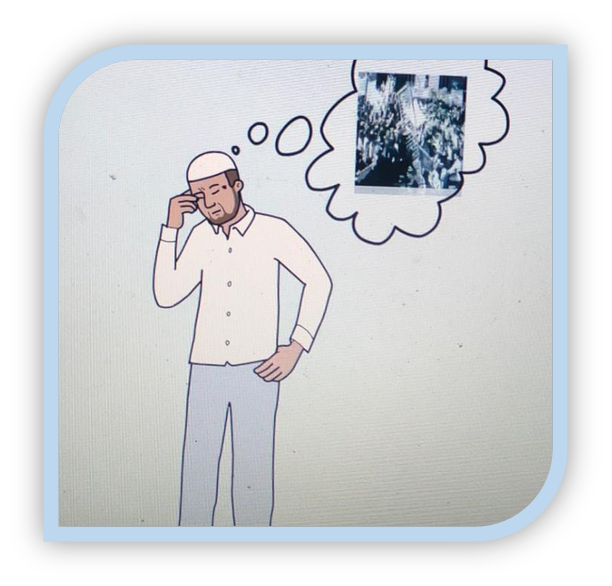
The steady deterioration of the political situation in Kashmir —the violence and counter-violence —had a powerful effect on him. In the time it became one of the central subjects of his work: indeed, it could be said that it was in the writing of Kashmir that he created his finest work. The irony of this is that Shahid was not by inclination a political poet. I heard him say once: ‘If you are from a difficult place and that’s all you have to write about then you should stop writing. You have to respect your art, your form — that is just as important as what you write about.’
The worsening of the political scenario in Kashmir moved him deeply and could be seen in his works. Even his great works are on the subject of Kashmir although he was not a poet who wrote only on political matters. According to him, one must broaden one’s perspective and area of work and not stay limited to the trying place you come from. He felt the art is just as important as its content.
Anguished as he was about Kashmir’s destiny, Shahid resolutely refused to embrace the role of victim that could so easily have been his. Had he done so, he could no doubt have easily become a fixture on talk shows and news programs. But Shahid never had any doubt about his calling: he was a poet, schooled in the fierce and unforgiving art of language. Although respectful of religion, he remained a firm believer in the separation of politics and religious practice.
Word – meaning -
Anguished- experiencing or expressing severe mental or physical pain or suffering
Fixture- set firmly in place
No matter how deeply affected he was by the state of Kashmir, he managed to be firm about his opinion that politics and religion should be separate from each other. He respected his religion but he refused to play a victim that could have got his interviews with news channels and other talk shows as well. He stood firm for he had been trained in literature from one of the most renowned institutes.
Shahid’s gaze was not political in the sense of being framed in terms of policy and solutions. In the broadest sense, his vision tended always towards the inclusive and ecumenical, an outlook that he credited to his upbringing. He spoke often of a time in his childhood when he had been seized by the desire to create a small Hindu temple in his room in Srinagar. He was initially hesitant to tell his parents, but when he did they responded with an enthusiasm equal to his own. His mother bought him murtis and other accouterments and for a while, he was assiduous in conducting pujas at this shrine. This was a favorite story. ‘Whenever people talk to me about Muslim fanaticism,’ he said to me once, ‘I tell them how my mother helped me make a temple in my room.’
Word – meaning -
Ecumenical- involving or uniting members of different religions
Accouterments- other things that were needed for the activity
Assiduous- taking great care that everything is done as well as it can be
Fanaticism- the quality of being fanatical; extremism
Shahid always believed in uniting human beings irrespective of their religion which is why his vision is said to be not political because he did not like their solutions to the prevailing problems. He thinks it is because of his upbringing because his family motivated him to let him have a temple in their room in Srinagar. Although in a Muslim house, his mom helped him with the idols of Hindu gods and goddesses while he enchanted Hindi prayers. He very happily told this to everyone who got extreme when it came to being a Muslim.
I once remarked to Shahid that he was the closest that Kashmir had to a national poet. He shot back: ‘A national poet, maybe. But not a nationalist poet; please not that.’
Word – meaning -
Nationalist- a person who strongly identifies with their own nation and vigorously supports its interests, especially to the exclusion or detriment of the interests of other nations.
Minaret- a slender tower, typically part of a mosque, with a balcony from which a muezzin calls Muslims to prayer
The author once mentioned to Shahid that he was as close to being a poet renowned at the national level to which Shahid immediately replied and corrected that he might be a ‘national’ poet that Kashmir has but not a ‘nationalist’ poet, someone who strongly identifies with their own nation and vigorously supports its interests, especially to the exclusion or detriment of the interests of other nations
In the title poem of The Country without a Post Office, a poet returns to Kashmir to find the keeper of a fallen minaret: ‘Nothing will remain, everything’s finished,’ I see his voice again: ‘This is a shrine Of words. You’ll find your letters to me. And mine to You. Come son and tear open these vanished envelopes’…
This is an archive. I’ve found the remains Of his voice, that map of longings with no limit involving or uniting members of different religions other things that were needed for the activity taking great care that everything is done as well as it can be. In this figuring of his homeland, he himself became one of the images that were spinning around the dark point of stillness— both Sháhid and Shahid, witness and martyr — his destiny inextricably linked with Kashmir’s, each prefigured by the other.
Word – meaning -
Inextricably- in a way that is impossible to separate
Prefigured- be an early indication or version of something
Figuring out about his homeland, having seen so much destruction and sadness, he was almost at a point of stillness in his thoughts where various images were spinning in his mind. He had given himself two roles: Shahid the witness of problematic Kashmir and Shahid the martyr who would do anything for his beloved Kashmir. It was in his destiny that he was not able to separate the two emotions. And it was an indication that it meant something that he was still trying to work on.
I will die, in autumn, in Kashmir,
And the shadowed routine of each vein
Will almost be news, the blood censored,
For the Saffron Sun and the Times of Rain…
Shahid wrote how death would come to him in the state of Kashmir and in the season of autumn. The routine working of his body or the pumping of blood in the veins would no longer be there. It would come to him under the shining sun and while it’s raining.
Among my notes is a record of a telephone conversation on 5 May. The day before he had gone to the hospital for an important test: a scan that was expected to reveal whether or not the course of chemotherapy that he was then undergoing had had the desired effect. All other alternative therapies and courses of treatment had been put off until this report
The author specifies the 5th day of May when they had a telephonic conversation, the details of which have been recorded in his notes. It was the day when Shahid went to the hospital for a scan that would reveal whether his Chemotherapy sessions had been successful or not. Till date, all previous treatments failed to have an effect. So, all alternative therapies and treatments had been stopped.
The scan was scheduled for 2.30 in the afternoon. I called his number several times in the late afternoon and early evening — there was no response. I called again the next morning and this time he answered. There were no preambles. He said, ‘Listen Amitav, the news is not good at all. Basically, they are going to stop all my medicines now —the chemotherapy and so on. They give me a year or less. They’d suspected that I was not responding well because of the way I look. They will give me some radiation a little later. But they said there was not much hope.’
Word – meaning -
Preambles- a preliminary or preparatory statement; an introduction
The author tried calling Shahid after his scan that was scheduled for 2.30 in the afternoon but Shahid did not respond and it was only the next day when Shahid picked up the call. Upon picking up the phone, without any formalities, Shahid immediately told Amitav that none of it has worked and he has very less time left now, maybe a year or even lesser. He added that the doctors feared that he was not responding to the treatment because of his looks. Shahid said this to create humor and did not really mean it. The doctors had prescribed some radiation but there are very few chances of it being successful too.
Dazed, staring blankly at my desk, I said: ‘What will you do now Shahid?’ ‘I would like to go back to Kashmir to die.’ His voice was quiet and untroubled. ‘Now I have to get my passport, settle my will and all that. I don’t want to leave a mess for my siblings. But after that, I would like to go to Kashmir. It’s still such a feudal system there and there will be so much support— and my father is there too. Anyway, I don’t want my siblings to have to make the journey afterward, like we had to with my mother.’
Word – meaning -
Feudal system- Under this system, a peasant or worker received a piece of land in return for serving a lord or king
Unable to think or react properly, the author asks Shahid about his plans to which Shahid replies that he wants to take his last breath in Kashmir close to his family. Although it is still a mess there, he wished to get his passport and prepare his will to make it easier for his siblings so that they don’t have to travel for this once he is gone.
Later, because of logistical and other reasons, he changed his mind about returning to Kashmir: he was content to be laid to rest in Northampton, in the vicinity of Amherst, a town sacred to the memory of his beloved Emily Dickinson. But I do not think it was an accident that his mind turned to Kashmir in speaking of death. Already, in his poetic imagery, death, Kashmir, and Sháhid/Shahid had become so closely overlaid as to be inseparable, like old photographs that have melted together in the rain.
Though he had to cancel his plans for Kashmir because of lack of orchestration, he was fine with being laid to rest in Northampton, in the vicinity of Amherst, a town sacred to the memory of his beloved Emily Dickinson. The author somehow suspected that Shahid was always inclined towards taking his last breath in Kashmir as he had been portraying in his poetries. He had portrayed Shahid and Sháhid in an inseparable manner which the author compared with photographs that had been distorted because of rain.
Yes, I remember it,
The day I’ll die, I broadcast the crimson,
So long ago of that sky, its spread air,
Its rushing dyes, and a piece of earth
Bleeding, apart from the shore, as we went
On the day I’ll die, post the guards, and he,
Keeper of the world’s last saffron, rowed me
On an island the size of a grave. On
Two yards he rowed me into the sunset,
Past all pain. On everyone’s lips was news
Of my death but only that beloved couplet,
Broken, on his: ‘If there is a paradise on earth
It is this, it is this, and it is this.’
The last time I saw Shahid was on 27 October, at his brother’s house in Amherst. He was intermittently able to converse and there were moments when we talked just as we had in the past. He was aware, as he had long been, of his approaching end and he had made his peace with it. I saw no trace of anguish or conflict: surrounded by the love of his family and friends, he was calm, contented, at peace. He had said to me once, ‘I love to think that I’ll meet my mother in the afterlife if there is an afterlife.’ I had the sense that as the end neared, this was his supreme consolation. He died peacefully, in his sleep, at 2 a.m. on 8 December.
The author met him on October 27 for the last time in Amherst. It was his brother’s house. He was talking at irregular intervals and at some point, the author felt they were talking as if it were the old times. HE had finally made peace with his nearing end, thus he had this calm look. He aspired to see his mother if the concept of the afterlife was true. His death came to him in his sleep at 2 am on the eighth day of December that year.
Now, in his absence, I am amazed that so brief a friendship has resulted in so vast avoid. Often, when I walk into my living room, I remember his presence there, particularly on the night when he read us his farewell to the world: ‘I Dream I Am At the Ghat of the Only World…’
The author ponders how weird it is that a bond of such a short duration can have such a lasting impact. His absence left a void in his heart. The author would miss him on entering his own living room where he would generally be at night reciting his lines“I Dream I Am at the Ghat of the Only World…”
Birth
- Books Name
- (English) Hornbill & Snapshot Class-11
- Publication
- PathSet Publications
- Course
- CBSE Class 11
- Subject
- English
BIRTH
By A.J. Cronin
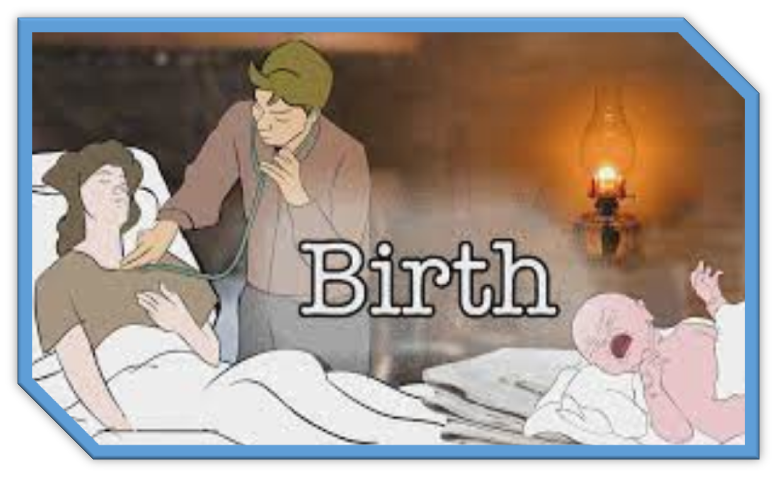
INTRODUCTION
“Birth" is an excerpt from "The Citadel" that revolves around Andrew Manson who just graduated from medical school. It is an account of how the newly graduated medical practitioner helped in bringing Joe and Susan’s child into this world despite going through a tough time with his girlfriend Christine.
Summary
The story starts with a doctor Andrew Manson who has passed out of medical college and is in a relationship with Christine. She was a school teacher. Andrew had a heated argument with his beloved as he was very outspoken and later on realized this. As soon as he reached his home, Joe was waiting for him anxiously. They were about to have their first child after 20 years of a long marriage. Though it was late at night, he was still ready to perform his duty. When Joe and Andrew reached Morgan’s house, he found that Susan was in severe condition and a midwife was helping her out. He also took his time to understand the case. He wants to focus on the patient and so he diversifies his mind and thinks about his other friends who were also having disturbed relations with their partners. After that, he put aside all the things and just wanted to focus on Susan Morgan as she lay under anesthesia. Early in the morning, she delivered a child and soon the doctor noticed that it was lifeless. After a long hour of struggle, he was shocked. Soon he saw that the mother was left unconscious and both of them needed urgent treatment. Now, he was left with the choice as to whom he should attend first. He chose the mother as she was left unconscious and he injected some medicines. As soon as she gained some strength, Andrew now ordered the nurse to bring some hot and cold water. Andrew scrutinized the child who was pale and lifeless. At first, he was not able to detect that the case was of asphyxia and the child has low oxygen levels in his blood. If he could he can give up on the child, but he did not and with his sheer determination he juggled up the child in hot and cold water. He knew that it was very important for the couple. He again started by rubbing a towel on the back of the child and also tried to fill some air. After a long hour of battle, the little child gave a motion and started breathing. As soon as the child started crying, Andrew heaved a sigh of relief and he felt that he had done something big that day. He soon told Joe that all is well. He told everything related to the complications of the operation to the Morgans and left the house with great satisfaction and feeling that he has done a great job.
Birth Lesson Explanation
THOUGH it was nearly midnight when Andrew reached Bryn Gower, he found Joe Morgan waiting for him, walking up and down with short steps between the closed surgery and the entrance to the house. At the sight of him, the burly driller’s face expressed relief.
Word meaning -
Surgery- a place where a doctor, dentist or other medical practitioner treats or advises patients
Burly- (a person) large and strong; heavily built
Driller- someone who works at the drilling controls on the rig floor
When Andrew reached his house at around twelve at night, he caught the sight of Joe Morgan climbing up and then down the stairs between his small clinic and the entrance to his house.
On seeing Andrew, the heavily built driller, Joe heaved a sigh of relief.

“Eh, Doctor, I’m glad to see you. I have been back and forward here this last hour. The missus wants ye —before time, too.” Andrew abruptly recalled from the contemplation of his own affairs, told Morgan to wait. He went into the house for his bag, then together they set out for Number 12 Blaina Terrace. The night air was cool and deep with quiet mystery. Usually so perceptive, Andrew now felt dull and listless. He had no premonition that this night call would prove unusual, still less than it would influence his whole future in Blaenelly. The two men walked in silence until they reached the door of Number 12, then Joe drew up short “I’ll not come in,” he said, and his voice showed signs of strain. “But, man, I know you'll do well for us.”
Word meaning -
Ye- an old written form of the word ‘the’
Contemplation- deep reflective thought
Abruptly- suddenly and unexpectedly
Perceptive- having or showing sensitive insight
Listless- lacking energy or enthusiasm
Premonition- a strong feeling that something is about to happen, especially something unpleasant
Joe Morgan expressed how pleased he was to see Doctor Andrew. He tells Andrew how he has been waiting there for him for about an hour now. Joe’s wife needs Andrew to examine her even before the time of her child’s birth. She is in a critical situation. On hearing this, Andrew had a sudden flashback of the unpleasant night he had with his girlfriend Christine but without wasting further time, he told Joe to wait outside while he got his bag. When he came out, they both began walking towards Number 12 Blaine Terrace, where Joe’s wife was. It was a cool night and the streets were silent which made it mysterious. Andrew, who generally is full of life and spirit, was silent and lacked energy. Andrew had no idea what the night had in store for him and that it was going to influence his life in Blaenelly. They both walked silently till they reached Number 12. As soon as they reached, Joe revealed to Andrew that he does not intend on coming in but he showed full confidence in Andrew. Joe’s voice was tense and under pressure.
Inside, a narrow stair led up to a small bedroom, clean but poorly furnished, and lit only by an oil lamp. Here Mrs. Morgan’s mother, a tall, grey-haired woman of nearly seventy, and the stout, elderly midwife waited beside the patient, watching Andrew’s expression as he moved about the room.
Word meaning -
Stout- (of a person) rather fat or heavy build
Midwife- a person, typically a woman, who is trained to assist women in childbirth
Andrew entered the gate alone. He took the stairs which were of rather a small width and reached a bedroom. The bedroom was not lavish or luxurious, but, it was neat. Inside the room was Joe Morgan’s mother-in-law, a woman of around seventy with larger than the average height and grey hair along with a plump midwife to assist the childbirth. The midwife was also of elderly age. They both sat beside Mrs. Morgan waiting for Andrew
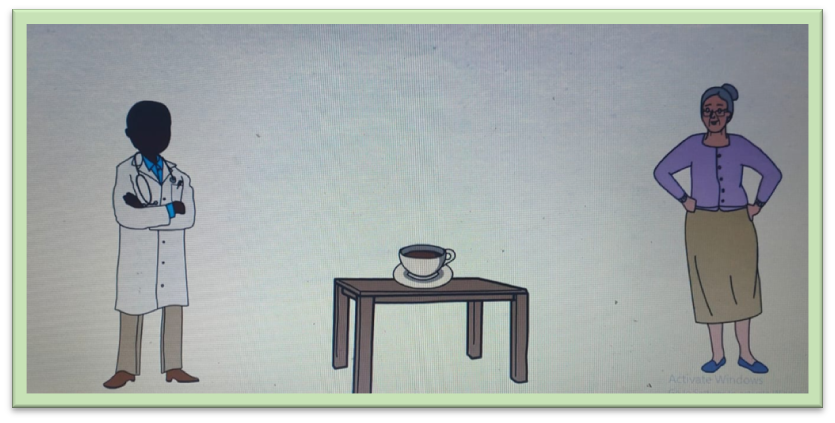
“Let me make you a cup of tea, Doctor, bach,” said the former quickly, after a few moments. Andrew smiled faintly. He saw that the old woman, wise in experience, realized there must be a period of waiting that she was afraid he would leave the case, saying he would return later. “Don’t fret, mother, I’ll not run away.”
Word meaning -
Bach- used as a term of endearment, often after a personal name
Smiled faintly- smiling with less energy or a smile that lacks spirit
Fret- be constantly or visibly anxious; worry
The sweet old lady (Mrs. Morgan’s mother) offered Andrew a cup of tea. She addressed Andrew as “bach” which is used while displaying affection. Realizing that the old lady might be worried about him leaving during the waiting period, he gave her a gentle smile and comforted her by assuring her that he will not go away. The fact that she anticipated the period of waiting and was worried about him running away made Andrew realize that she was wise and had plenty of experience.
Down in the kitchen, he drank the tea which she gave him. Overwrought as he was, he knew he could not snatch even an hour’s sleep if he went home. He knew, too, that the case here would demand all his attention. A queer lethargy of spirit came upon him. He decided to remain until everything was over
Word meaning -
Overwrought- in a state of anxiety; tired
Snatch- manage to take (here)
Queer- strange; odd
Lethargy- lack of energy and enthusiasm
He sipped the tea in the kitchen downstairs. Though he was mentally and physically exhausted because of the unpleasant meeting with Christine, he knew it was impossible for him to even get an hour’s worth of sleep if he went home. Although new in his line of practice, he was aware that the situation was critical and called for his attentiveness. Strangely, he felt a bit active and decided to stay at the place till his duty was fulfilled.
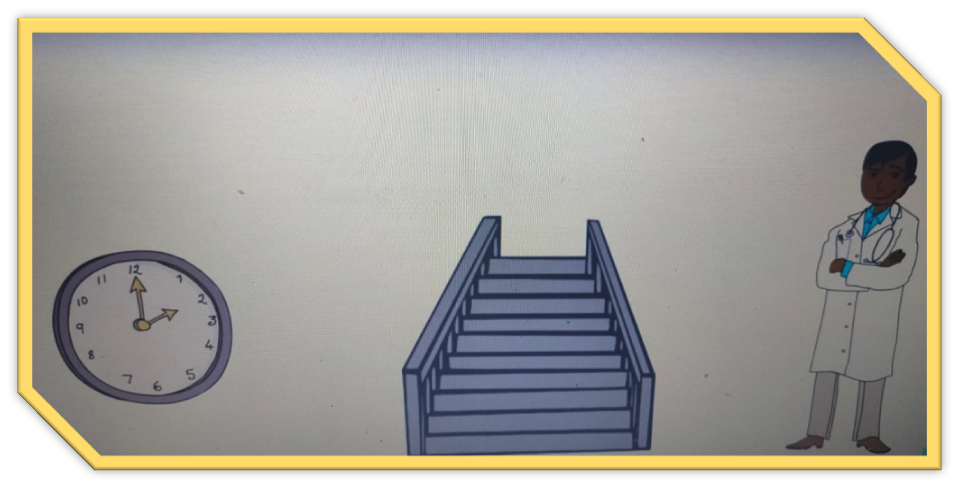
An hour later he went upstairs again, noted the progress made, came down once more, and sat by the kitchen fire. It was still, except for the rustle of cinder in the grate and the slow tick-tock of the wall clock. No, there was another sound —the beat of Morgan’s footsteps as he paced in the street outside. The old woman opposite him sat in her black dress, quite motionless, her eyes strangely alive and wise, probing, never leaving his face.
Word meaning -
Rustle- make a soft, muffled crackling sound
Cinder- a small piece of partly burnt coal or wood that has stopped giving off flames but still has the combustible matter in it
Probing- inquiring closely
He went upstairs after almost an hour to check upon Mrs. Morgan. He sat near the kitchen fire upon coming back. It was that time of the night when everything was still. The only sounds that came were of the ticking clock, Joe’s footsteps from the outside and from the almost extinguished piece of coal. While he sat in the kitchen, Mrs. Morgan’s mother sat in front of him wearing her black dress. She looked at him constantly with her wise eyes that were filled with hope.
His thoughts were heavy, muddled. The episode he had witnessed at Cardiff station still obsessed him morbidly. He thought of Bramwell, foolishly devoted to a woman who deceived him sordidly, of Edward Page, bound to the shrewish Blodwen, of Denny, living unhappily, apart from his wife. His reason told him that all these marriages were dismal failures. It was a conclusion which, in his present state, made him wince. He wished to consider marriage as an idyllic state; yes, he could not otherwise consider it with the image of Christine before him. Her eyes, shining towards him, admitted no other conclusion. It was the conflict between his level, doubting mind and his overflowing heart which left him resentful and confused. He let his chin sink upon his chest, stretched out his legs, stared broodingly into the fire. He remained like this so long, and his thoughts were so filled with Christine, that he started when the old woman opposite suddenly addressed him. Her meditation had pursued a different course.
Word meaning -
Muddled - not arranged in order; untidy
Morbidly - (with reference to a disturbing or unpleasant interest or activity) in an abnormal and unhealthy manner
Sordidly - meanly selfish, self-seeking
Shrewish - (of a woman) bad-tempered or aggressively assertive
Dismal - causing a mood of gloom or depression
Wince - make a slight involuntary grimace or shrinking movement of the body out of pain or distress
Idyllic - like an idyll; extremely happy, peaceful, or picturesque
Resentful - feeling or expressing bitterness or indignation at having been treated unfairly
Broodingly - preoccupied with depressing, morbid, or painful memories or thoughts
Clearly, the earlier unpleasant moments with Christine had taken a toll on his mind. He was still being haunted by the incident that took place at Cardiff station. He began thinking of his friends and acquaintances who have had bad experiences in love and marriage. He thought of Bramwell, the woman he loved who had cheated on him. He contemplated upon the relationship of Edward Page, who was committed to a dominating woman named Blodwen. He reflected upon how Denny is living away from his wife not-so-happily. All of this brought him to an inference that made him cringe. He wished to believe that the institution of marriage was a cheerful one, one that guaranteed peace and companionship. He also had no other reason to believe otherwise with Christine’s shining eyes in his mind. He was undoubtedly facing a conflict with all his mind, heart and soul in disagreement. He thus rested his chin on his chest and pulled out his legs while he glanced at the fireplace. He sat still for a few moments, his mind was still preoccupied with Christine until the old lady broke her silence. She was thinking about something else.
“Susan said not to give her the chloroform if it would harm the baby. She’s awful set upon this child, Doctor, bach.” Her old eyes warmed at a sudden thought. She added in a low tone: “Ay, we all are, I fancy.” He collected himself with an effort. “It won’t do any harm, the anesthetic,” he said kindly. “They’ll be all right.”
Word meaning -
awful – very
The old lady tells the doctor how worried Susan was on account of this complicated situation. She even refused to have anesthesia if it were to affect the baby. She told him how invested she was in the child. The old lady corrects herself and says that all of them are invested in the child. Her eyes were filled with warmth while she said this. The doctor, preoccupied with another set of worries, somehow cleared his mind and assured the old lady that the anesthetic would do no harm to either of them.
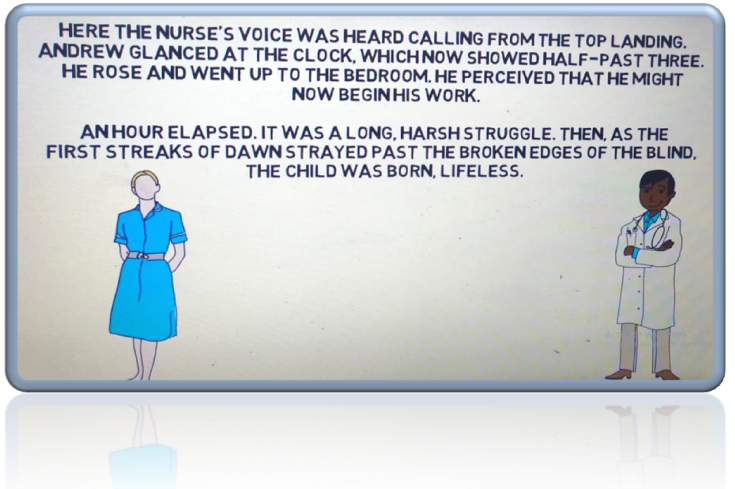
Here the nurse’s voice was heard calling from the top landing. Andrew glanced at the clock, which now showed half-past three. He rose and went up to the bedroom. He perceived that he might now begin his work.
Suddenly, they heard the voice of the midwife calling upon them. Andrew saw that it was already 3.30 and that he shall begin with the procedure. Thus, he got up to go to the bedroom upstairs.
An hour elapsed. It was a long, harsh struggle. Then, as the first streaks of dawn strayed past the broken edges of the blind, the child was born, lifeless
Word meaning -
Blind- a screen for a window, especially one on a roller or made of slats
It took him almost an hour to perform the surgery. It was a rather tough one. While the first rays of daylight came inside from the corner of the window, the Morgan child was born. Unfortunately, the child was cold and still.
As he gazed at the still form a shiver of horror passed over Andrew. After all that he had promised! His face, heated with his own exertions, chilled suddenly. He hesitated, torn between his desire to attempt to resuscitate the child, and his obligation towards the mother, who was herself in a desperate state. The dilemma was so urgent he did not solve it consciously. Blindly, instinctively, he gave the child to the nurse and turned his attention to Susan Morgan who now lay collapsed, almost pulseless, and not yet out of the ether, upon her side. His haste was desperate, a frantic race against her ebbing strength. It took him only an instant to smash a glass ampule and inject the medicine. Then he flung down the hypodermic syringe and worked unsparingly to restore the flaccid woman. After a few minutes of feverish effort, her heart strengthened; he saw that he might safely leave her. He swung round, in his shirt-sleeves, his hair sticking to his damp brow
Word meaning -
Resuscitate- revive someone from the unconsciousness
Ether- used as an anesthetic
Haste- excessive speed or urgency of movement or action; hurry
Frantic- conducted in a hurried, excited, and disorganized way
Ebbing- (of an emotion or quality) gradually decrease
Hypodermic- relating to the region immediately beneath the skin
Unsparingly- generous
Flaccid- lifeless
As he continued to look at the lifeless child, a shiver passed down his spine. While his face was heated because of the efforts he put in, a wave of coldness held him. He was devastated. Moreover, he was confused; he couldn’t get himself to choose between addressing the still-born or the miserable mother. He could not make the decision consciously. So, he intuitively addressed the mother first while giving the child to the nurse. Susan lay unconscious too as the effects of the anesthesia still persisted. He put in all his efforts to bring her out of the desperate state even while her strength continued to weaken. He instantly broke the medicine’s glass to fill the syringe and inject it into her. He worked tirelessly to bring her to her senses. After a moment, when he was assured that she was safe and her body was beginning to regain its strength, he turned his attention to the child. His hair was all over his sweaty face but he did not waste another moment.
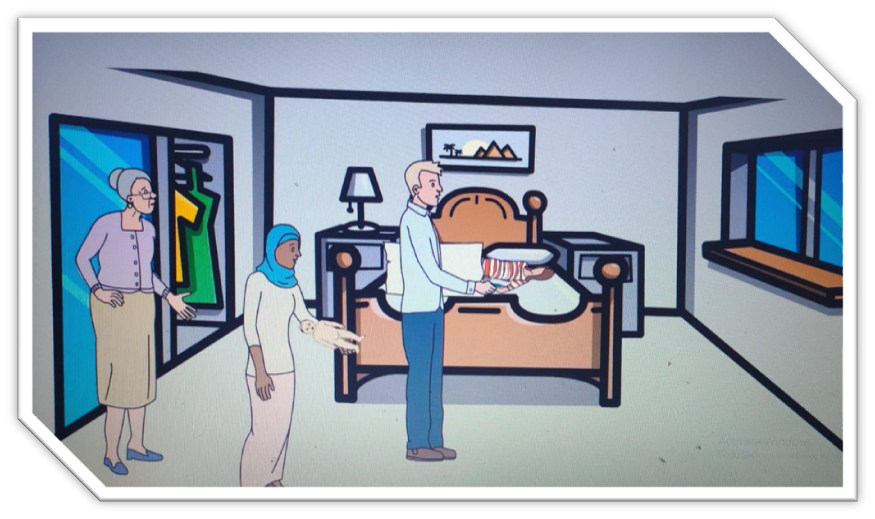
“Where’s the child?” The midwife made a frightened gesture. She had placed it beneath the bed. In a flash, Andrew knelt down. Fishing amongst the sodden newspapers below the bed, he pulled out the child. A boy, perfectly formed. The limp, warm body was white and soft as tallow. The cord, hastily slashed, lay like a broken stem. The skin was of a lovely texture, smooth and tender. The head lolled on the thin neck. The limbs seemed boneless.
Word meaning -
Sodden- saturated with liquid, especially water; soaked through
Tallow- the hard fat of animals melted and used to make soap, candles etc.
Hastily- with excessive speed or urgency; hurriedly
Slashed- slit
Lolled- hang loosely
Andrew hastened and asked the midwife about the child. The midwife got anxious and asked him where the child was. She had kept it under the bed. Without wasting another moment, Andrew took the child out. It was a boy in perfect shape and with flawless skin. His body was warm and his skin was extremely soft. The head hung loosely on his weak neck and the cord was hanging too, from his body. His limbs felt boneless because the bones were so soft.
Still kneeling, Andrew stared at the child with a haggard frown. The whiteness meant only one thing: asphyxia, pallida, and his mind, unnaturally tense, raced back to a case he once had seen in the Samaritan, to the treatment that had been used. Instantly he was on his feet. “Get me hot water and cold water,” he threw out to the nurse. “And basins too. Quick! Quick!” “But, Doctor—” she faltered, her eyes on the pallid body of the child. “Quick!” he shouted.
Word meaning -
Haggard- looking exhausted and unwell, especially from fatigue, worry, or suffering
Asphyxia- a condition arising when the body is deprived of oxygen, causing unconsciousness or death; suffocation
Pallida – suffocation or unconscious condition caused by lack of oxygen and excess of carbon dioxide in the blood, accompanied by the paleness of the skin, weak pulse, and loss of reflexes
Faltered- lose strength or momentum
Pallid- (of a person’s face) pale, typically because of poor health
Still bent to take the child out from beneath the bed, Andrew glared at the child. He observed him and thought about the reason he was so white. He knew it could only be a case of oxygen deprivation because he had seen a similar case in Samaritan. He focused on the treatment that was used. He instantly stood up and instructed the nurse to bring in hot water and cold water in separate tubs. The nurse hesitated because for the moment, she thought the efforts were useless but the doctor hastened and shouted at her to get it done instantly.
Snatching a blanket, he laid the child upon it and began the special method of respiration. The basins arrived, the ewer, the big iron kettle. Frantically he splashed cold water into one basin; into the other, he mixed water as hot as his hand could bear. Then, like some crazy juggler, he hurried the child between the two, now plunging it into the icy, now into the steaming bath.
Word meaning -
Ewer- a large jug with a wide mouth, formerly used for carrying water
Plunging- falling steeply
While she had gone to take what he told her to, Andrew grabbed a blanket and laid the child on it while he performed the unique respiration method. The nurse arrived with the necessary items and he began the procedure instantly. In one basin, he put cold water alone and in the other, he put hot water at the temperature he could bear. The next moment, he was seen dipping the child in those basins, one after another. He continued doing it.
Fifteen minutes passed. Sweat was now running into Andrew’s eyes, blinding him. One of his sleeves hung down, dripping. His breath came pantingly. But no breath came from the lax body of the child.
He did the procedure for about fifteen minutes. He was extremely tired and filled with sweat so much that it blinded him. One of his sleeves got unfolded and wet with water. He breathed heavily. Despite all his effort, the child still lay lifeless.
A desperate sense of defeat pressed on him, raging hopelessness. He felt the midwife watching him in stark consternation, while there, pressed back against the wall where she had all the time remained —her hand pressed to her throat, uttering no sound, her eyes burning upon him —was the old woman. He remembered her longing for a grandchild, as great as had been her daughter’s longing for this child. All dashed away now; futile, beyond remedy…
Word meaning -
Stark- complete
Consternation- a feeling of anxiety or dismay, typically at something unexcited
He felt that he had failed and suddenly, all his hope was beginning to fade. He could feel the nurse gazing upon him, disheartened. On the other hand, there was the old woman, who couldn’t utter a word. Her eyes were constantly fixated upon him. He instantly remembered how badly she wanted a grandchild. Moreover, he remembered how her daughter was waiting for one. It was all a waste now. The floor was now a draggled mess. Stumbling over a sopping towel, Andrew almost dropped the child, which was now wet and slippery in his hands, like a strange, white fish. “For mercy’s sake, Doctor,” whimpered the midwife. “It’s stillborn.”
Word meaning -
Draggled- dirty or wet, typically from being trailed through mud or water
Stumbling- tripping or losing balance while walking; moving with difficulty
Sopping- saturated with liquid; wet through
Whimpered- say something in a low, feeble voice that expresses fear, pain, or unhappiness
After the continued struggle, the floor was extremely wet and dirty. The doctor almost slipped on the towel and he was just about to lose hold of the child. The child was also wet and he is being compared to a white fish. The midwife then pleaded before the doctor and told him to stop as the child is stillborn.
And then, as by a miracle, the pigmy chest, which his hands enclosed, gave a short, convulsive heave, another… and another… Andrew turned giddy. The sense of life, springing beneath his fingers after all that unavailing striving, was so exquisite it almost made him faint. He redoubled his efforts feverishly. The child was gasping now, deeper and deeper. A bubble of mucus came from one tiny nostril, a joyful iridescent bubble. The limbs were no longer boneless. The head no longer lay back spinelessly. The blanched skin was slowly turning pink. Then, exquisitely, came the child’s cry.
Word meaning -
Pigmy- little (here)
Convulsive- violent; uncontrollable
Heave- produce a sigh
Giddy- weak
Unavailing- achieving little
Iridescent- showing luminous colours that seem to change when seen from different angles
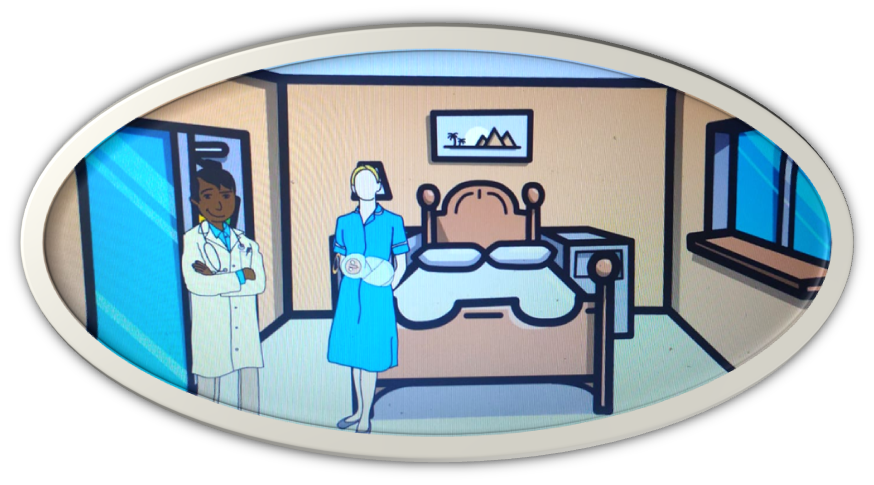
Just as it was a miracle, the little chest which was enclosed in Andrew’s hands, took a breath. He continued heaving, leaving Andrew weak in his knees. The feeling of the little one’s breathing on his fingers almost made him faint. Instantly, he worked on reviving him with double the efforts until the child breathed deeply. As he gasped, a bubble formed by the mucus was formed from his tiny nose, his pale skin turned pink and his body no longer felt like it was lifeless. The next instant, he started crying.“Dear Father in heaven,” the nurse sobbed hysterically. “It’s come —it’s come alive.” Andrew handed her the child. He felt weak and dazed. About him, the room lay in a shuddering litter: blankets, towels, basins, soiled instruments, the hypodermic syringe impaled by its point in the linoleum, the ewer knocked over, and the kettle on its side in a puddle of water. Upon the huddled bed, the mother still dreamed her way quietly through the anesthetic. The old woman still stood against the wall. But her hands were together, her lips moved without sound. She was praying.
The nurse muttered the words of prayer while tears rolled down her eyes. As Andrew handed her the child, he felt extremely weak and tired. The room was obviously a mess by this time. All the equipment, including blankets, towels, basins, soiled instruments, the hypodermic syringe, the ewer and the kettle were all in a terrible state. The mother lay still on the bed, the anesthesia still had its effect. Susan’s mother stood still in one place, constantly moving her lips in prayer.
Mechanically Andrew wrung out his sleeve, pulled on his jacket. “I’ll fetch my bag later, nurse.” He went downstairs, through the kitchen into the scullery. His lips were dry. At the scullery, he took a long drink of water. He reached for his hat and coat. Outside he found Joe standing on the pavement with a tense, expectant face. “All right, Joe,” he said thickly. “Both all right.” It was quite light. Nearly five o’clock. A few miners were already in the streets: the first of the night shift moving out. As Andrew walked with them, spent and slow, his footfalls echoing with the others under the morning sky, he kept thinking blindly, oblivious to all other work he had done in Blaenelly, “I’ve done something; oh, God! I’ve done something real at last.
Word meaning -
Scullery- a small kitchen or room at the back of a house used for washing dishes and other dirty household work
Andrew unfolded his sleeve and put on his jacket while informing the nurse that he will take his bag later. He then went into a small room through the kitchen downstairs and grabbed a large glass of water. He took his coat and hat and headed outside. He met Joe outside and told him that everything was fine. It was around five in the morning and there was not too much light. While walking towards his home, he was accompanied by a few miners who had just completed their night shift. As their footsteps echoed, he had only one thing in mind. His heart was full of the thought that he finally accomplished something.
The Tale of Melon City poem explanation
- Books Name
- (English) Hornbill & Snapshot Class-11
- Publication
- PathSet Publications
- Course
- CBSE Class 11
- Subject
- English
The Tale of Melon City
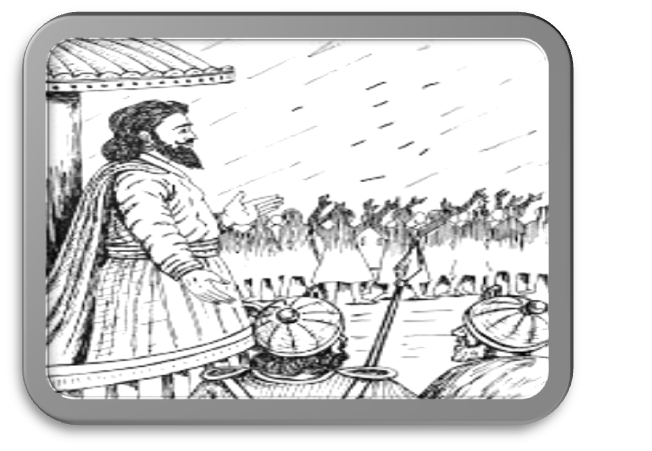
(Vikram Seth)
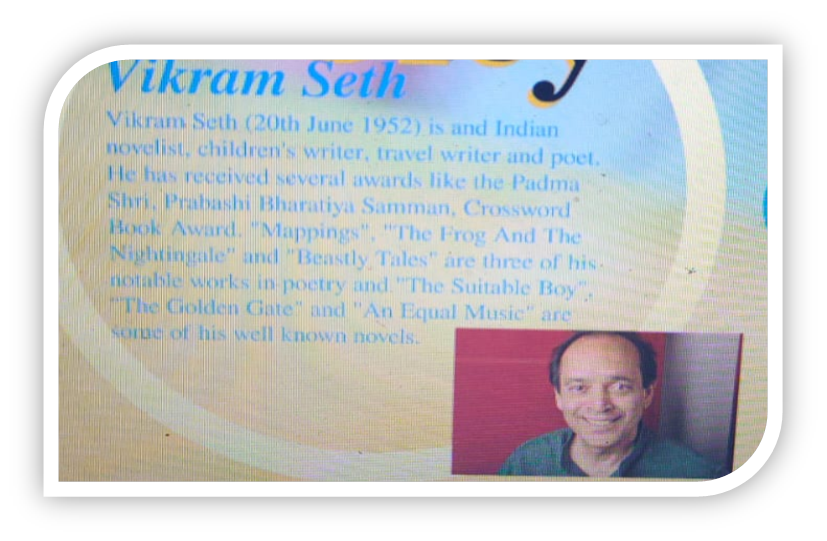
Introduction
It is a humorous poem which shows how stupid the king, the ministers and the people of a certain kingdom were, it was , in fact a kingdom of tools, the king got an arch constructed across the major roads of his kingdom, when he went riding through it has crown was knocked down, the king at once ordered the chief of the builders to be hanged, but the chief put blame on the workmen , the king ordered the workmen to be hanged, but the workmen put the blame on the masons, and the masons put the blame on the architect, but the architect, said that the king himself had made some changes in the original plan of the, arch, now the king got confused , he called the wisest man of the kingdom and asked for his suggestion, that old man said that it was the arch that had banged off, the crown thus the real culprit was the arch and it ought to be hanged but then a councillor said that it would be a shame to hang the arch that had touched the king’s head the king saw that the people, had become restless, they had all gathered there to see that , hanging , so the king said that someone had to be hanged, the noose, was set up but it was somewhat , high, each man was measured by and by, but only the king was tall enough to fit the noose, therefore, it was the king that was hanged, at last, the ministers now declared that anyone who passed the city gate next, would choose the ruler of the asked, state It, happened to be an idiot, when he was asked who was to be people did not bother much about who or what their king was, they only wanted that they should be left to do whatever they desired.
Summary
The poem begins with a description of the King who ordered an arch to be built. When he rode down that arch, it hit his head and his crown fell down. It was because it was built too low. The King thought it was dishonorable and thus commanded the chief of builders to be hanged. The chief of builders put the blame on the workmen who in turn, blamed the bricks. The King orders the execution of the mason who put the blame on the architect. The architect is brought to the Royal Court and indirectly blames the King for the wrongly constructed arch. The placid King now grows angry and demands the wisest man in the country to be brought to the Royal Court. They brought the wisest man, who was so old that he could neither see nor walk. According to him, the arch must be hanged. When the arch is supposed to be executed, one of the ministers argues that it would be a shame to punish something that had touched their mighty King’s head. Everyone, along with the King, agreed. The crowd grew restless and the King promised them a hanging. Therefore, a noose was set up and the one to fit it would be hanged. All were measured one by one but the only one to fit was the King. The ministers heaved a sigh of relief upon finding someone to execute. Thus, as a result of the customer's choice, the next to pass the City gate would choose the new King and the next to pass it was an idiot who wanted a melon to be their King. The melon was given the throne with due ceremony and the town lived happily ever after without any interruption or interference.
Explanation
The following poem is taken from Mappings which was published in 1981 and is included in the Collected Poems by Vikram Seth.

In the city in which I sing
There was a just and placid King.
The King proclaimed an arch should be
Constructed, that triumphally
Would span the major thoroughfare
To edify spectators there.
Word meaning -
Just- based on or behaving according to what is morally right and fair
Placid- calm
Proclaimed- announce officially or publicly.
Arch- a curved symmetrical structure spanning an opening and typically supporting the weight of a bridge, roof, or wall above it.
Triumphally- Celebrating or commemorating a victory
Span- Celebrating or commemorating a victory
Thoroughfare- the main road in a town
Edify- instruct or improve (someone) morally or intellectually
Spectators- onlookers
The city which the poet is talking about was ruled by a ‘just and placid’ King. He is known to be fair and calm in his proceedings. One day, he ordered for an arch to be built on the main road of the town. He felt that it would be a good sight to look at that would motivate the onlookers.
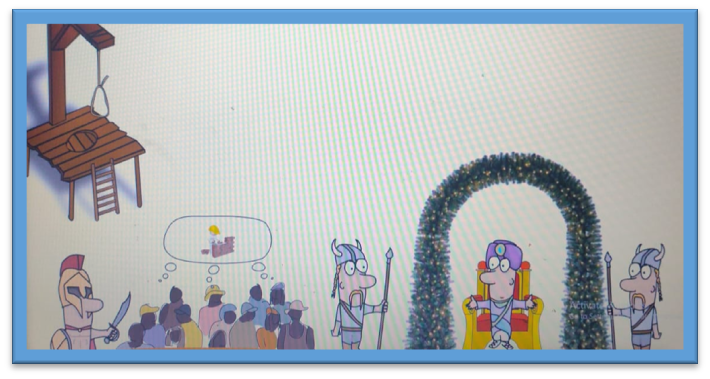
The workmen went and built the thing.
They did so since he was the King.
The King rode down the thoroughfare
To edify spectators there.
Under the arch, he lost his crown.
The arch was built too low. A frown
Appeared upon his placid face.
The King said, ‘This is a disgrace.
The chief of builders will be hanged.’
The rope and gallows were arranged.
Word meaning -
Frown- a facial expression indicating disapproval, displeasure, or concentration, characterized by a furrowing of one’s brows.
Gallows- a structure, typically of two uprights and a crosspiece, for the hanging of criminals
Since it was the King who ordered it to be built, the workmen followed his orders and constructed the arch. To mark its inauguration and indulge the onlookers, the King went to the thoroughfare. There, the arch hit his head and his crown fell down. It happened because the arch was formed too low. His calm expressions were instantly changed, indicating extreme displeasure. He considered it a moment of dishonor and ordered for the chief of builders to be executed by hanging. To fulfill King’s orders, ropes and gallows were put in order.
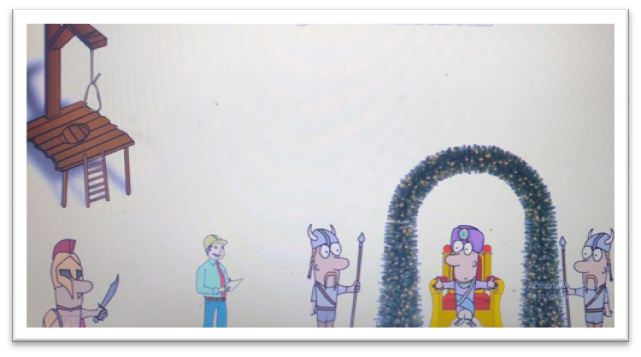
The chief of builders was led out.
He passed the King. He gave a shout,
‘O King, it was the workmen’s fault’
‘Oh!’ said the King, and called a halt
To the proceedings. Being just
(And placider now) he said, ‘I must
Have all the workmen hanged instead.’
The workmen looked surprised, and said,
‘O King, you do not realize
The bricks were made of the wrong size.’
Word meaning -
Halt- bring or come to an abrupt stop
The chief of builders was found and brought to be executed. He was being taken to the King. On seeing the King, the chief of builders immediately shouted and exclaimed that it was the workmen who were at fault. The King immediately called it off and declared that the workmen must be hanged. This hit the workmen with surprise. They pointed out that it was not their fault but the bricks were not of the right size.
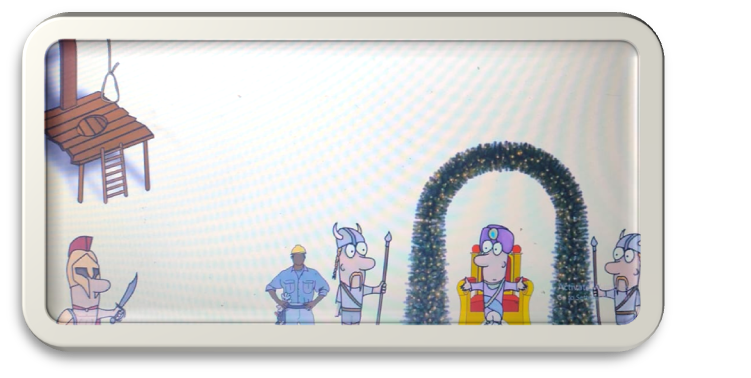
‘Summon the masons!’ said the King.
The masons stood there quivering.
‘It was the architect…’, they said,
The architect was summoned.
Word meaning -
Summon- order someone to be present
Masons- a person skilled in cutting, dressing, and laying a stone in buildings
Quivering- trembling or shaking with a slight rapid motion
Architect- a person who designs buildings and in many cases also supervises their construction
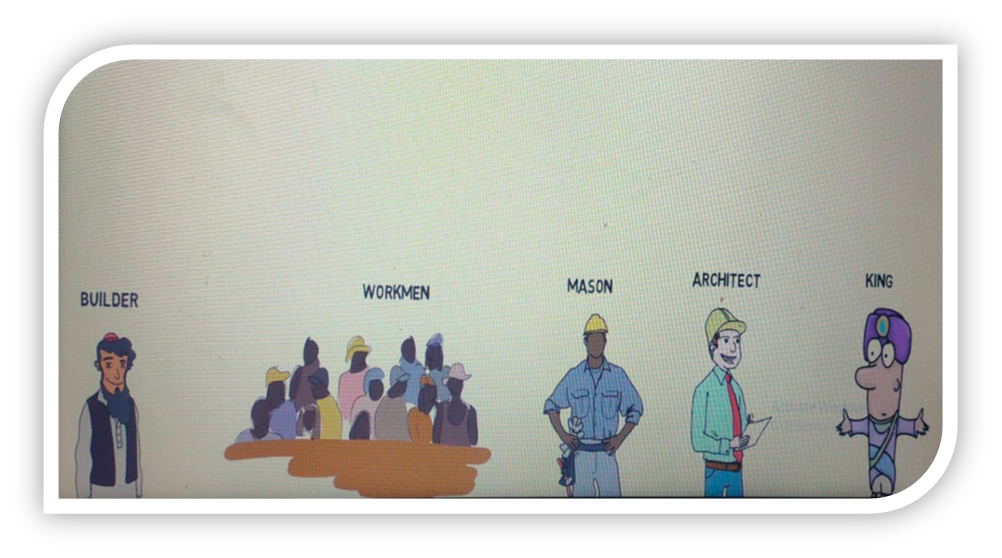
On hearing that it was the bricks that were of the wrong signs, the King called for the masons. The masons were trembling in front of the King. They put the blame on the architect and thus, the architect was called for.
‘Well, architect,’ said His Majesty.
‘I do ordain that you shall be
Hanged.’ Said the architect, ‘O King,
You have forgotten one small thing.
You made certain amendments to
The plans when I showed them to you.’
The King heard this. The King saw red.
In fact, he nearly lost his head;
But being a just and placid King
He said, ‘This is a tricky thing.
I need some counsel. Bring to me
The wisest man in this country.’
Word meaning -
Ordain- order (something) officially
Amendments- a minor change or addition designed to improve something
Saw red- became angry
Counsel- advice, especially that given formally
The King tells the architect that he considers him the one at fault and he must be executed. Instantly, the architect mentions that it was the King who made minute changes to the architect’s initial plan. This indirectly indicated that it was the King who was responsible for the wrongly built arch. The King grew angry but since he was ‘just and placid’, he thought it would be best to consult someone in such a confusing situation. Thus, he ordered them to get the wisest person alive.
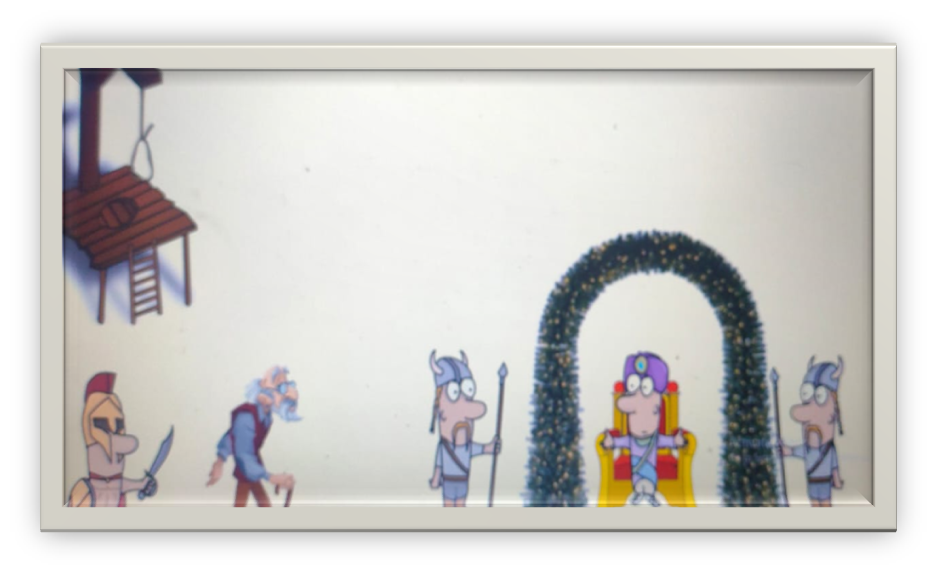
The wisest man was found and brought,
Nay, carried, to the Royal Court.
He could not walk and could not see,
So old (and therefore wise) was he —
But in a quavering voice, he said,
‘The culprit must be punished.
Truly, the arch was that banged
The crown off, and it must be hanged’.
Word meaning -
Quavering- (of a person’s voice) shake or tremble in speaking, typically through nervousness or emotion.
They found the wisest man but he had to be carried to the Royal court for he was so old that he could neither walk nor see properly. With his age, came his wisdom. He finally spoke in his extremely shaky voice that the one at fault must be executed and it is the arch that struck off the King’s crown. Thus, the arch must be hanged.
To the scaffold, the arch was led
When suddenly a Councillor said —
‘How can we hang so shamefully
What touched your head, Your Majesty?’
‘True,’ mused the King. By now the crowd,
Restless, was muttering aloud.
The King perceived their mood and trembled
And said to all who were assembled —
‘Let us postpone consideration
Of finer points like guilt. The nation
Wants a hanging. Hanged must be
Someone, and that immediately.’
Word meaning -
Scaffold- a raised wooden platform used formerly for the public execution of criminals.
Mused- say to oneself in a thoughtful manner
After listening to the wise man’s opinion, the arch was being taken for public execution when suddenly one of the ministers of the Royal Court raised an objection. According to him, it would be disgraceful to hang something that touched the head of their mighty King. The King also found it appropriate. By this time, the crowd became unsettled. They wanted the execution of the one at fault. The King, being ‘just and placid’, recognized the temper of his people and declared that they must postpone something as crucial as determining the guilty. He further added, that if the nation wants a hanging, the guilty, once decided, would be hanged without further delay.
The noose was set up somewhat high.
Each man was measured by and by.
But only one man was so tall
He fitted. One man. That was all.
He was the King. His Majesty
Was therefore hanged by Royal Decree.
Word meaning -
Noose- a loop with a running knot, tightening as the rope or wire is pulled and used to trap animals or hang people
Decree- an official order that has the force of law
To ascertain the one to be executed, they set up a noose and the one to fit in it would be hanged. Each man was called and measured one by one. The noose was set up at quite a high point and the only man tall enough to fit in the noose was the one and only; the King. Finally, they had found someone to be executed and their King was hanged by the official force of law.
‘Thank Goodness we found someone,’ said
The Ministers, ‘for if instead
We had not, the unruly town
Might well have turned against the Crown.’
‘Long live the King!’ the Ministers said.
‘Long live the King! The King is dead.’
Word meaning -
Unruly- disorderly and disruptive and not amenable to discipline or control
Against the Crown- questioning the power, integrity and honesty of the state
The Ministers of the Royal Court heaved a sigh of relief as they found someone to be put to death for the faulty arch. They feared that if they would have not found someone, the disorderly crowd would begin questioning the power and integrity of the power vested in the Crown. “Long live the King”, everyone said. It brings out the irony because the King they were hailing for, was no longer alive. They wanted their King to live a long life but on the other hand, they were relieved to have found someone to execute even if it was their King.
They pondered the dilemma; then,
Being practical-minded men,
Sent out the heralds to proclaim
(In His [former] Majesty’s name):
‘The next to pass the City Gate
Will choose the ruler of our state,
As is our custom. This will
be Enforced with due ceremony.’
Word meaning -
Pondered- think about (something) carefully, especially before making a decision or reaching a conclusion
Heralds- an official employed to oversee state ceremonial, precedence, and the use of armorial bearings, and (historically) to make proclamations, carry official messages, and oversee tournaments
Proclaim- announce officially or publicly
At first, the ministers were indecisive as to how to choose their new King. But reasonable as they were, they sent out the official messengers to declare that their next ruler will be chosen by the one who passes the City Gate next. The one chosen by him will be declared ‘King’ with the due ceremony as was the custom.

A man passed by the City Gate.
An idiot. The guards cried, ‘Wait!
Who is to be the King? Decide!’
‘A melon,’ the idiot replied.
This was his standard answer to
All questions. (He liked melons.) ‘You
Are now our King,’ the Ministers said,
Crowning a melon. Then they led
(Carried) the Melon to the throne
And reverently set it down.
Word meaning -
Reverently- with deep and solemn respect
The next to pass the City Gate was a man, nay, an idiot. The guards stopped him and asked him to name their next King. An idiot as he was, he answered ‘a melon’. Not to call it his mistake or anyone else’s, this was his fixed reply to all the questions as the man was fond of melons. The ministers crowned a melon believing that it is now going to rule over their city. They set the melon on the throne and declared him ‘King’.
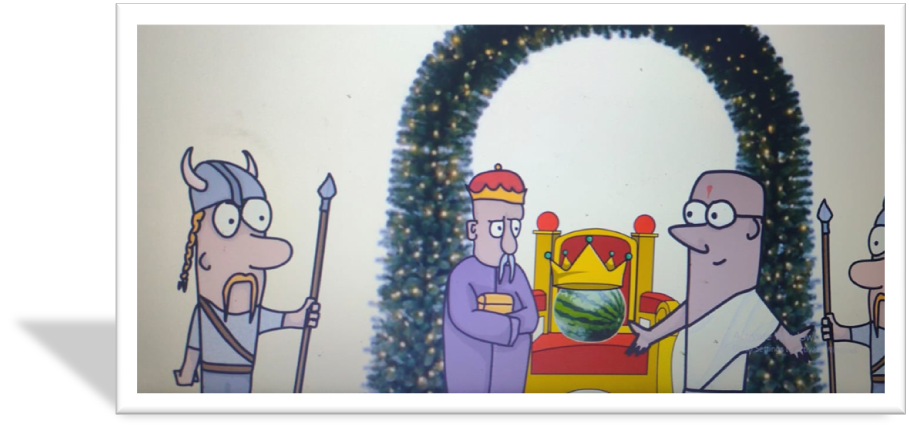
This happened years and years ago.
When now you ask the people, ‘So —
Your King appears to be a melon.
How did this happen?’, they say, ‘Well, on
Account of customary choice.
If His Majesty rejoice
In being a melon, that’s OK
With us, for who are we to say
What he should be as long as he
Leaves us in Peace and Liberty?’
The principles of laissez faire
Seem to be well-established there.
Word meaning -
Customary- according to the customs or usual practices associated with a particular society, place, or set of circumstances
Rejoice- feel or show great joy or delight
Laissez-faire- the policy of leaving things to take their own course, without interfering
Now, the melon was declared the King many years ago and now when anyone asks the people of the city about how it all happened, they simply call it a “customary choice”. It means that their regulations pushed them towards making a melon their King. But now, they are more than happy with their King being a melon because the people live in peace and enjoy freedom. They are flourishing with no interference from their King.

 ACERISE INDIA
ACERISE INDIA
 PathSet Publications
PathSet Publications
